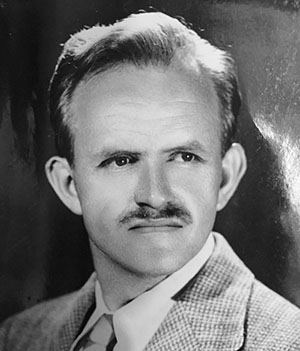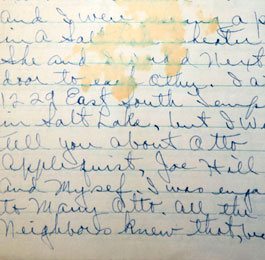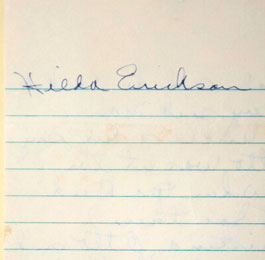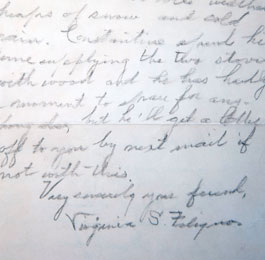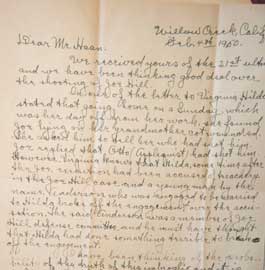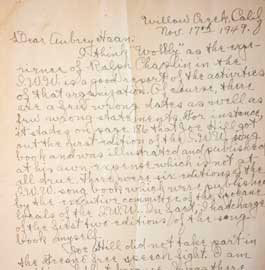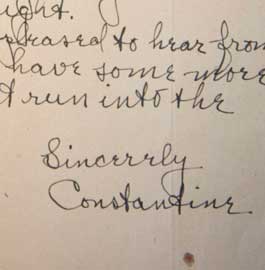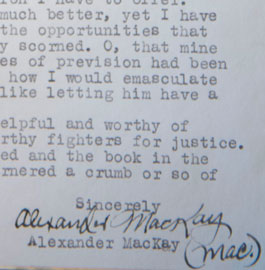Hilda Erickson
In this letter written by Hilda Erickson, she tells Aubrey Haan that, among other things, she was one of "many friends" standing outside the Utah State Prison when Joe Hill was executed on Nov. 19, 1915.
Dear Mr. Haan,
In regard to your letter of June 13th, it was a surprise to hear that Mrs. Stephens is still living. Will you please give me her address in Northern California?
Dear Mr. Haan, I do not believe that my Uncle John made such a statement as you speak of in your letter. I was one of the many friends outside of the prison wall when Joe Hill was executed. Also one of the six girl pallbearers. Some one may have called Mrs. Stephens by phone after the execution but it was not me. Mr. Haan if you had ever met Joe Hill and heard him play the violin or the piano , you would know that he was not guilty. Wishing you much success with your novel and thanking you for Mrs. Stephens address.
Very truly yours,
Mrs. Hilda Erickson
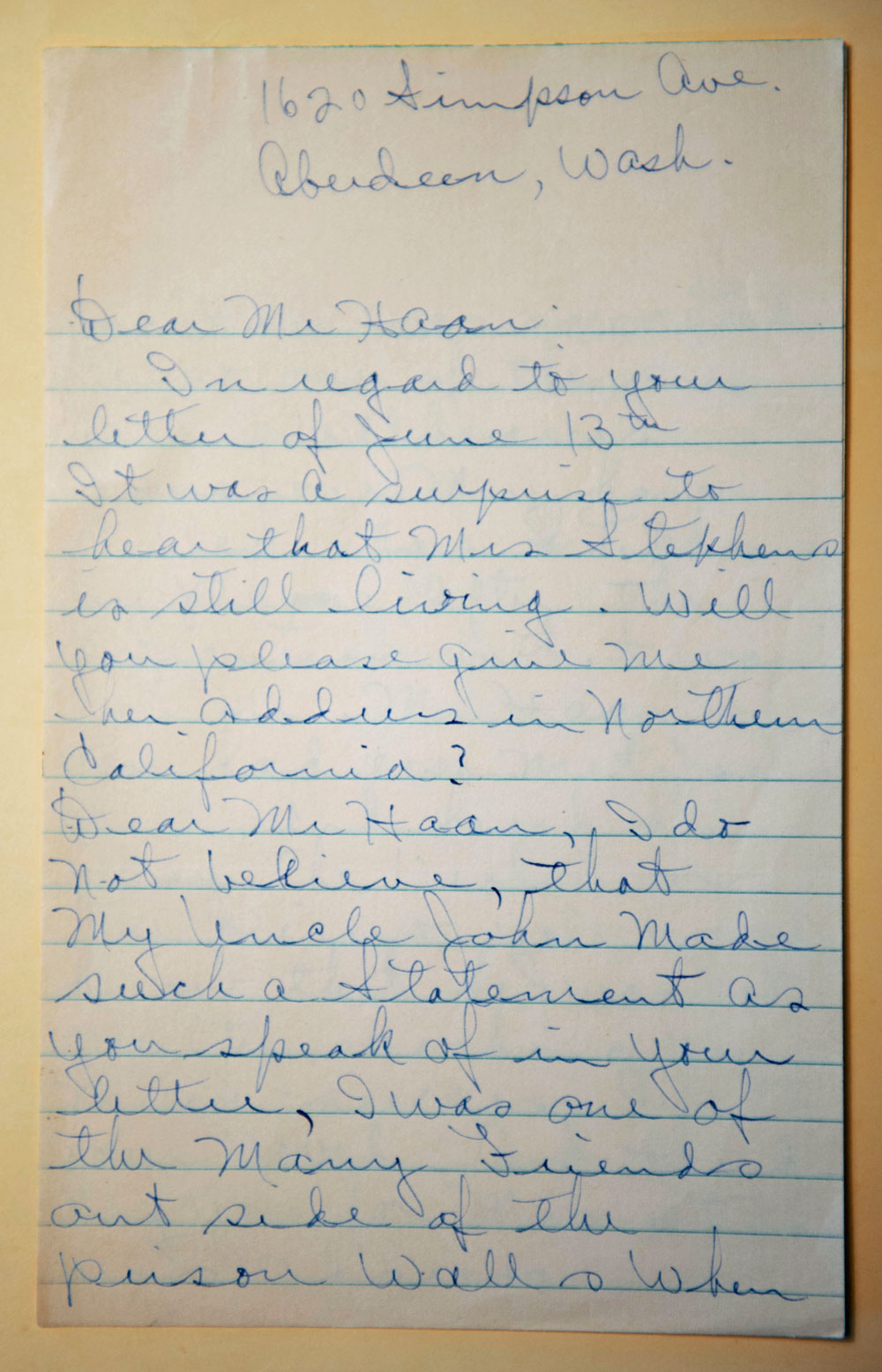
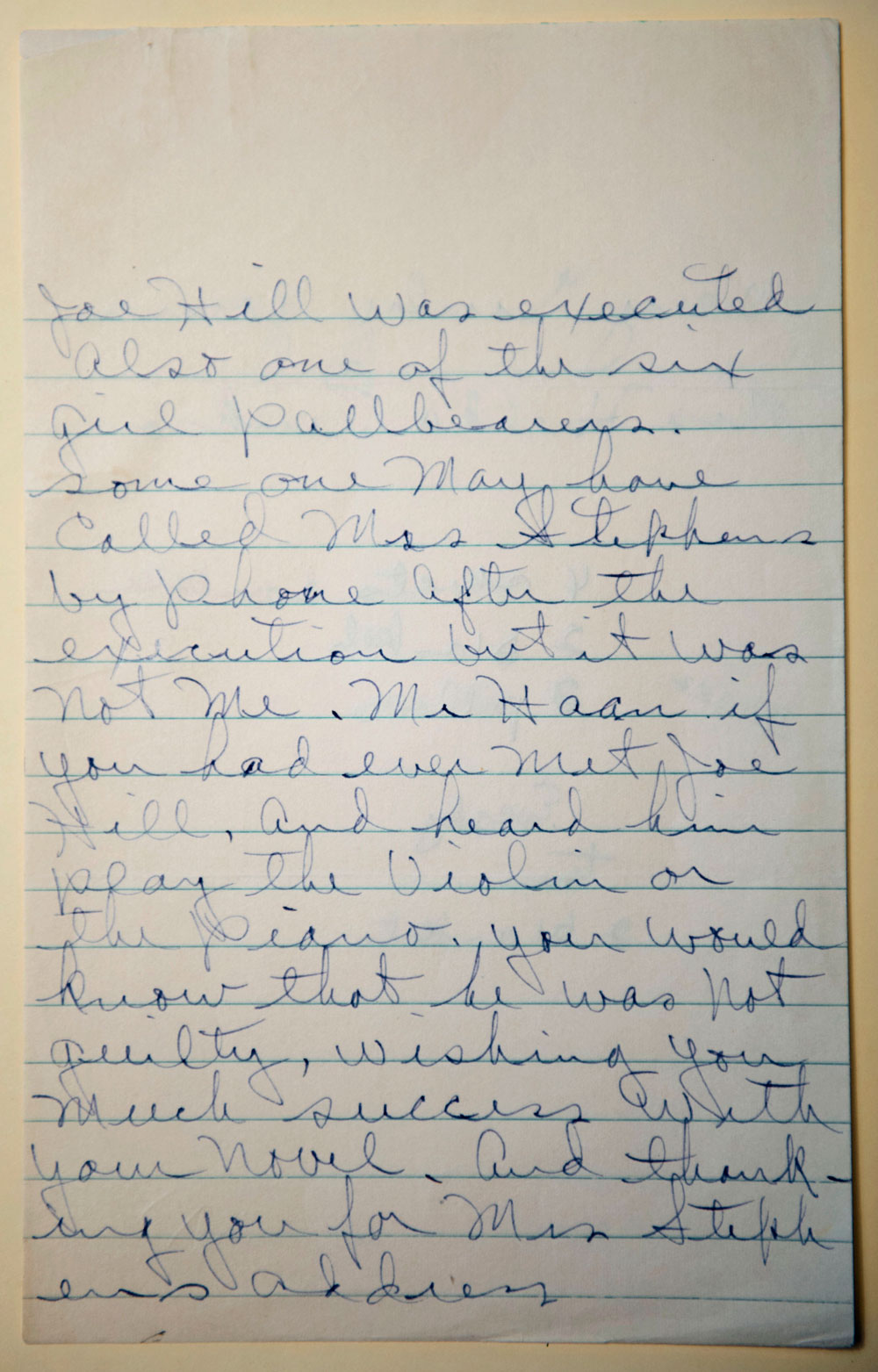
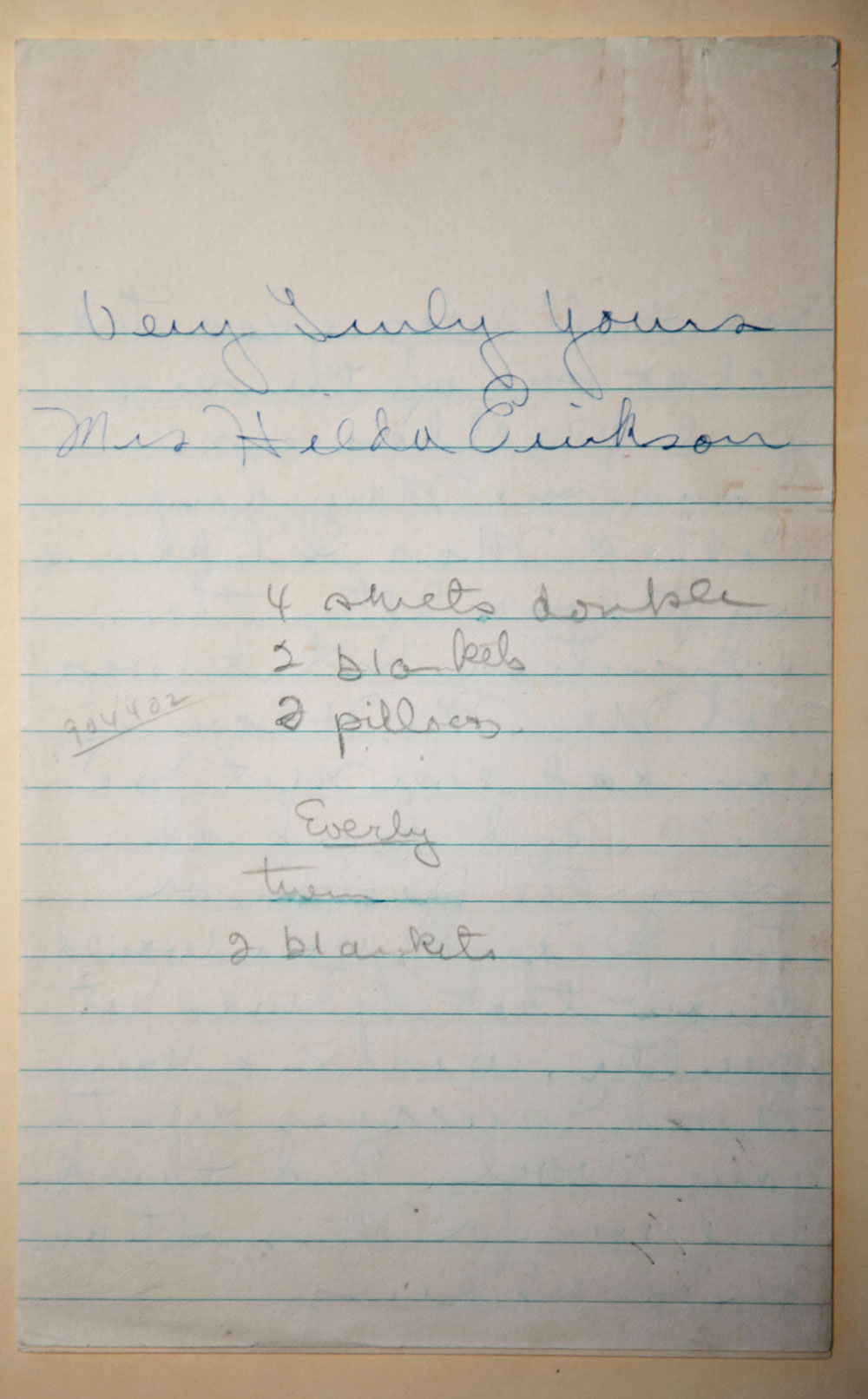
Photo by Jeremy Harmon, The Salt Lake Tribune
Hilda Erickson
This letter was written by Hilda Erickson on June 22, 1949. In it, she describes getting Joe Hill to tell her that he had been shot by Otto Appelquist. Erickson also discusses breaking off her engagement with Appelquist about a week before Hill was shot.
Aberdeen, Wash.
June 22nd 1949
Dear Mr. Haan:
Thank you for Mrs. Stephens Filigno’s address. I do not know anything about the Morrison case because that evening Miss Christine Larson and I were seeing a play in a Salt Lake theater. She and I lived next door to each other, I at 1229 East South Temple in Salt Lake, but I will tell you about Otto Applequist, Joe Hill and myself.
I was engaged to marry Otto. All the neighbors knew that, because my little brother August had told them that. A week before Joe was wounded I told Otto that I had changed my mind that I was not marrying any body. He got very angry and told me “I liked Joe better than him.” I said no. I heard Joe tease Otto once that he was going to take me away from him.
Please do not misunderstand me. Otto and Joe were perfect gentlemen. They treated me with the utmost respect because they thought so much of our whole family. Joe was wounded on the same night as the Morrison case. I came home from Salt Lake the following Sunday afternoon. I saw Joe in my grandmother’s parlor. He was lying on her old fashioned iron cot that folds up at each side for a bed. I asked him what was the matter. He said “nothing much.” But I was not satisfied with the answer, so he finally told me that Otto shot him in a fit of anger. He was sorry right after and carried him to Dr. McHugh’s office at old 14th South and State Street.
When I heard this about Otto I was very angry myself, than I knew that Otto went away because Joe may die. But when I heard about the Morrison case, I was burdened and did not know what to think. I saw Joe every Sunday afternoon in the Salt Lake jail. I would speak English to him, but he would talk Swedish to me in a low voice and tell me not to say a word because he was innocent of the Morrison case, therefore the State of Utah could not prove him guilty. I have had two letters from Herbert Wright in Murray, Utah, he says that Sven Erickson made the same statement to him that he did to you. My uncle could not have made such a statement because he knew that Joe was innocent of the Morrison case.
Dear Mr. Haan I hope that my letter will help you with your novel.
Yours for the O.B.U.
Mrs. Hilda Erickson
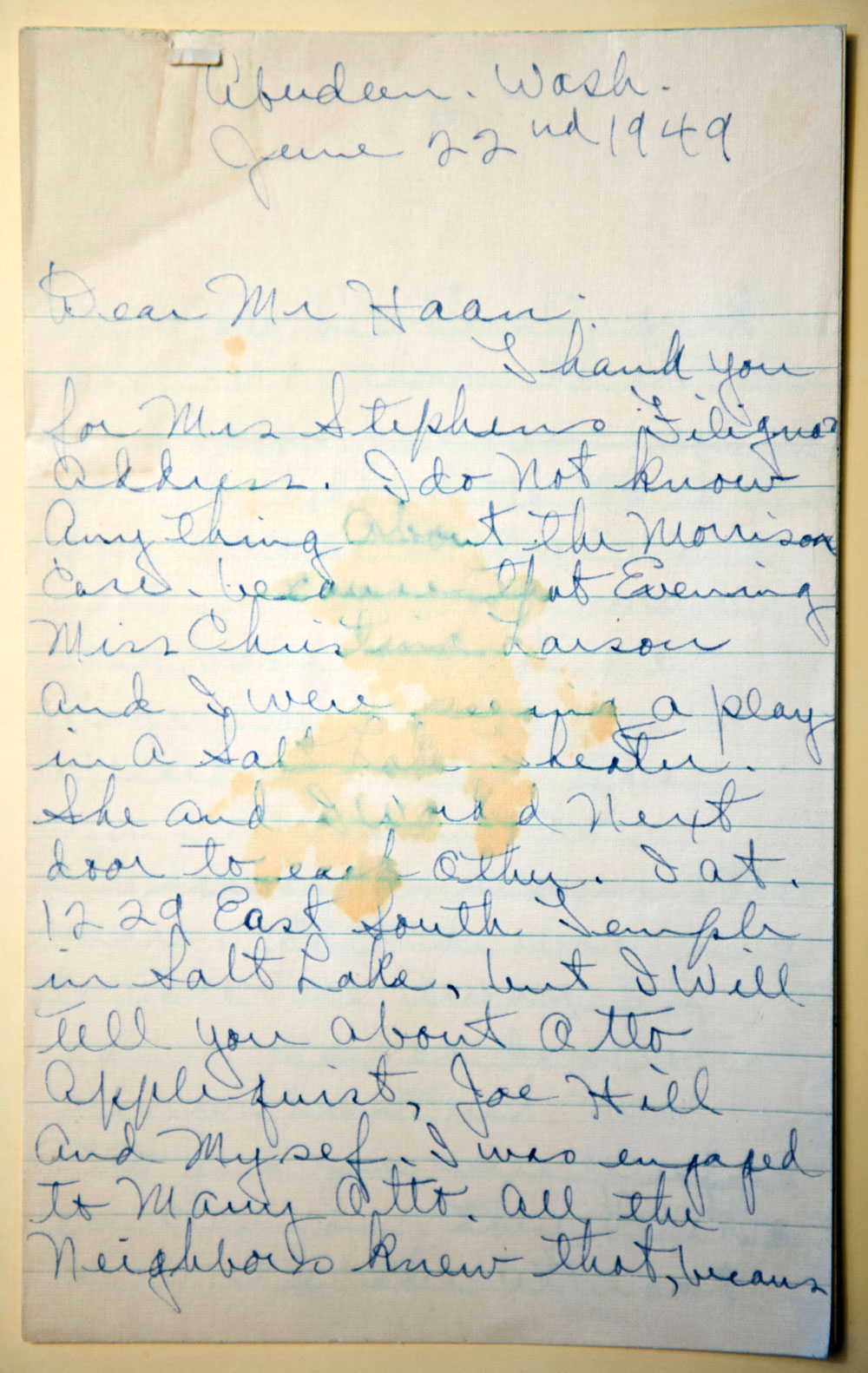
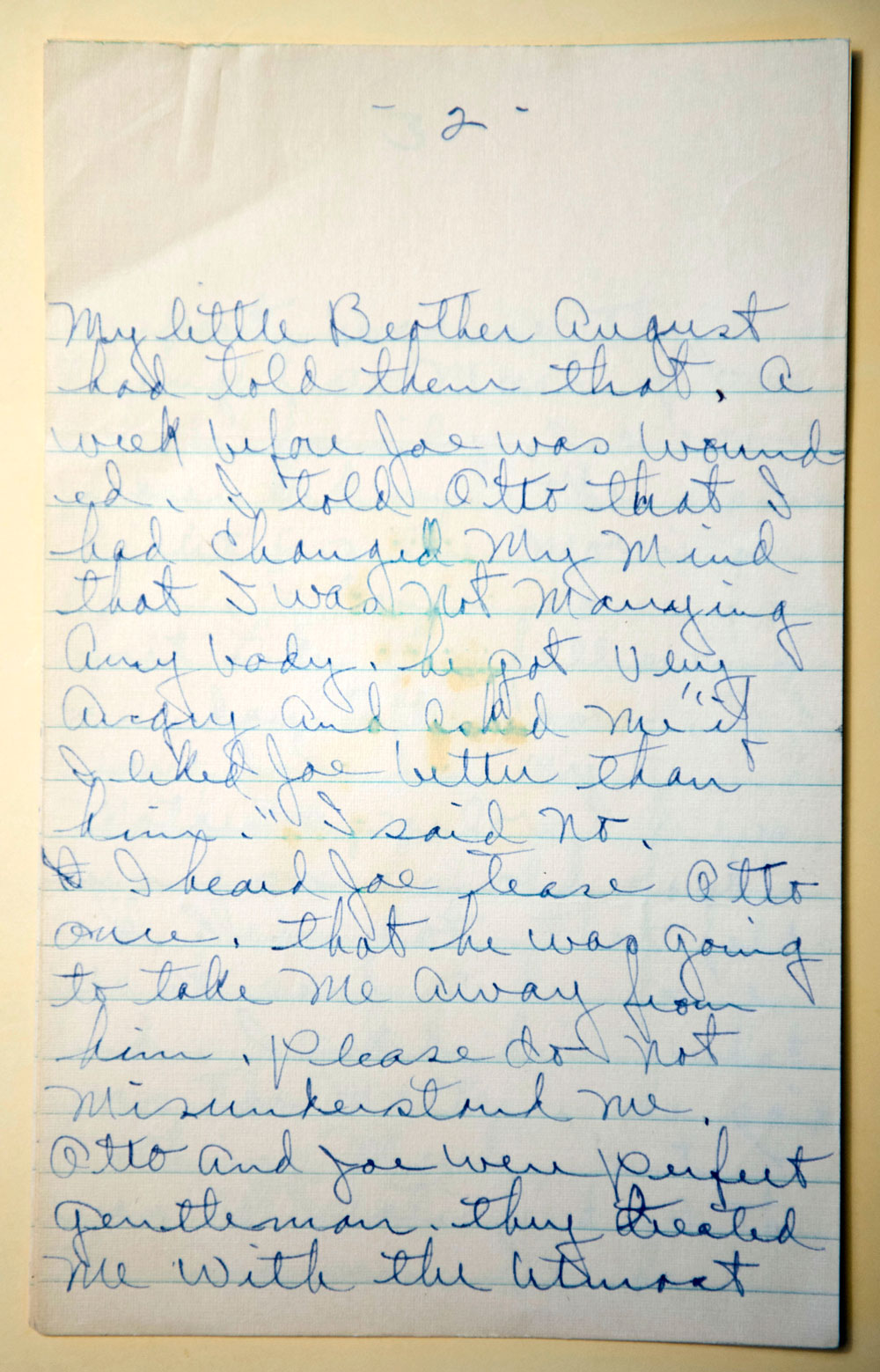
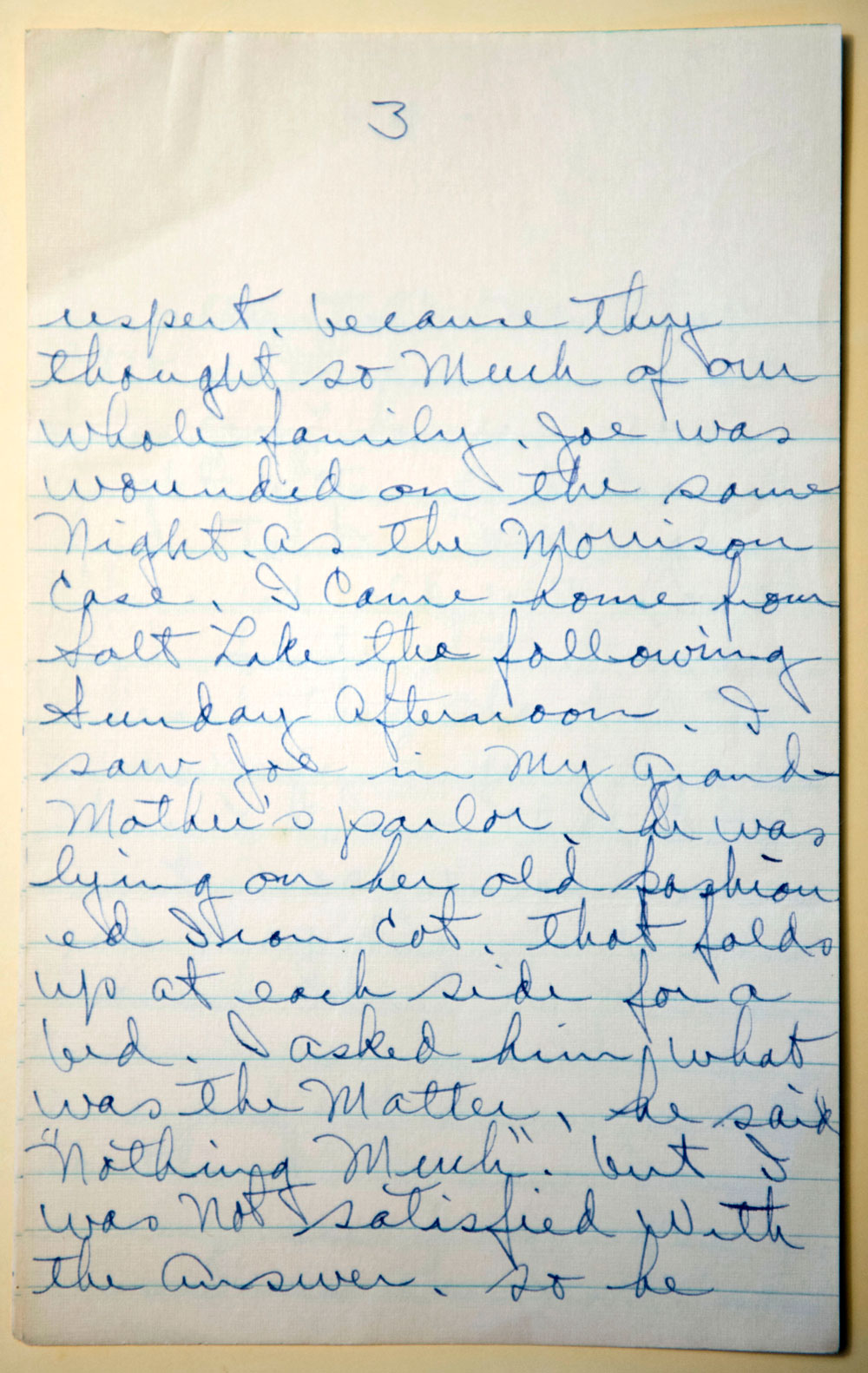
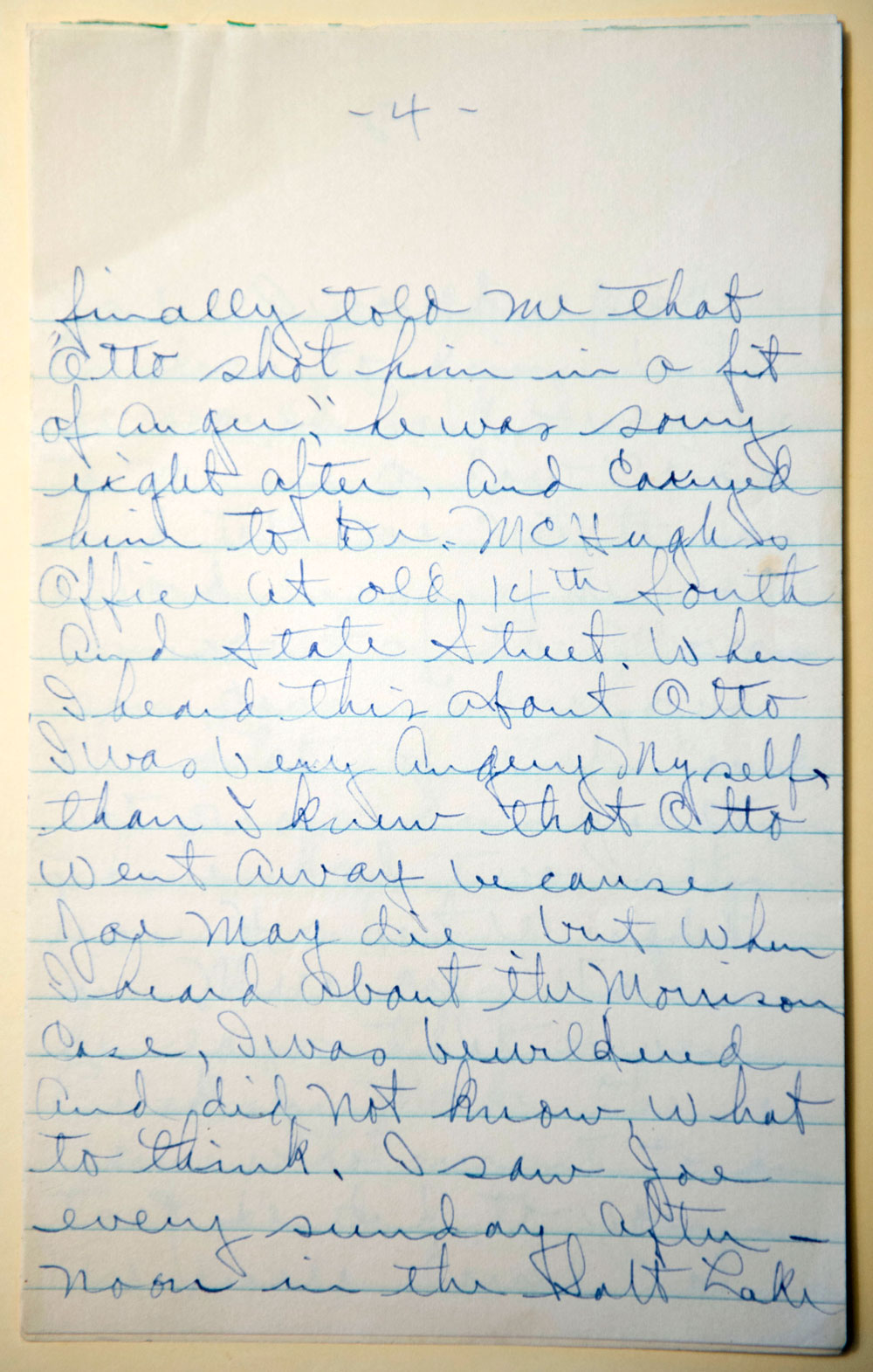
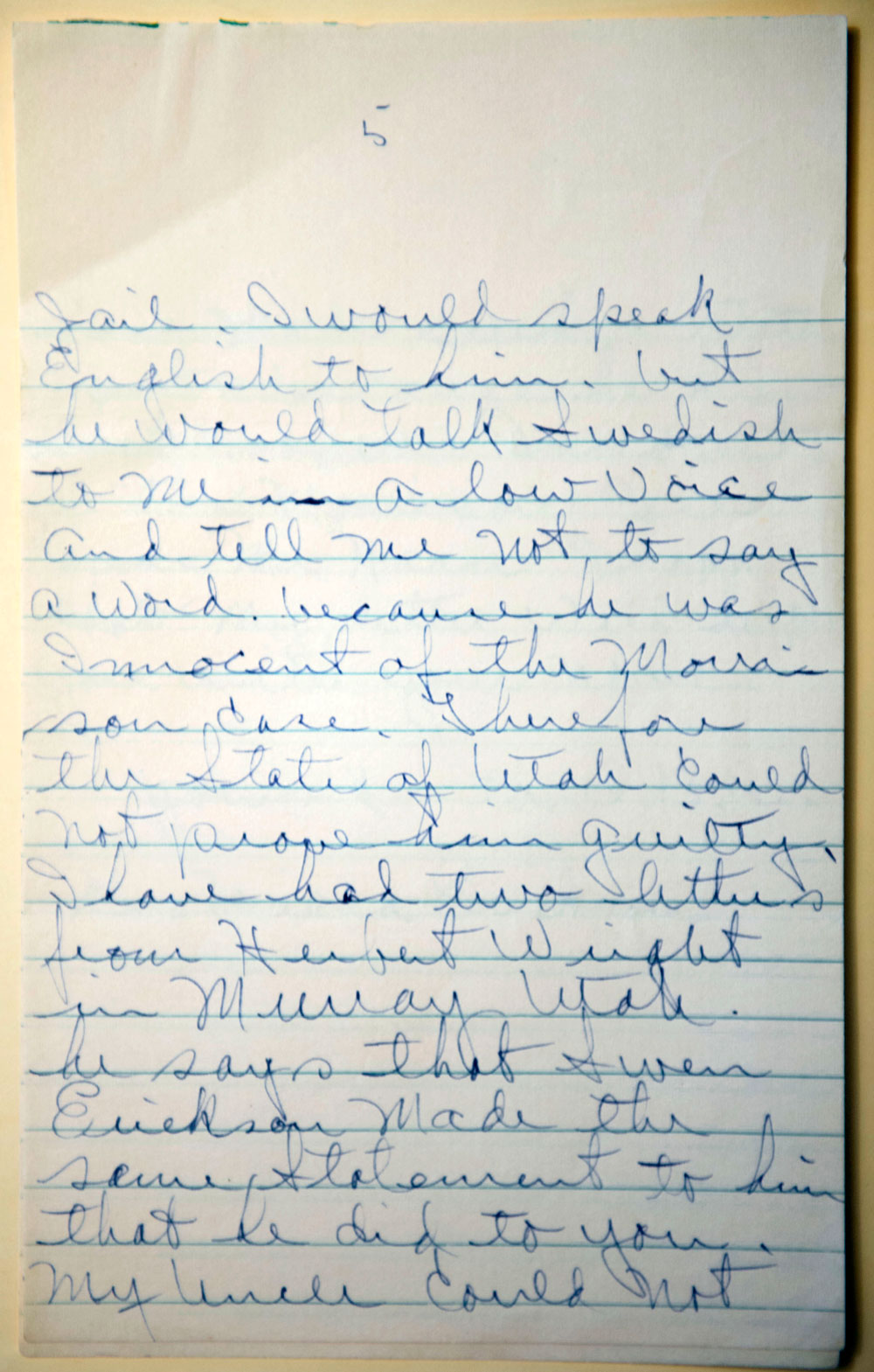
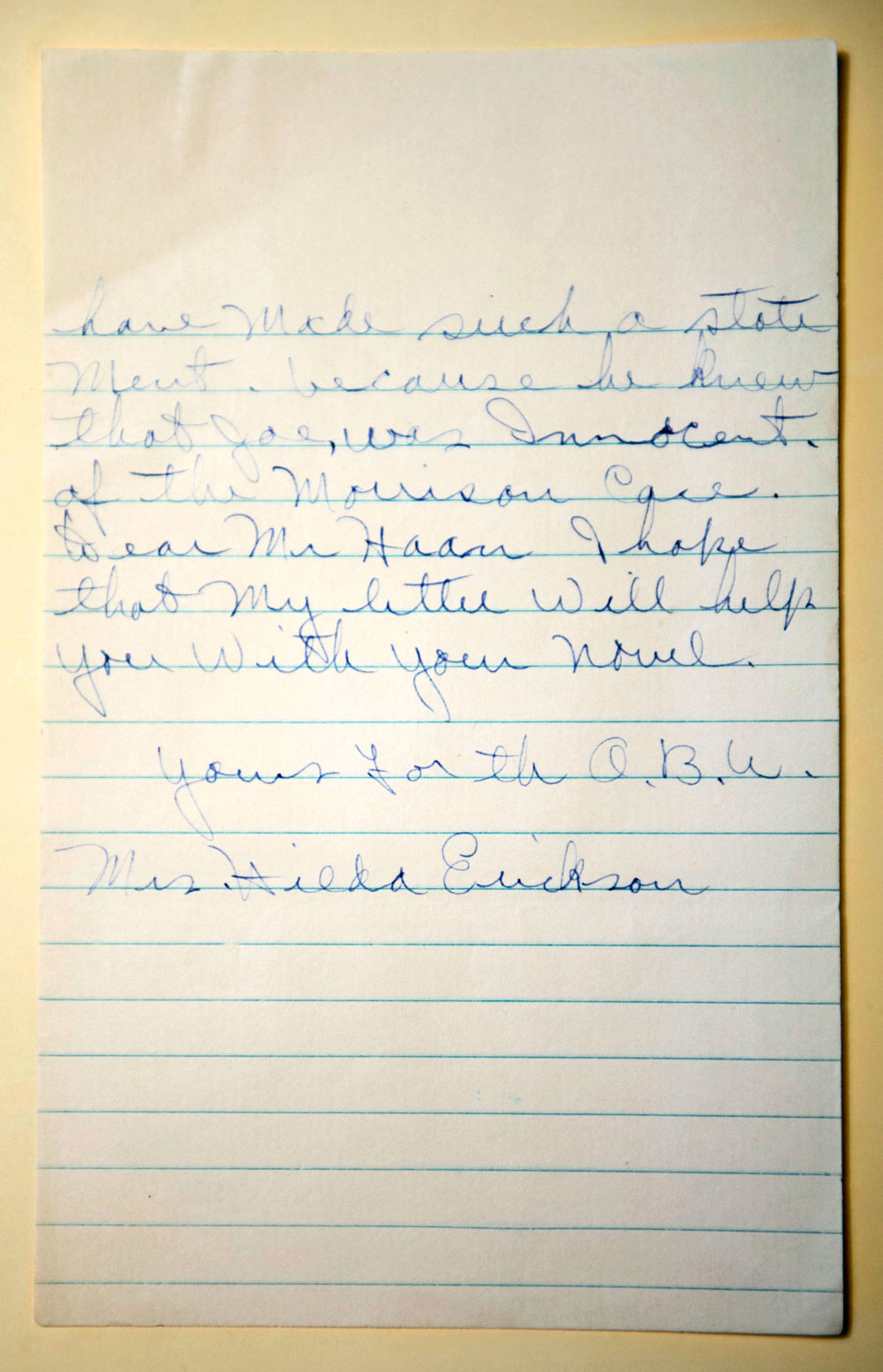
Photo by Jeremy Harmon, The Salt Lake Tribune
Hilda Erickson
Erickson tells researcher Aubrey Haan that she assumes the reason Otto Appelquist never came back to clear Joe Hill of killing John Morrison is that he must have died. She also said that Hill insisted that she not talk to authorities.
Aberdeen, Wash.
June 30th 1949
Dear Mr. Haan
I am sorry to hear that Mrs. Filigno’s health is not good. I will write to her soon. Yes, I have wondered many times myself why Otto did not come back. The only thing that I can think of is that he must have died because I have never heard one word from him. Joe said that he was innocent of the Morrison case and I believed him and I believe it yet. While I was seeing Joe in jail, he did insist not to talk. When they took him to the penitentiary they would not let me see him but we would write to each other once a week, his letters were cheerful. The reason I say that Uncle John knew that Joe was innocent is that he knew what Joe told me. I know that I can not prove what I say. I do not know why Sven Erickson made such a statement. I saw him at Uncle John’s funeral and he looked like a very sick man. Yes, my uncle’s did say that Otto was at the house when Dr. Bird brought Joe there. Yes, Christina, Otto and I did go to the Empress. We found Joe in a back seat when we were going out of the show.
Mr. Haan why don’t you come to Aberdeen for a visit. I will be happy to answer questions. Herbert Wright thinks that you are Otto Applequist.
Yours for the O.B.U.
Hilda Erickson
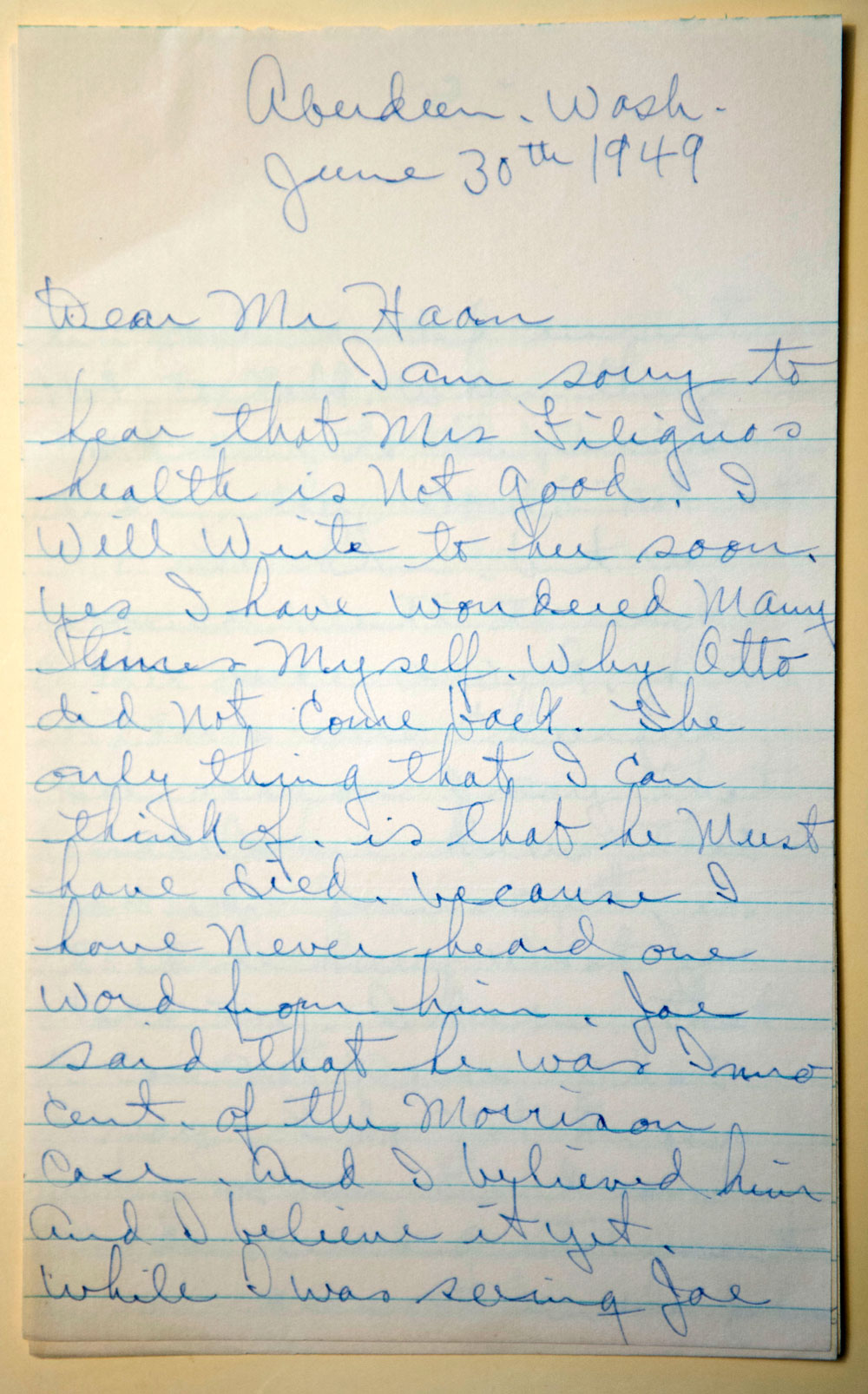
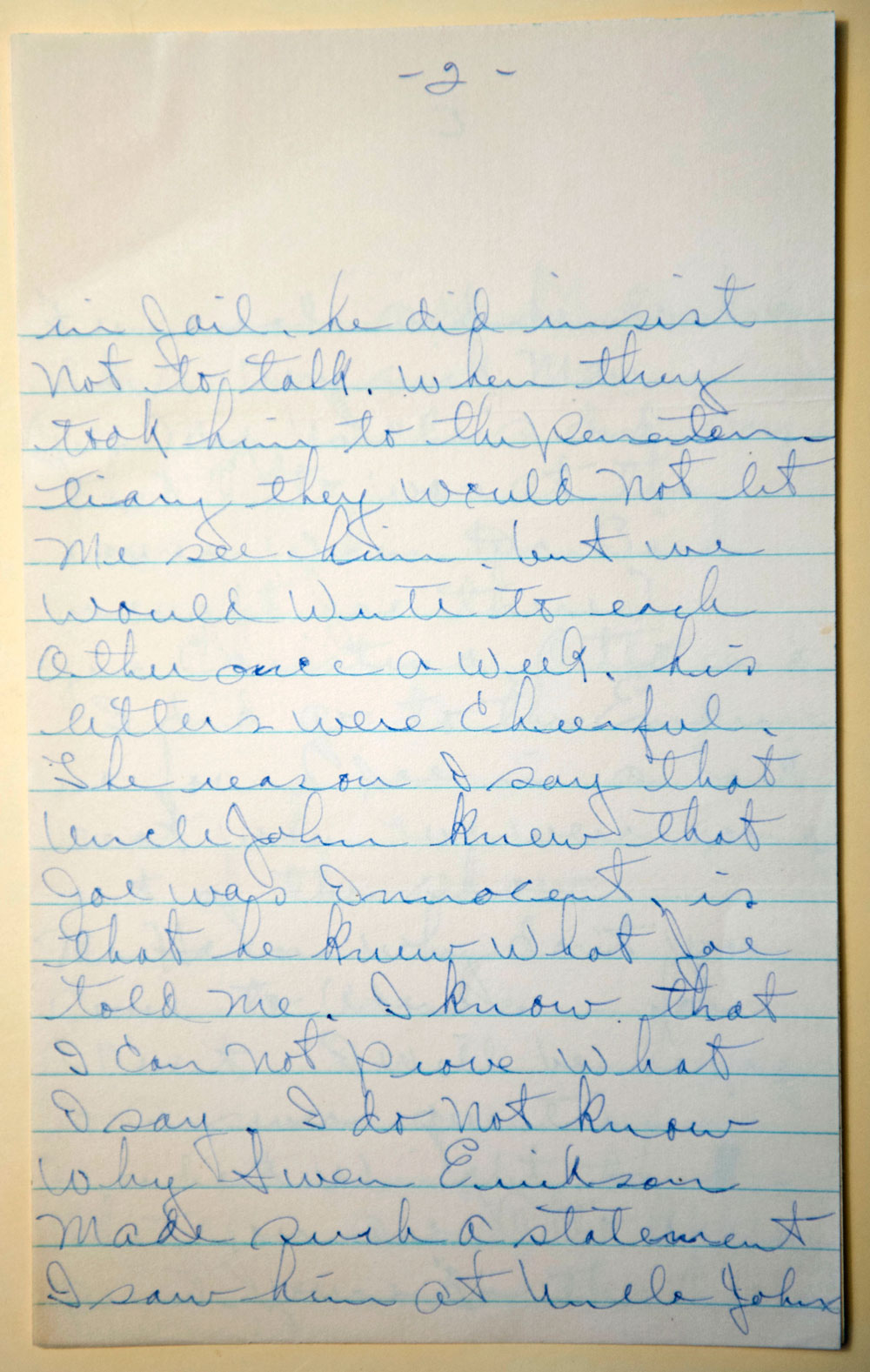
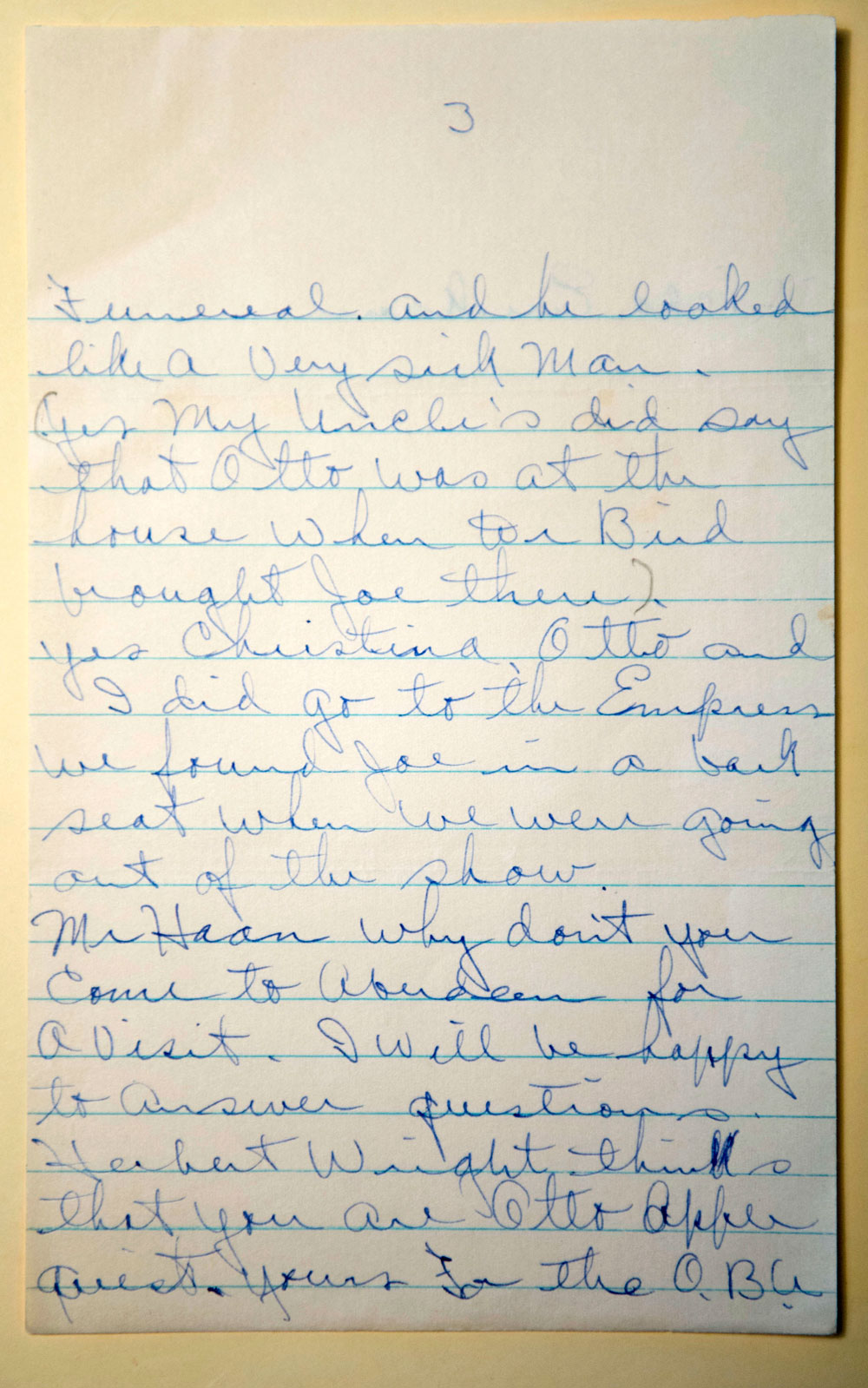
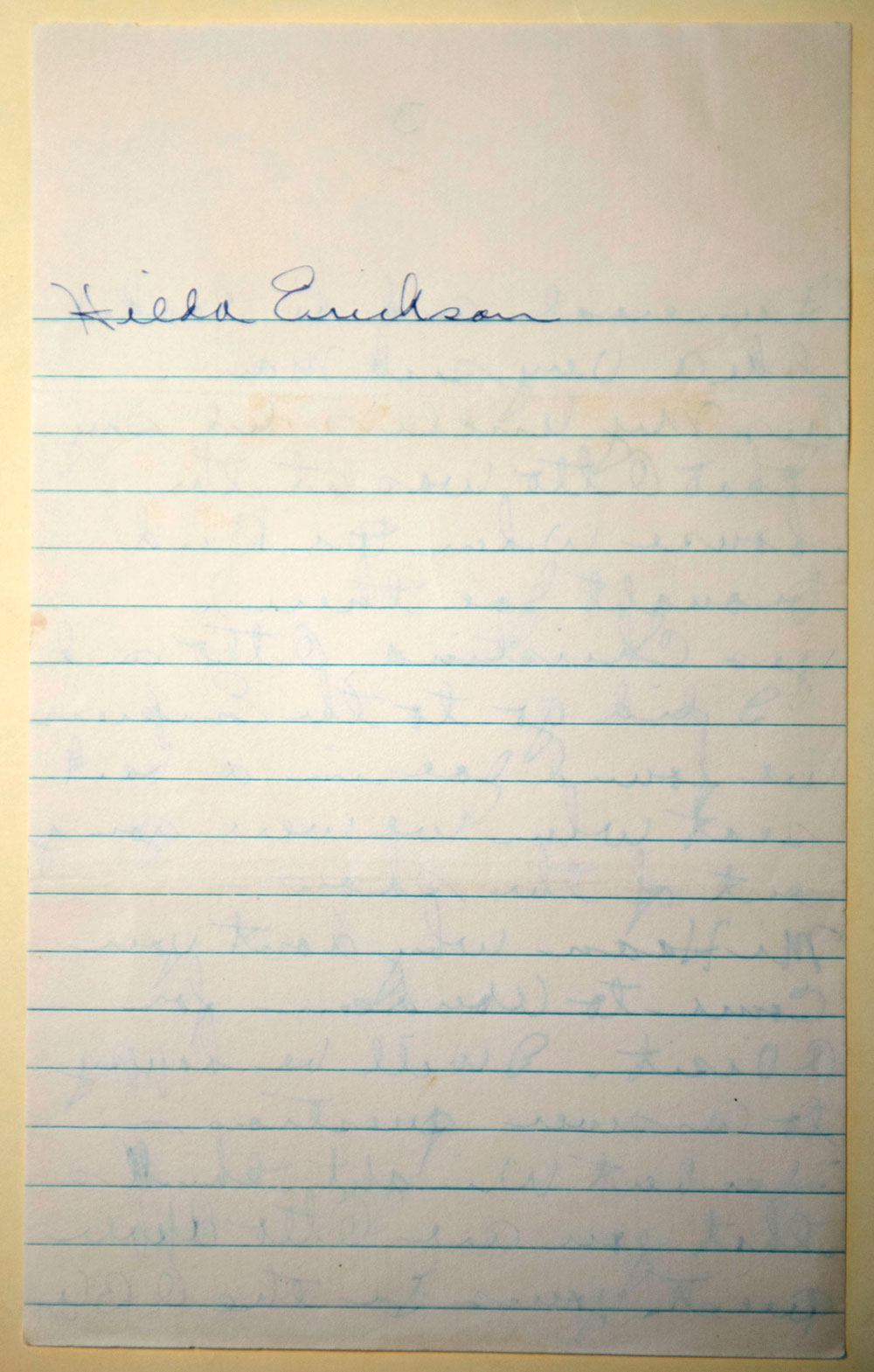
Photo by Jeremy Harmon, The Salt Lake Tribune
Hilda Erickson
This letter was written by Hilda Erickson on Dec.1, 1949. In it, she tells researcher Aubrey Haan that she has been contacted by another person who wants to write a book about Joe Hill's trial.
Aberdeen, Wash.
December 1st 1949
Dear Mr. Haan
November 12th I received a letter from Joseph H. Curtis, 2122 Roberta Street in Salt Lake, saying that he knew my Uncle John, very well, he and his wife came to see my uncle while my brother Robert was there, that was in Murray, Utah about 2 years ago, he is the man that I thought that you were.
Mr. Curtis said that he would like to be as well informed as any living authority on the Joe Hill case. He asked me if I had any facts that I would like to contribute to the book. I did answer his letter, but I did not go into details like I did for you. All I said was that Joe Hill told me before he was arrested, that Otto Applequist had wounded him, and the only thing that I could think of was that Otto must have died because he did not come back to clear Joe and that I have not heard one word from Otto in all these years. I have not heard or read the story from Sweden and Mr. R.B. Young is very much mistaken, I was not in building that he speaks of. If Miss Christina Larson was living she could tell you that I was with her that evening, as I have told you, her house was in Lehi, Utah, I have lost track of her many years ago.
I hope that I have not offended my good friend Mrs. Filigno, she has not answered my last 2 letters, she asked me about a very good friend of ours. Well I spoke very highly of him and told her that he died in 1940. I thought that was answer enough. I have bad news from Murray, Utah. Mrs. Wright, the lady you talked to and her son Herbert, she has written me and says that Herbert was taken to Provo, Utah to the state institution. I am so very sorry because Herbert was a very good friend to Brother Robert and me. We are having lots of rain now but I prefer the rain to the deep snow in Salt Lake and Murray, UT. last year this time.
Wishing you much luck
Hilda Erickson
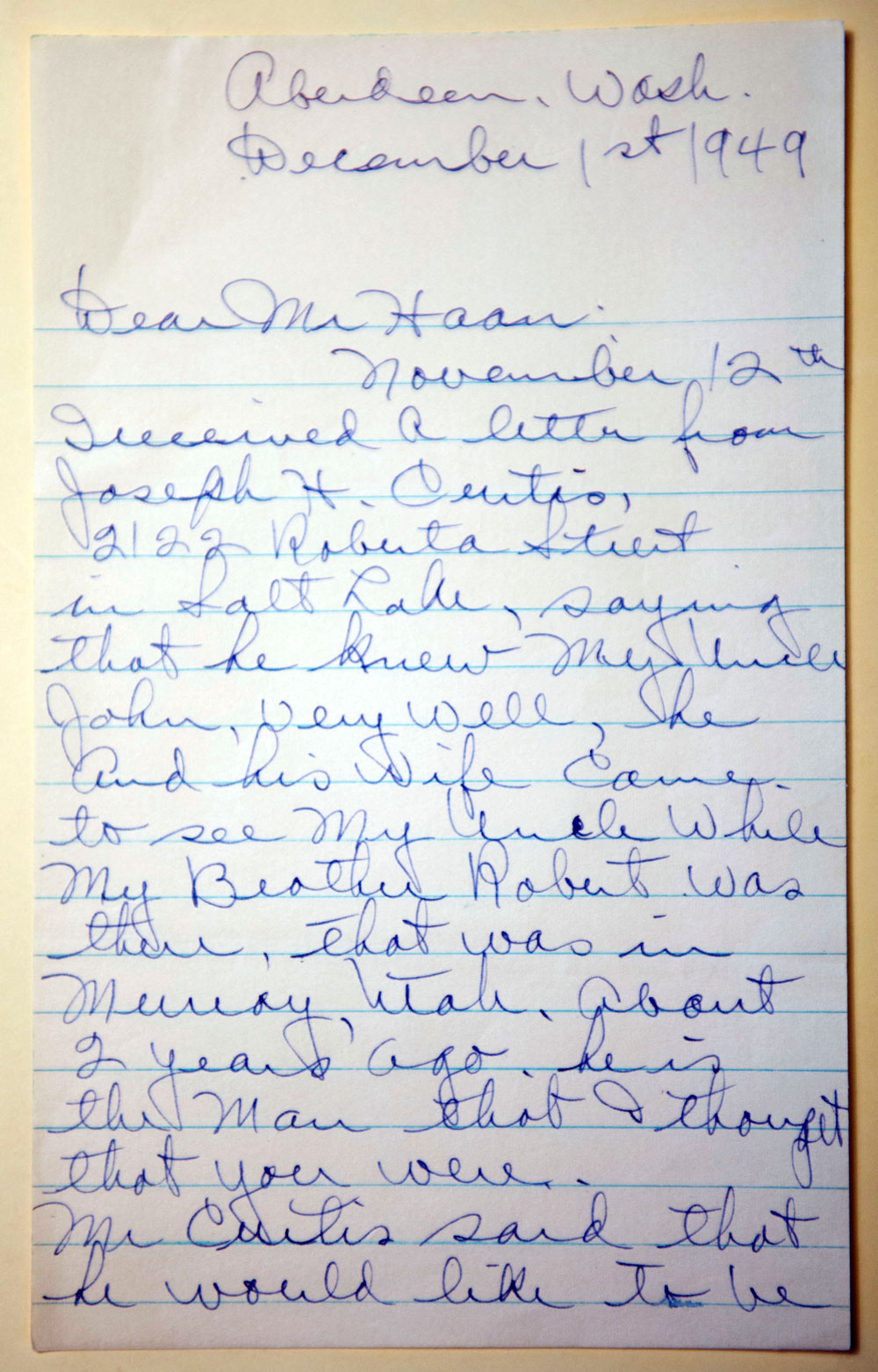
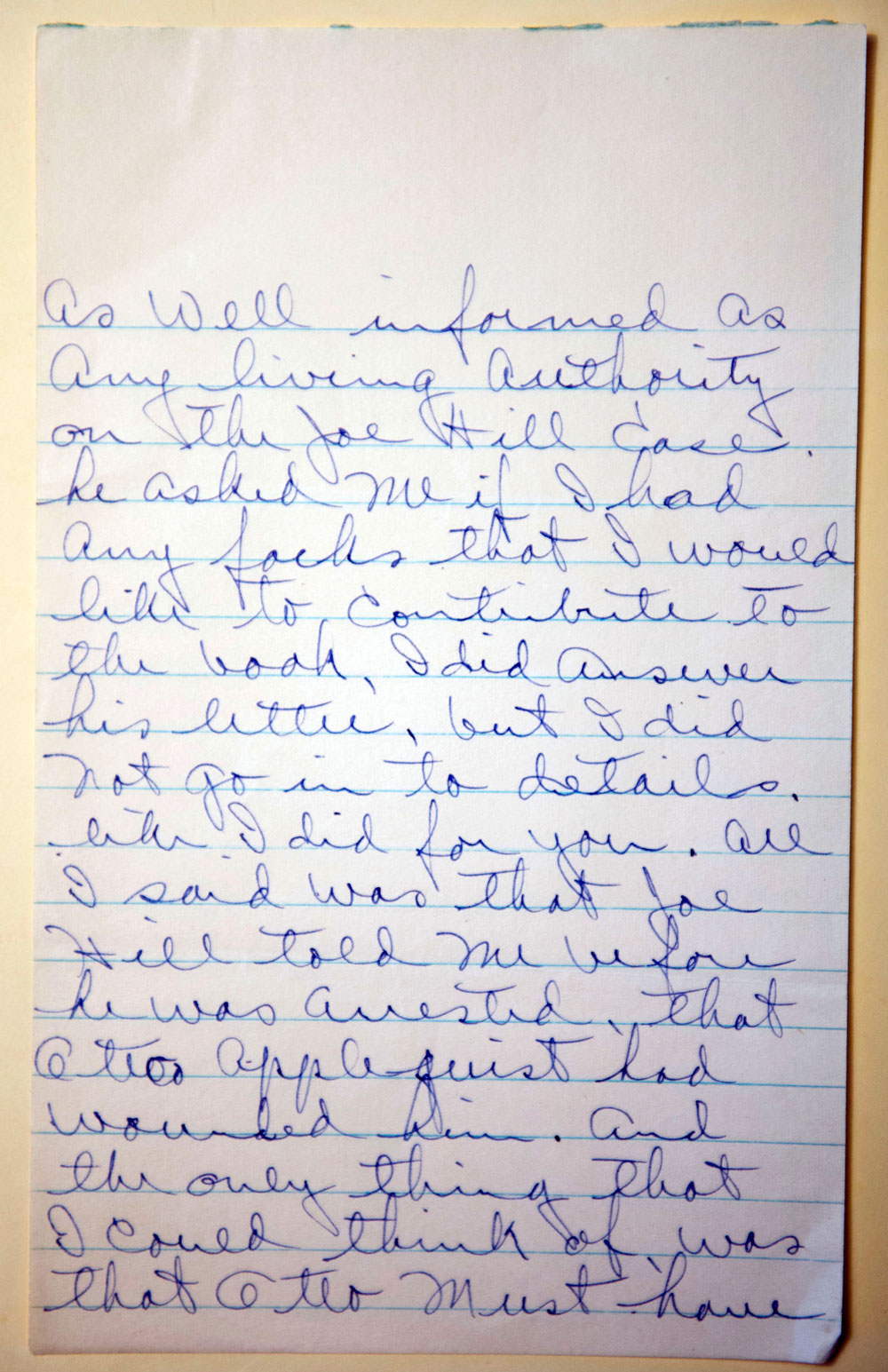
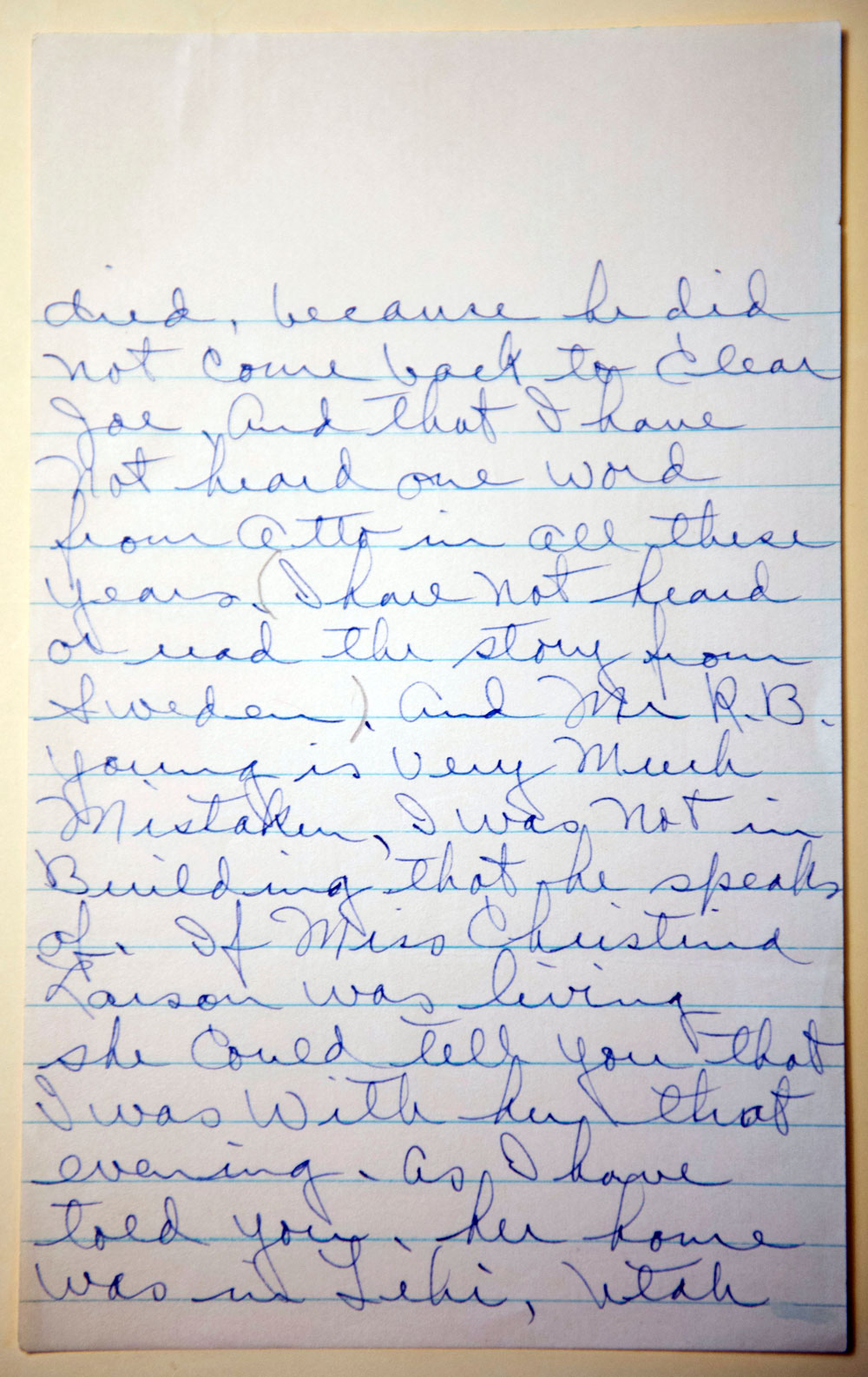
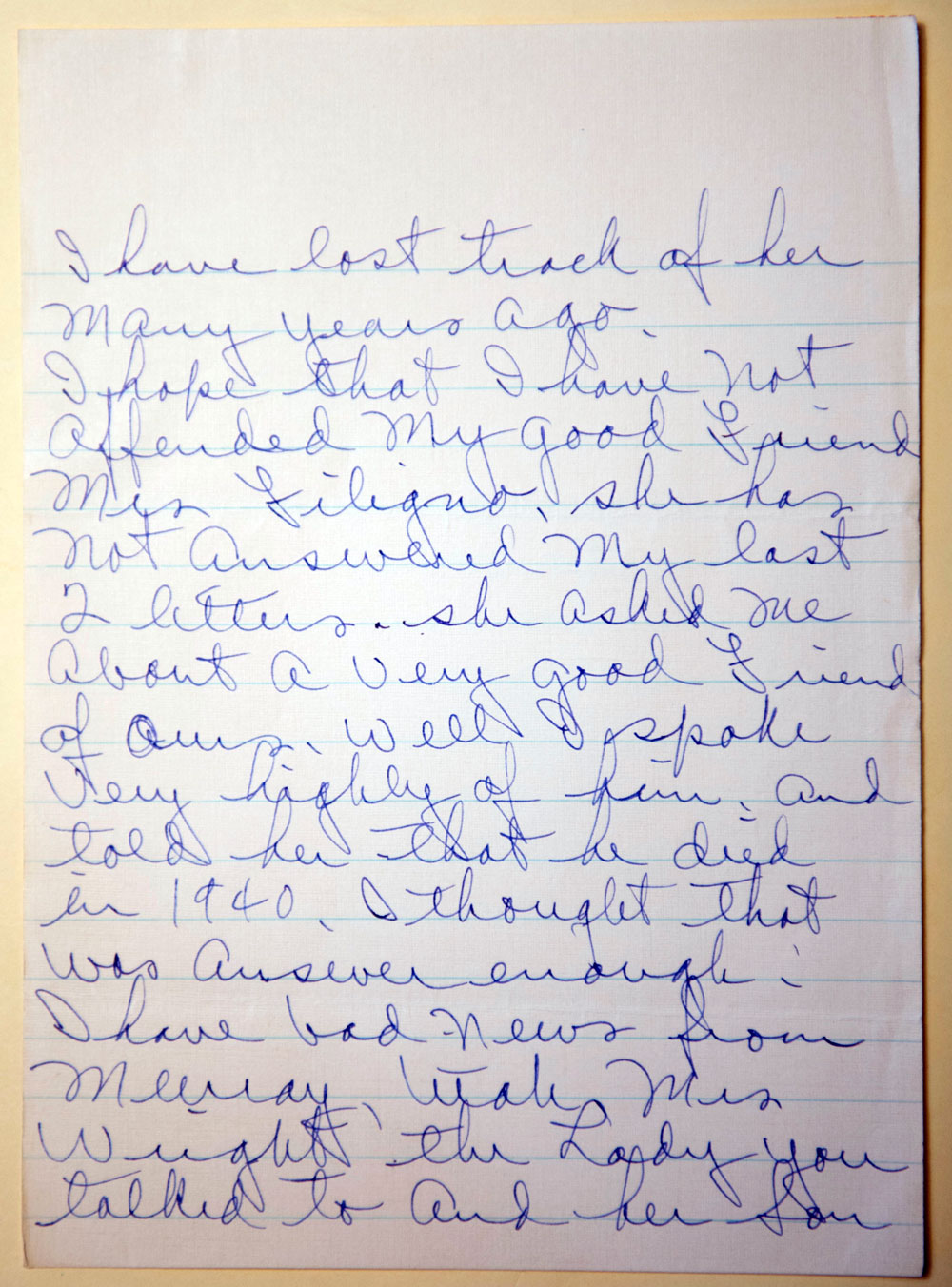
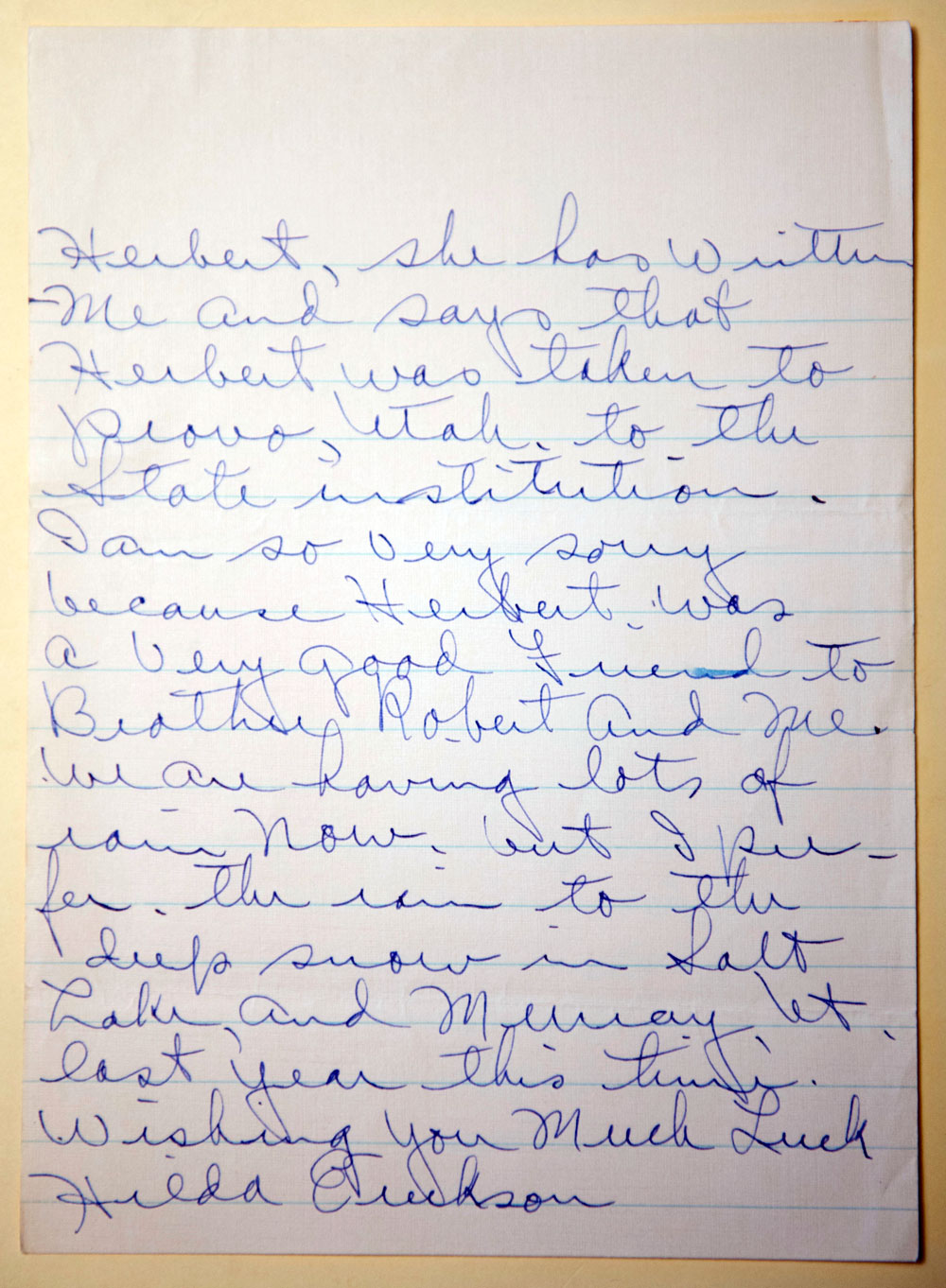
Photo by Jeremy Harmon, The Salt Lake Tribune
Virginia Snow Filigno
In this letter from Virginia Snow Filigno, she says she suspects Hilda Erickson and her family may have been intimidated into silence. She also tells Haan about pressure on Ed Rowan and members of the Joe Hill Defense Committee. But she says she does not know why Hill was "a confounded egotistical stubborn fool as to be silent about" the circumstances surrounding his gunshot wound.
Willow Creek
June 49
Dear Mr. Haan:
Not knowing Hilda’s character at all, I can only think that your letter may have suggested to her the idea of making up a romantic story with herself as heroine. Yet, I feel sure just such an incident might have really happened at that boarding house in Murray, but any common, ordinary run of the mill girl would have afterward, at the time everybody was aware Joe’s life was at stake, would have made some effort to save him, as it was so plain what effect her story might have had.
On the other hand I can not think that Joe Hill himself could be such a confounded egotistical stubborn fool as to be silent about this. And besides the whole family must have known all about it.
There is one terrible suggestion that occurs to me, that is, that as this story would of course help the defense, the whole outfit at that den at Murray, might have been by means of intimidation and threats, paralyzed with fear, into complete silence.
Any answer she might give to leading questions would have no meaning for me, in view of the saying “she was surprised when she heard of the shooting etc” But I also “am curious.”
Sometime after the close of all this, Hilda was accused of treachery of some sort by the boys of the Defense, and one of them broke off his engagement to the girl on learning of it. This was communicated to me after I had left Salt Lake.
One other thing that influences my thinking is that an interview with Ed Rowan made plain to me that a strong pressure had been brought on the boys to stop their defense activities, in fact they were plainly scared.
Sincerely,
Virginia S. Filigno
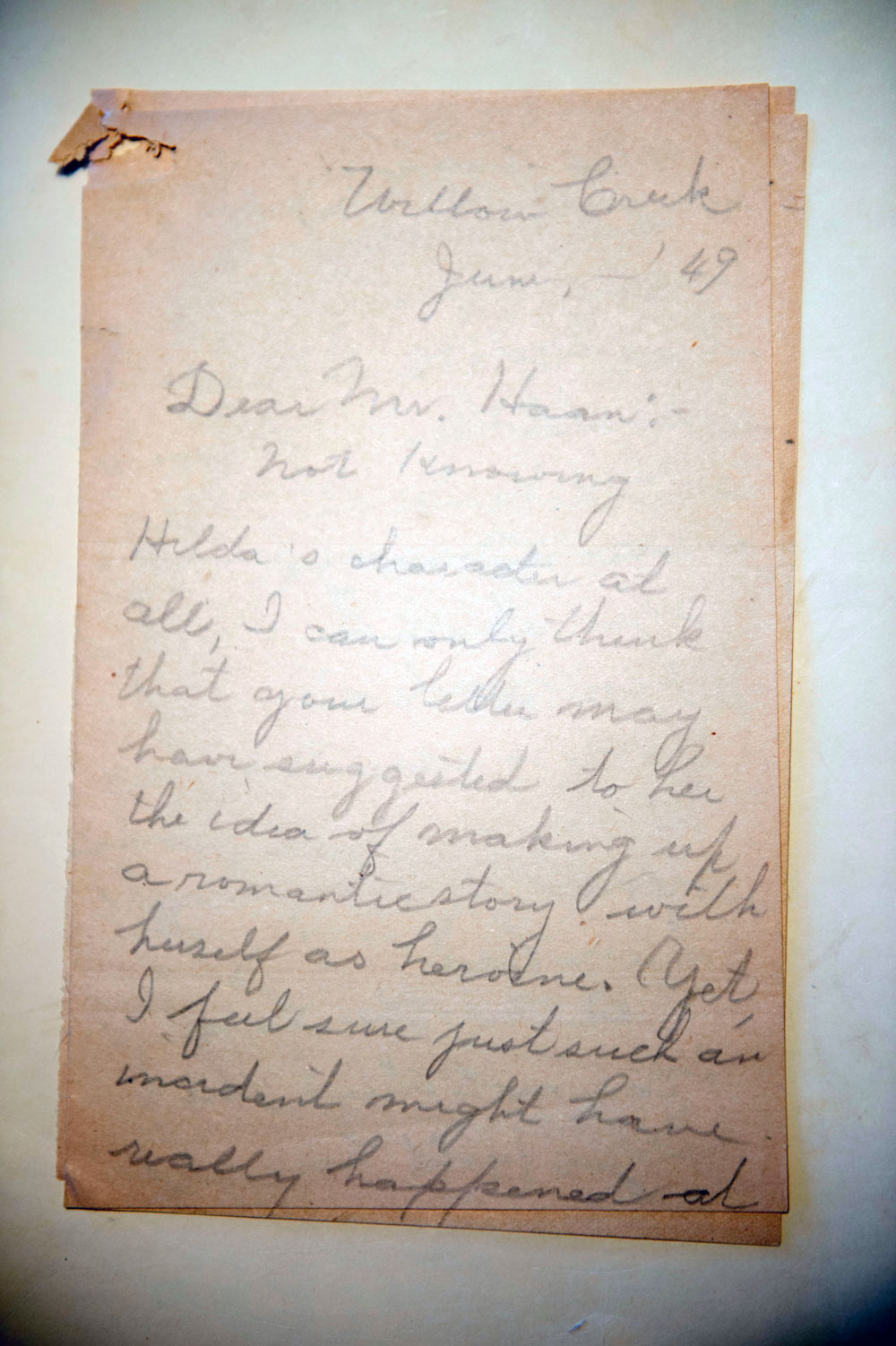
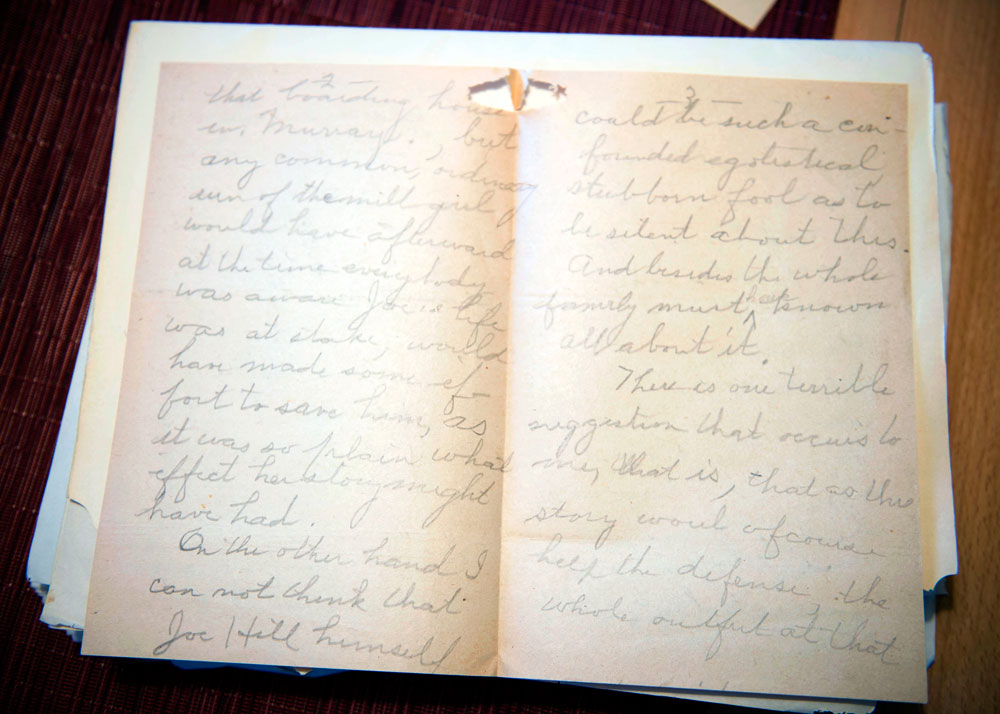
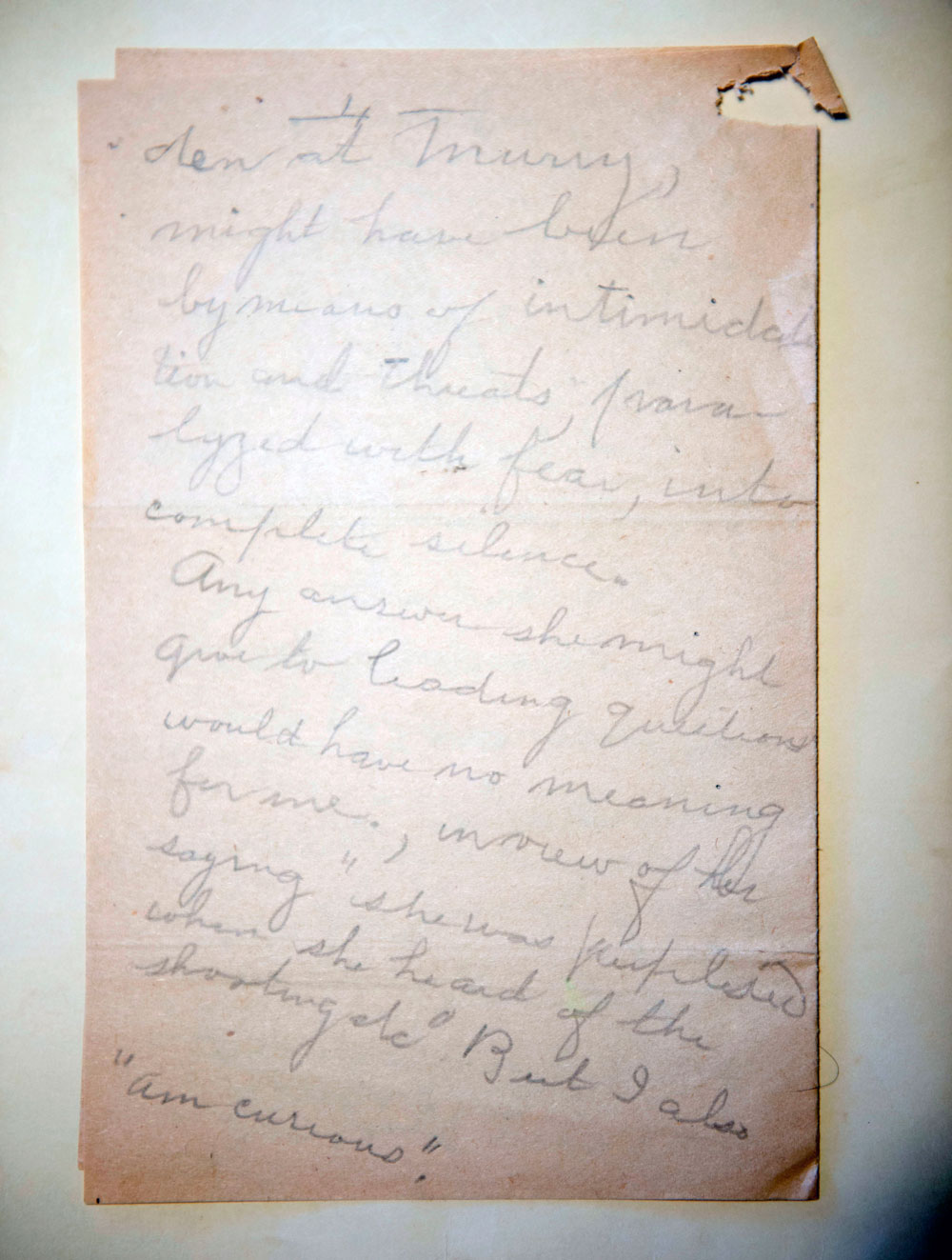
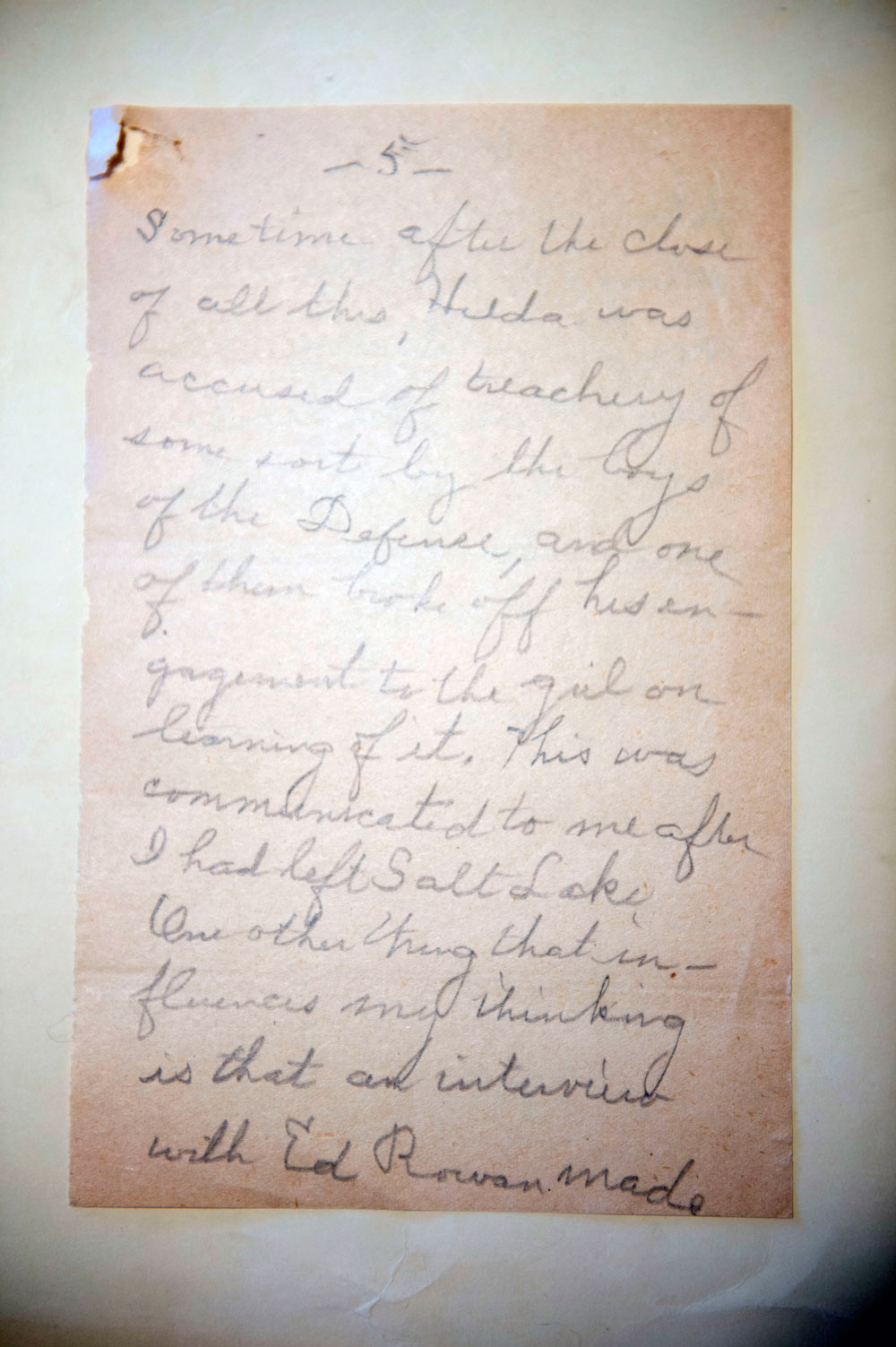
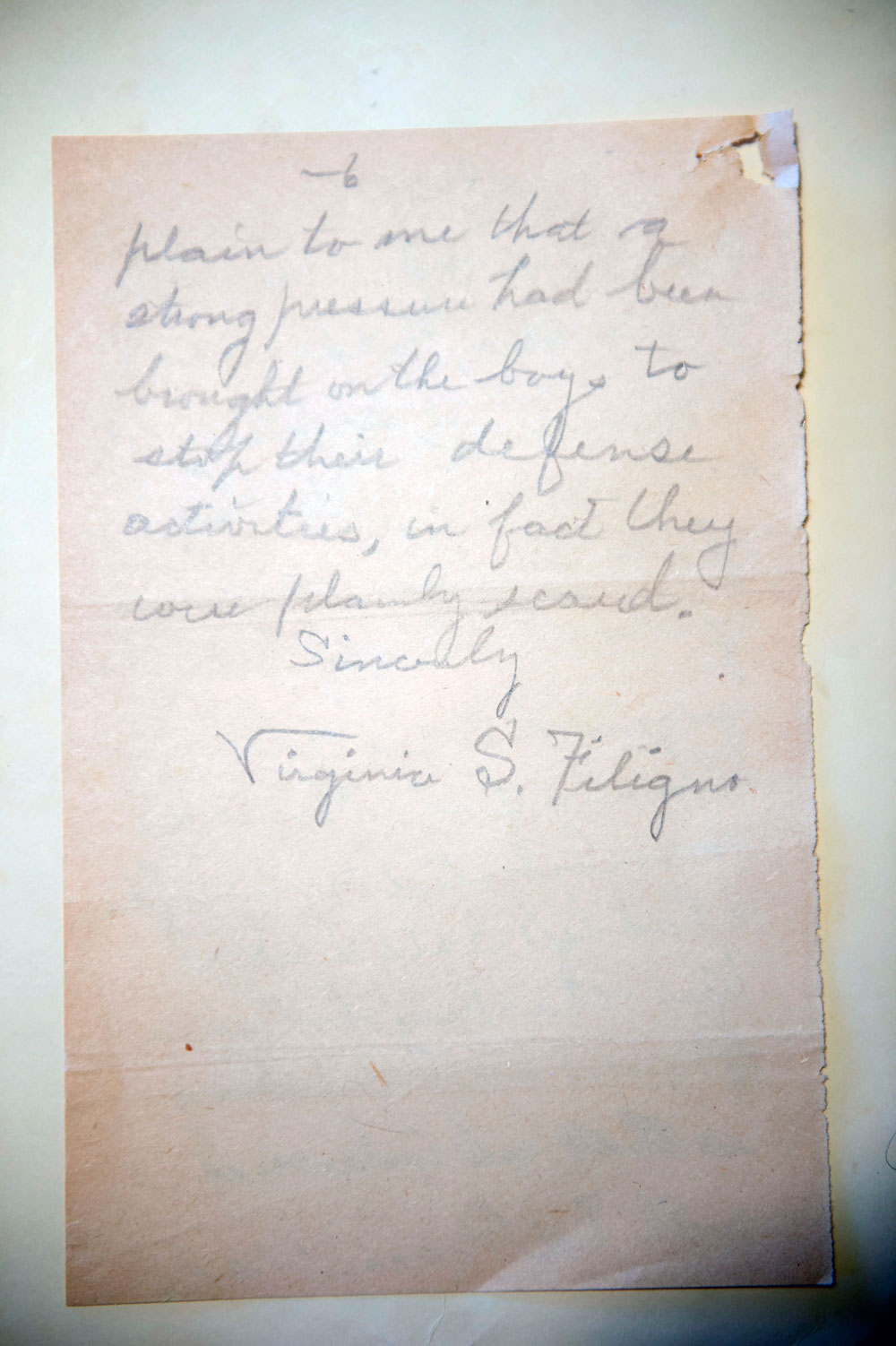
Photo by Jeremy Harmon, The Salt Lake Tribune
Virginia Snow Filigno
This is one of the letters Virginia Snow Filigno wrote to Aubrey Haan. In it, she tells Haan that she is sorry he is having trouble writing his book because to her the story is so "deadly plain and simple."
My Dear Friend Aubrey
We were both delighted to receive a letter from you, especially after waiting so long for it to turn up. And of course we are anxious to see the book and regret that you are having difficulties with it. Probably if I were writing the book myself, it would look that way to me as author, but as it is it all seems a clear and void of mysteries, as it is surely outrageous and unjust in its finale.
I received a long letter from Alfred Sorenson telling of a Mr. Curtis who has also written a book on Joe Hill making him a martyr to labor as of course he was. Mr. Curtis wrote me asking if I had any “papers of Judge Hilton’s.” I did not write to Mr. Curtis, but in answering my old friends letter (Mr. Sorenson’s) told him I’m sure I had no information that could be valuable to Mr. Curtis. But I told Alfred Sorenson about Hilda’s revelation and as he has said nothing about it in his reply, I think he thought very little of it. It may be he knows her better than I do.
Thanks for the “Wobbly.” We both enjoyed reading it. I think it a valuable record, and I am inclined to agree with him in most of his estimates of people and events. Of course, as Constantine says, he makes many mistakes on dates, but that is of little importance. I never met Ralph Chaplin, but I like him for writing such a book as that.
I’m afraid he is right about these troublous Commies, but they did bug off a revolution and it is true that Lenin was one of them -- a grand soul, his.
Have had several letters from Hilda but she says almost nothing and if I do not reply at once she writes again to ask if I am offended at something and of course I must write again to say “no, of course not” and so am doomed to a perpetual correspondence with Hilda.
Enough of this useless scribbling -- I wish above everything that I could give you some clue that might clear up what you feel are “mysteries” in this story of poor Joe, a story that seems to me so deadly plain and simple, but that view does not make a story to satisfy a publisher of an expensive book, but of this I am sure that the book you will write will satisfy the lovers of right and truth and to hell with the rest of them!
Very sincerely
Virginia S. Filigno
P.S.
We have acquired a new heater - circulating - and am confident we shall conquer the bitter cold of this coming winter; even your bedroom upstairs can be warmed.
V.S.F.
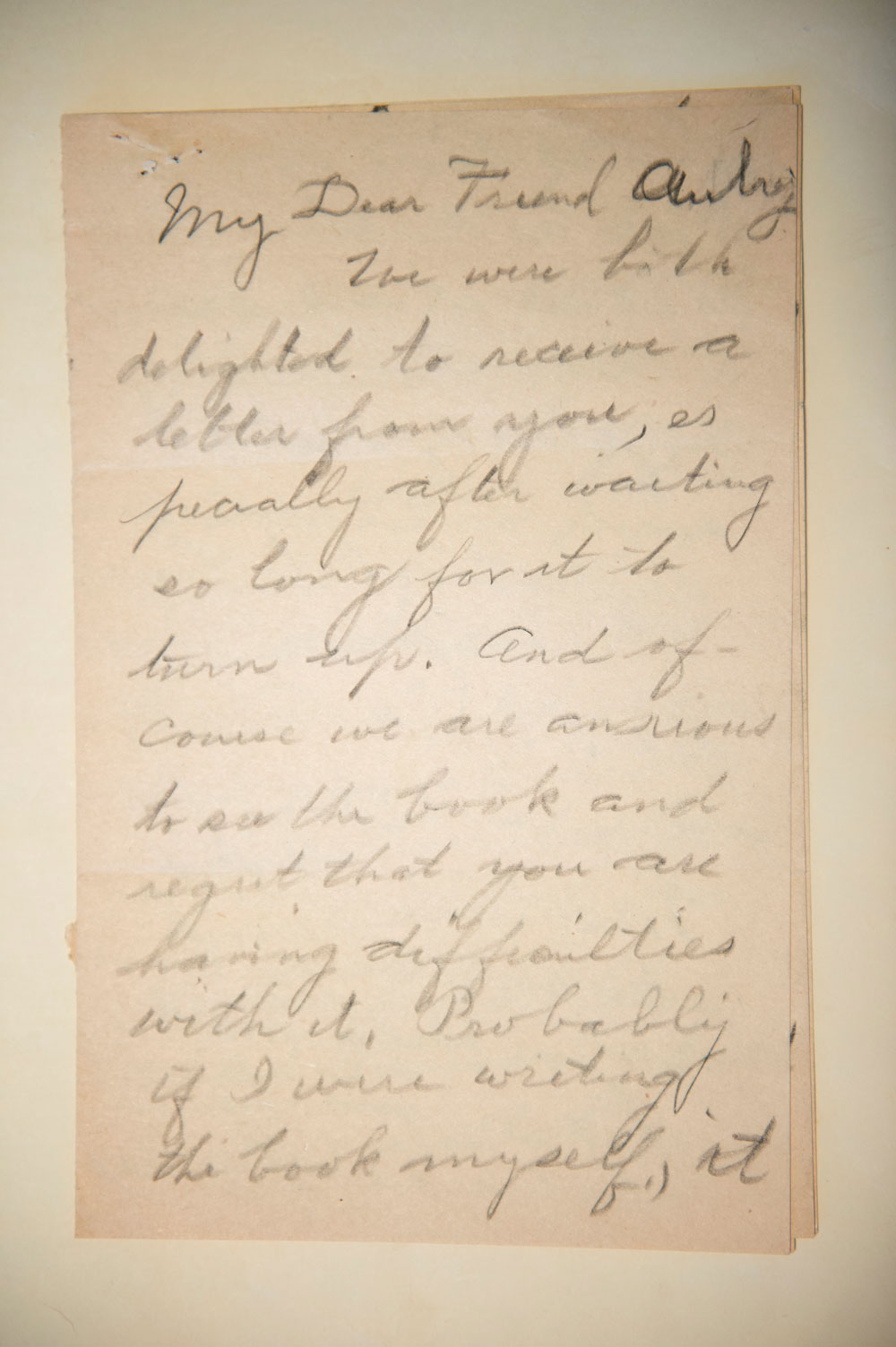
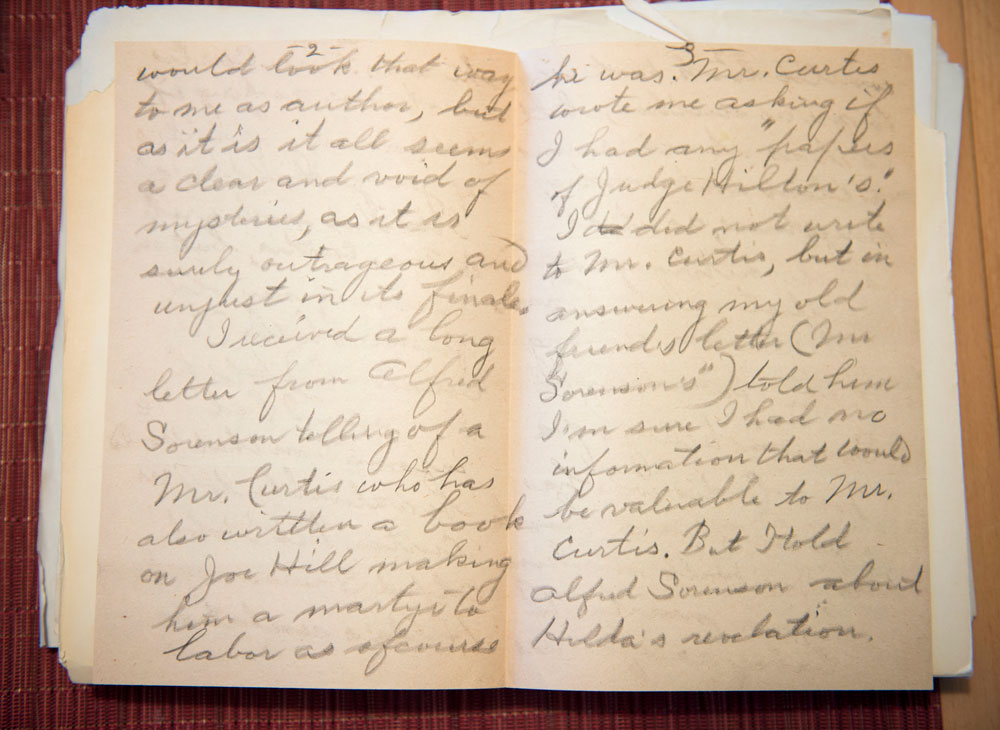
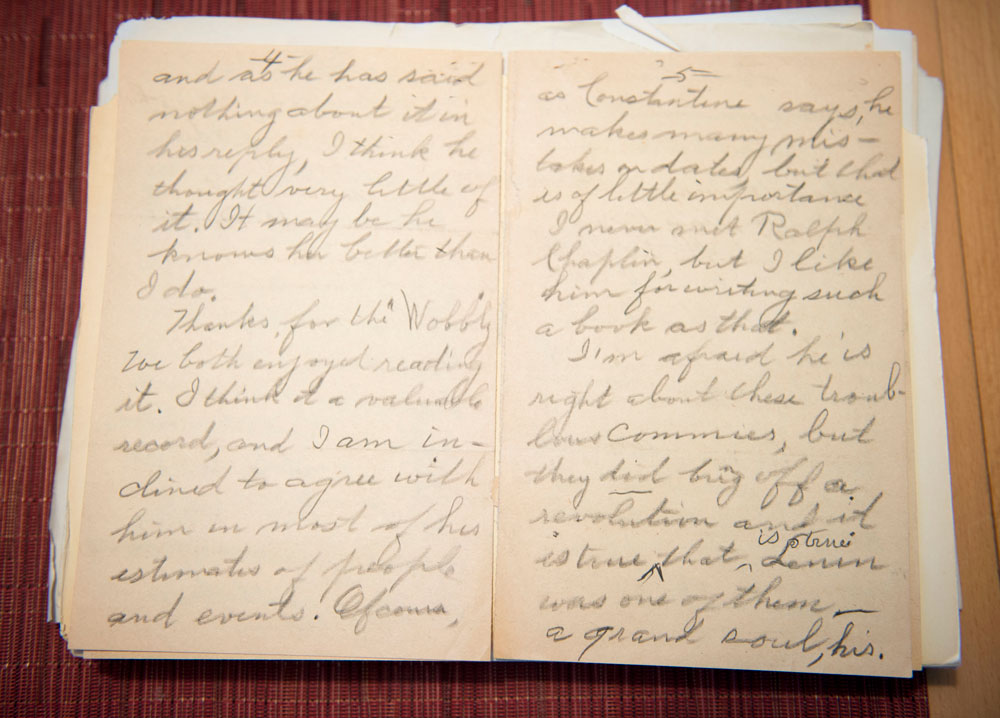
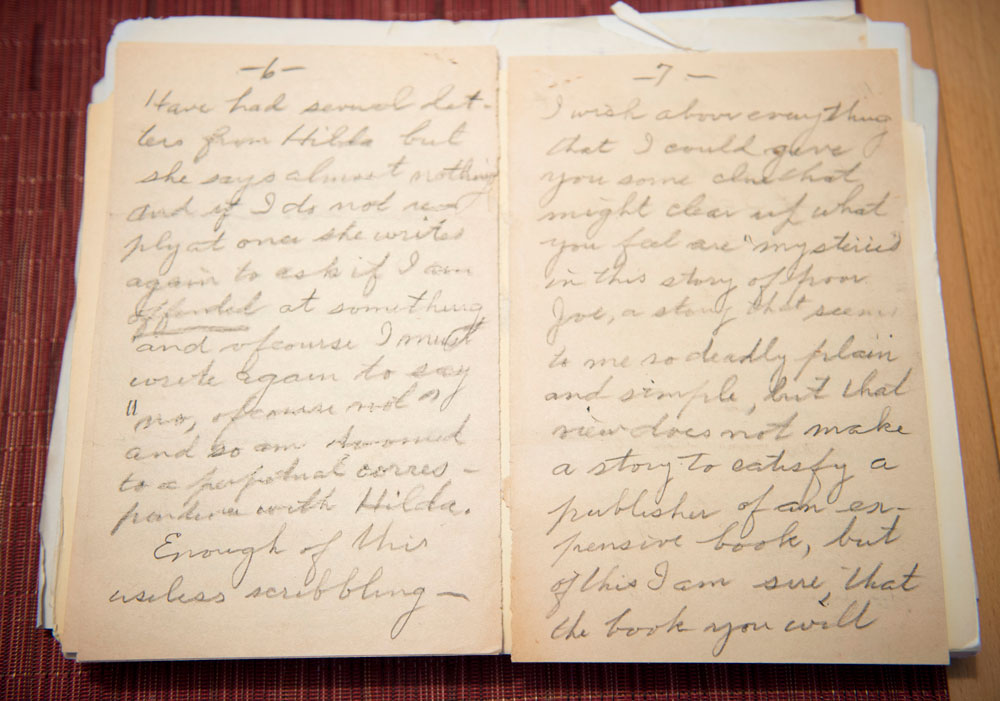
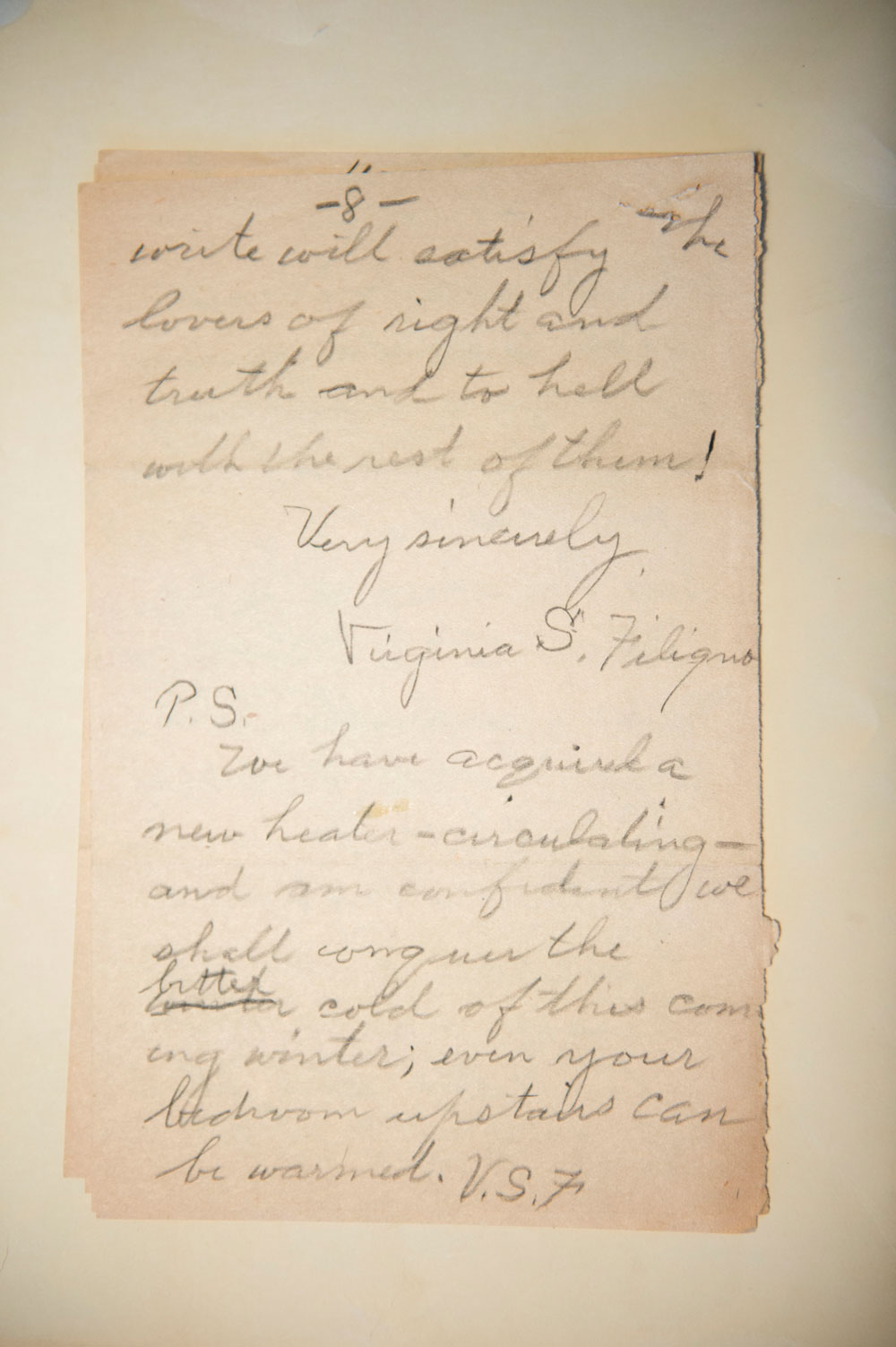
Photo by Jeremy Harmon, The Salt Lake Tribune
Virginia Snow Filigno
Virginia Snow Filigno's letter to Aubrey Haan suggests they became close friends.
Willow Creek
May 20 — ‘49
My Dear Mr. Haan:
We received your letter yesterday informing us of your coming to Eureka June 2nd.
The stage from Willow Creek (The Redding stage) leaves around 8 a.m. daily arriving here shortly before noon.
Instruct the stage driver to let you off at Roth, Resort, a service station which is about two hundred yards from our house to which come directly and we shall arrange for accomodations for you later.
Very sincerely,
Virginia S. Filigno
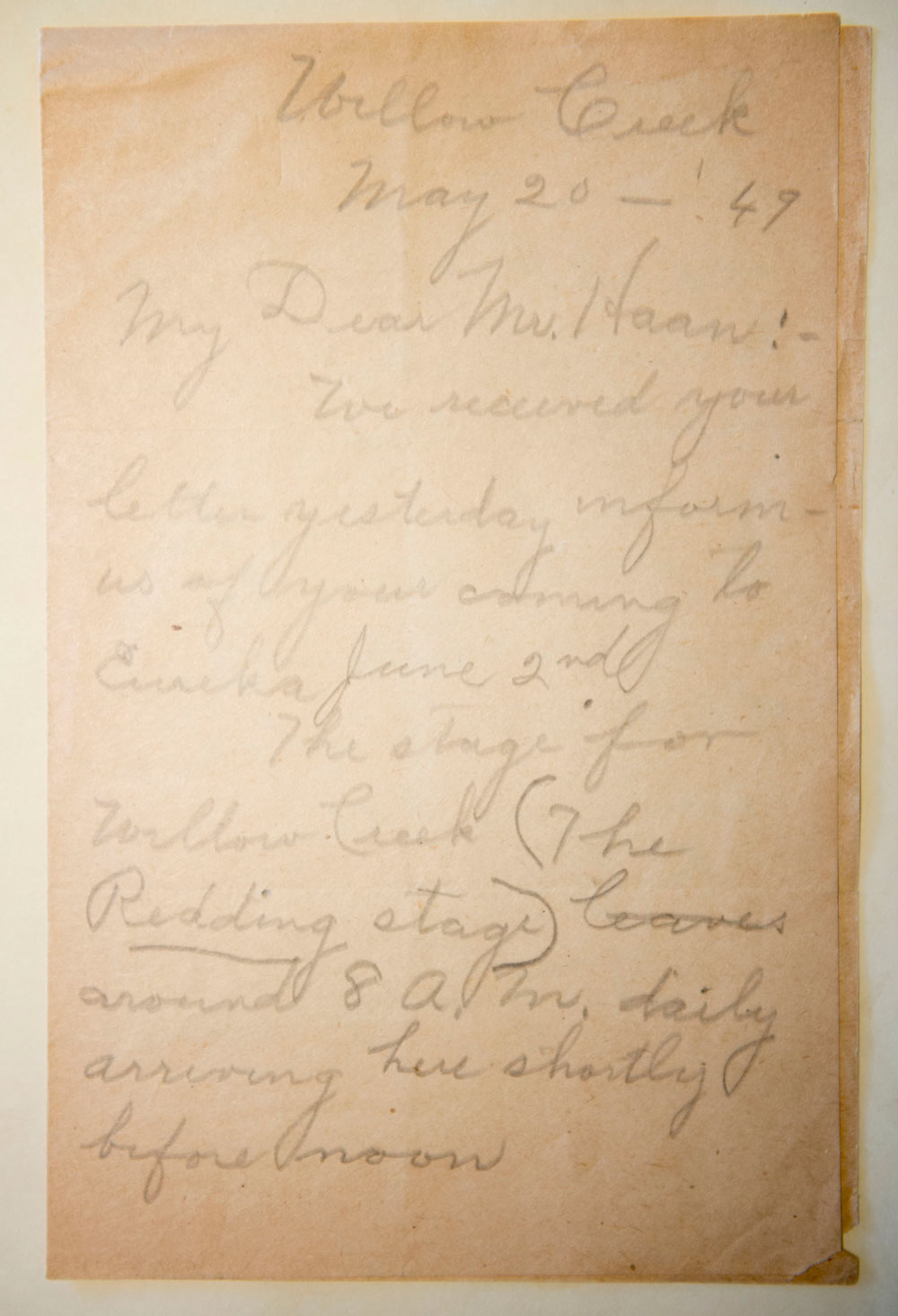
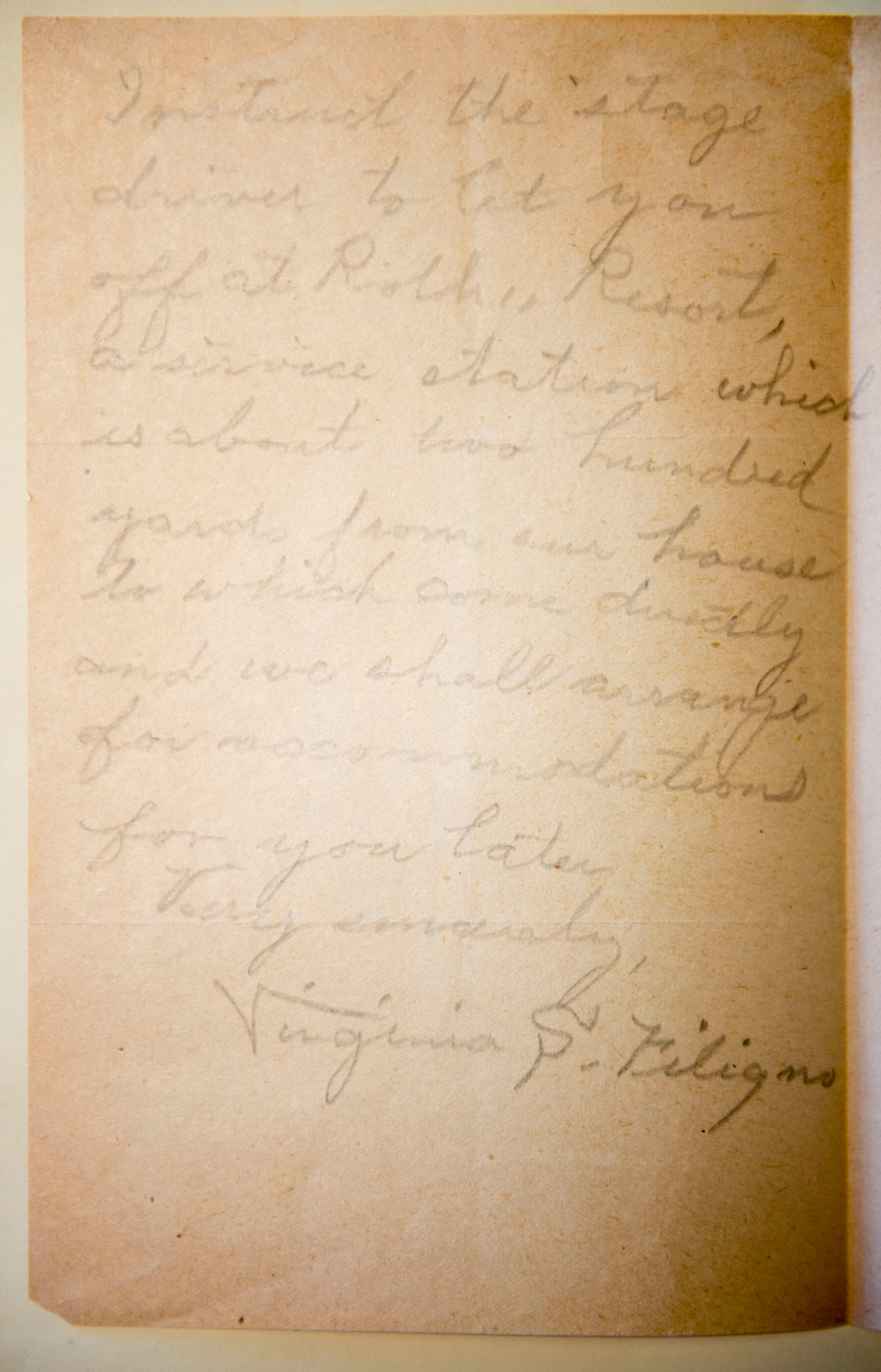
Photo by Jeremy Harmon, The Salt Lake Tribune
Virginia Snow Filigno
In this letter to Aubrey Haan, Virginia Filigno recommends that he read an article in the Feb. 1950 issue of "Reader's Digest" by conservative writer John Flynn. She says that while she agrees with Flynn's views on communism, she thinks that his position sounds like a "call for a general attack on everything that is forward looking in our civilization."
Willow Creek
Feb. — ‘50
Our dear Friend —
Needless to say we were both very glad to hear from you again, and pleased and proud to read the nice things you had to say of us who had known the moment you came to our house in the woods that here was a friend, the most precious gift the gods can send to any one. And we want you to know that we shall look forward eagerly to your visit to us.
If you have not read Flynn’s “The Road Ahead” in the February Reader’s Digest you must do so. It will give an explanation of many things occurring round us. It sounds to me like a call for a general attack on everything that is forward looking in our civilization. How can any one of us escape unless we both gag and tie ourselves up.
We have had vile weather, heaps of snow and cold rain. Constantine spends his time supplying the two stoves with wood and he has hardly a moment to spare for anything else, but he’ll get a letter off to you by next mail if not with this.
Very sincerely your friend,
Virginia S. Filigno
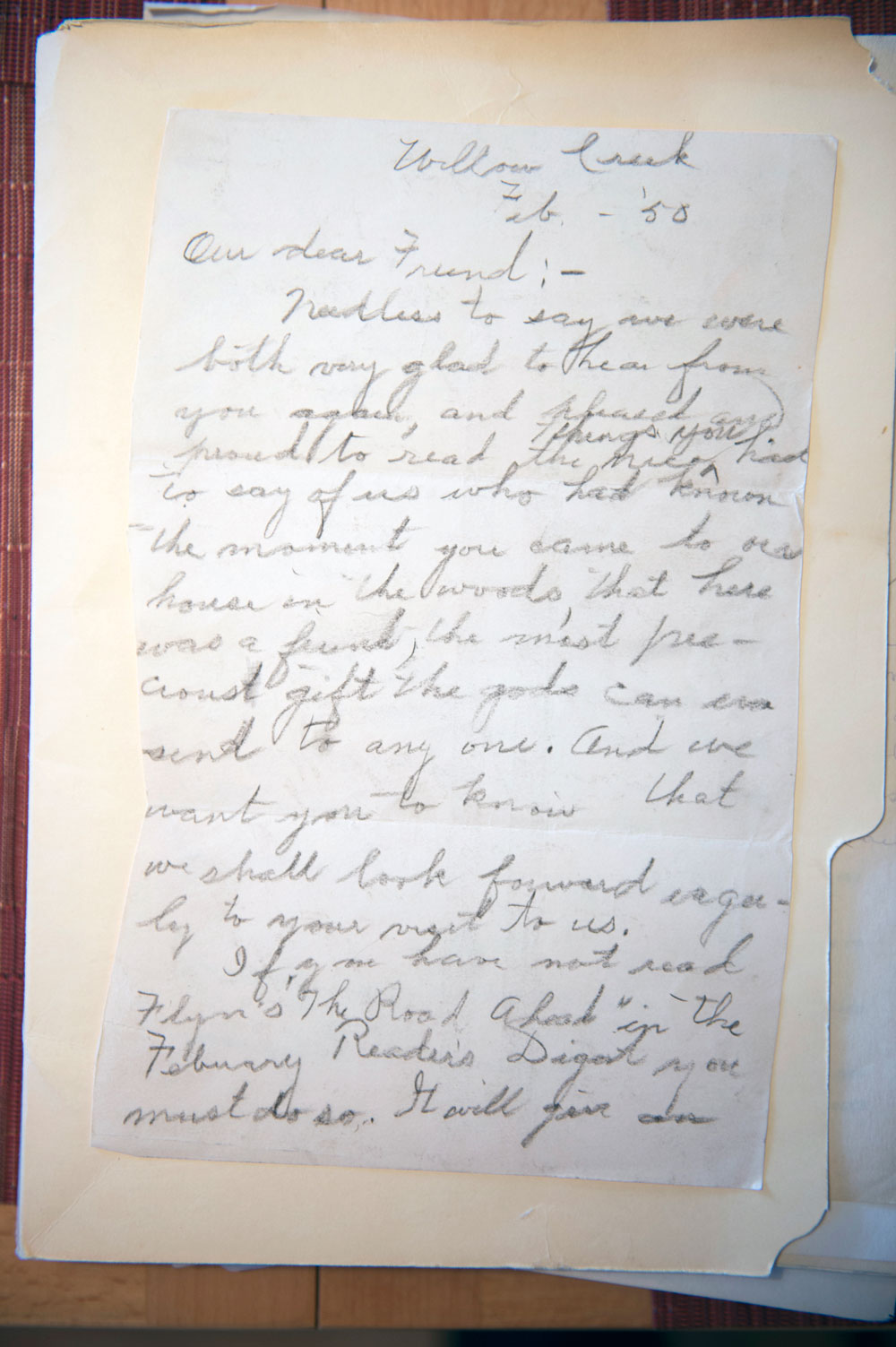
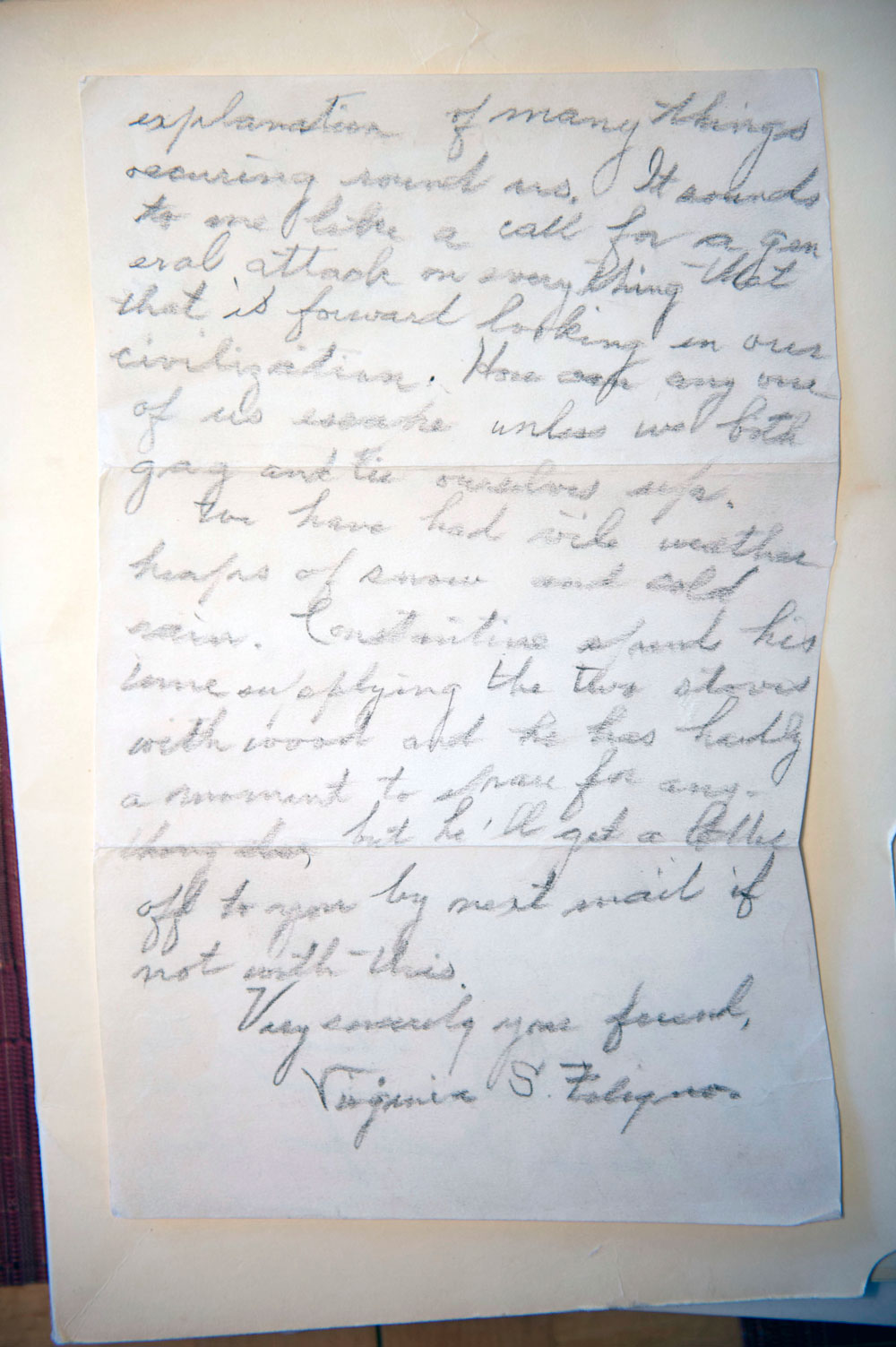
Photo by Jeremy Harmon, The Salt Lake Tribune
Constantine Filigno
After Joe Hill's execution, Virginia Snow Stephen married Constantine Filigno, who had been an organizer for the Industrial Workers of the World. In a letter dated Feb. 4, 1950, Filigno says members of the Salt Lake City-based Joe Hill Defense Committee accused Hilda Erickson of some kind of "treachery" surrounding the events of Hill's execution. Filigno writes that an IWW member, identified only as Anderson, broke off his engagement to Erickson after the "treachery" came to light.
Willow Creek, Calif.
Feb. 4th 1950.
Dear Mr. Haan,
We received yours of the 21st ultimo (SP?) and we have been thinking good deal over the shooting of Joe Hill.
In our of the letter to Virginia Hilda stated that going home on a Sunday, which was her day off from her work, she found Joe lying on her grandmother cot wounded. She asked him to tell her who had shot him. Joe replied that Otto (Applequist) had shot him. However, Virginia knows that Hilda, some time after the Joe execution, had been accused of treachery in the Joe Hill case and a young man by the name Anderson who was engaged to be married to Hilda broke off the engagement over the accusation. The said Anderson was a member of Joe Hill defense committee and he must have thought that Hilda had done something terrible to break off the engagement.
I have been thinking of the probability of the truth of this imbroglio and it is perhaps better that I consider it so you and but you use your own judgement for what it is worth. At the same time get it off my chest.
In regard to Agnes Thecla Fair, I met her in Spokane, Wash. in the early summer of 1909. She came to the I.W.W. hall and introduced herself as a fellow rebel and that she had just come from Alaska. At that time I was secretary treasurer of the Executive Committee of the I.W.W. Locals in Spokane. Agnes came to the office a couple of days later and brought a bundle of manuscript some in prose and some in poetry and wanted me to look them over with her as she wanted to get them printed. She said that she was going to call that collection of writing "The Sour Dough Bible." She got some of the lot printed but I don't know how much.
The Spokane free speech fight started some time the following November (as I remember) and Agnes took part in that, but I can't say how long she was in jail there.
Virginia met Agnes in Salt Lake City during the railroad shopman strike. Virginia gave her meals and lodging and Agnes would go and speak to the strikers once or twice a day.
In 1913 Agnes showed up in Eureka during the time that Alexander Mac Kay was secretary of the I.W.W. local there. She passed through Willow Creek speaking in all places along the trail to Weaverville.
I saw her for the last time for a short while in San Francisco during the Pan American World Fair. Sometime after that we heard that she had thrown herself in front of an electric car in Portland, Oregon which resulted in her death.
I have been told that Agnes was a very good public speaker, a friend of ours said that Agnes was a better speaker than Emma Goldman. She certainly would have to be good to beat Emma.
Agnes was devoted to the cause of labor and I think that she wouldn't stop at anything in order to advance the labor cause. She showed at times of being a little erratic, but that may have been that she was carried away at times by exuberant enthusiasm. When Joe Hill was waiting to be executed, Agnes wrote a letter to our governor of Utah from some place in Nevada, saying that she was willing to be executed in Joe's place.
In referring back to the Joe Hill's case, it doesn't seem quite possible that you did not run into the story that Joe was shot by Otto Applequist while you were doing research work in Salt Lake City for the Joe Hill case. There is a remote possibility that young Anderson got the story direct from Hilda of how Joe was actually shot and he could not help thinking that Joe's life would have been saved if Hilda had told the story at the trial. There wasn't anything else for Anderson to do but to break the engagement, accuse Hilda of treachery and keep the truth of the story to himself. We have heard through Hilda that Anderson passed away a couple of year ago. At the same time we are not forgetting the power exerted by police deputies and detectives to frighten Hilda and family into silence.
We are hastening the arrival of summer in the hope of seeing you.
Sincerely yours, Constantine
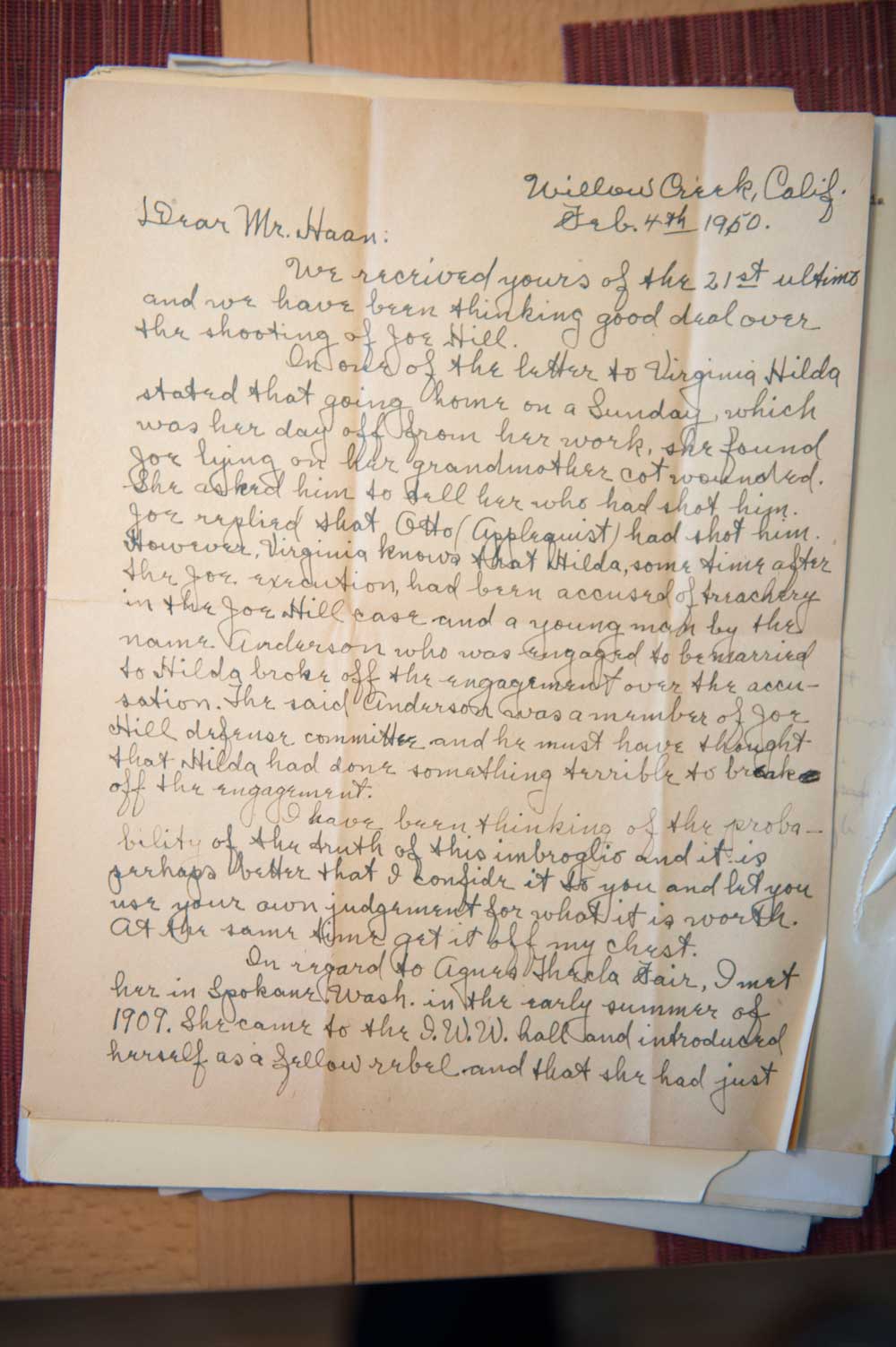
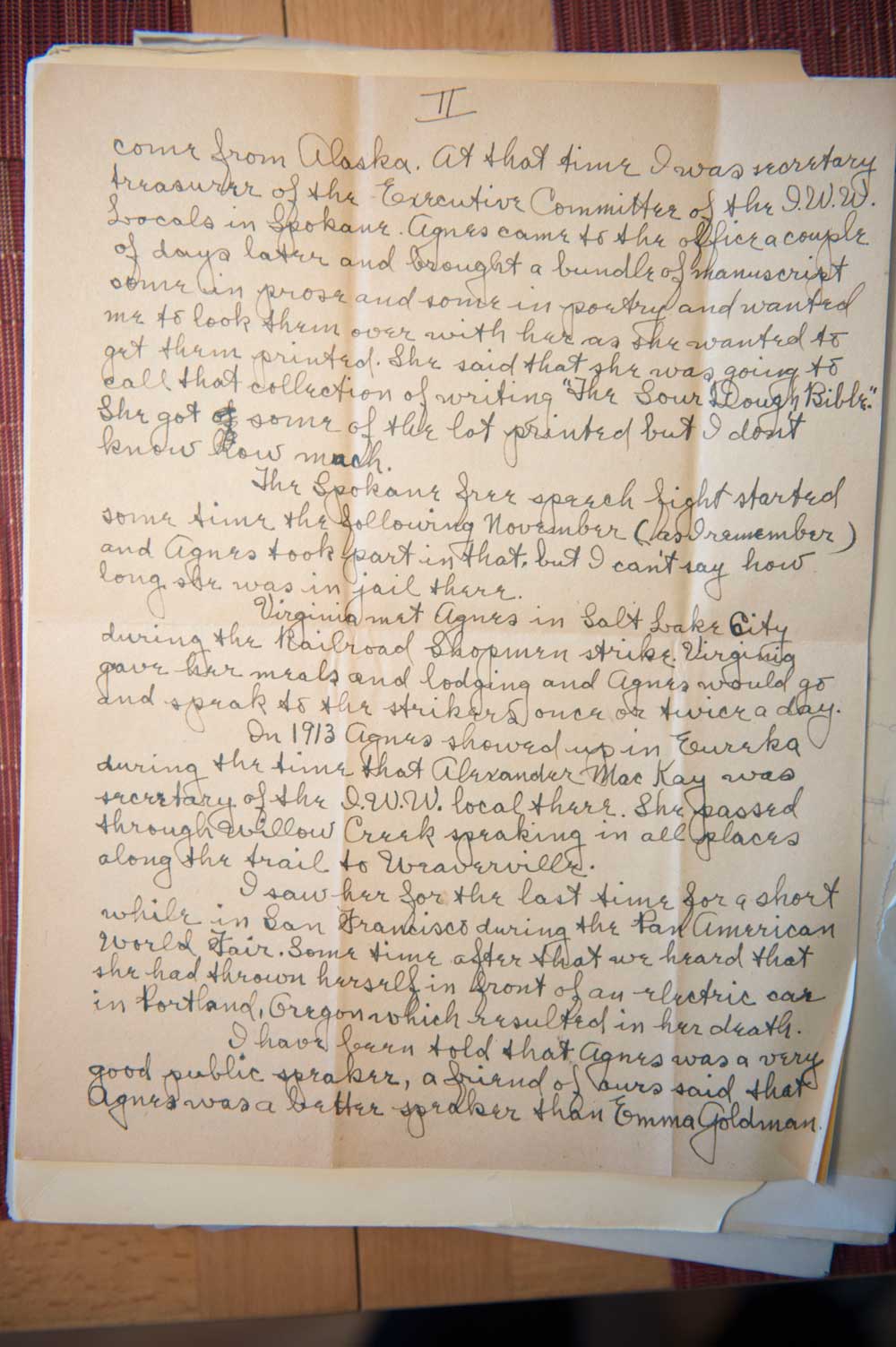
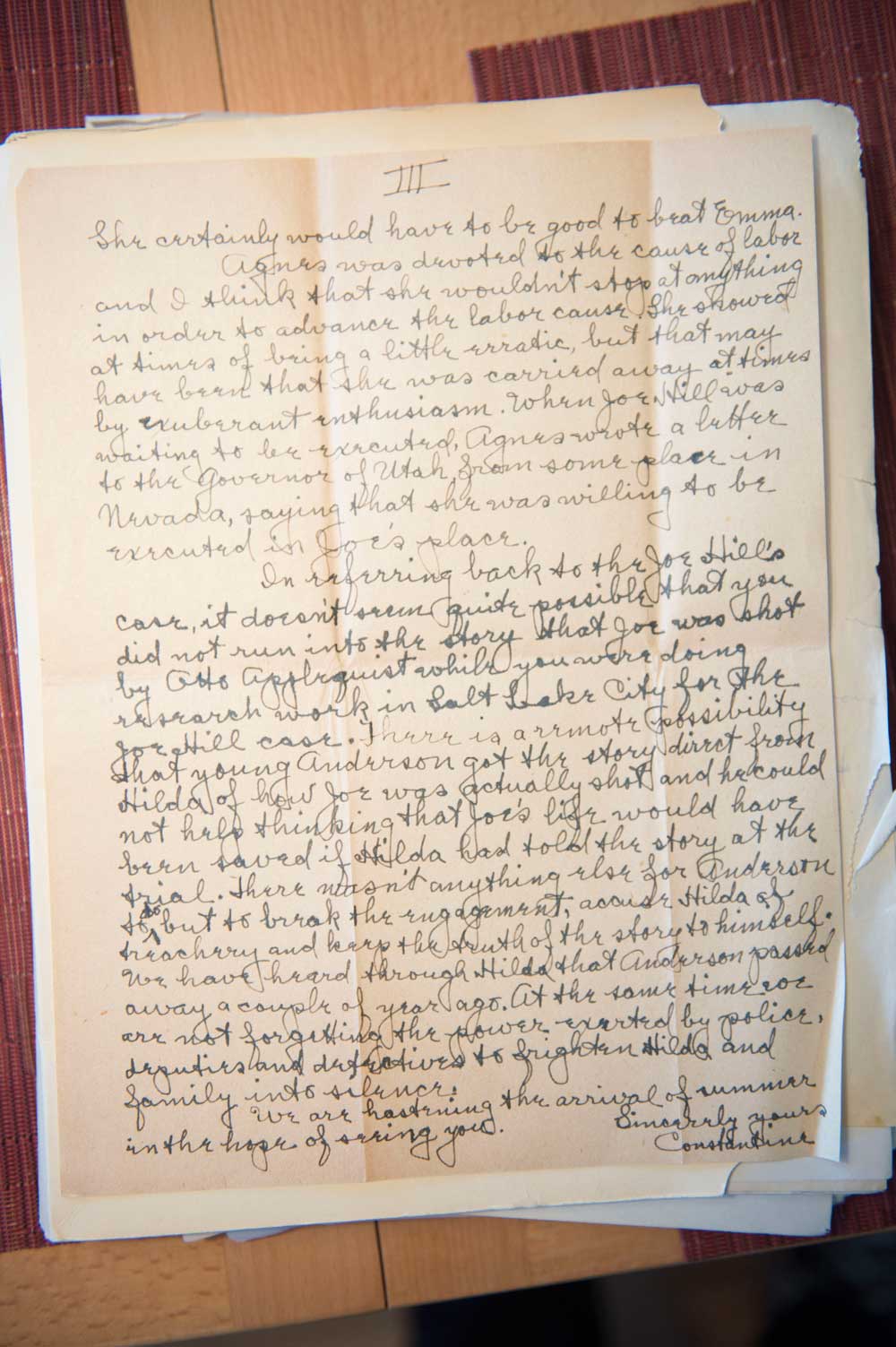
Photo by Jeremy Harmon, The Salt Lake Tribune
Constantine Filigno
Constantine Filigno was a former organizer for the Industrial Workers of the World. In this letter, dated Nov. 17, 1949, he describes, among other things, helping to publish the first editions of the IWW songbooks that would later make Joe Hill famous.
Willow Creek, Calif.
Nov. 17th 1949
Dear Aubery Haan:
I think "Wobbly" as the experience of Ralph Chaplin in the I.W.W. is a good report of the activities of that organization. Of course, there are a few wrong dates as well as few wrong statements. For instance, it states on page 186 that Joe Hill got out the first edition of the I.W.W. song book and was illustrated and published at his own expense which is not at all true. There were six editions of the I.W.W. song book which were published by the executive committee of the Spokane locals of the I.W.W. In fact, I had charge of the first two editions of the song book myself.
Joe Hill did not take part in the Fresno free speech fight. I am positive of that, because I was there from the beginning to the end and actually knew all the members of the I.W.W. who participated there.
The highlights of Joe Hill case as stated by Judge Hilton at Joe Hill funeral in Chicago, seems to me, to be clear and to the point.
I am of the opinion that Ralph Chaplin got in bad company when he went to work for Beck and Tobin. It seems as if anything he did was justified by the fact that he was anti communist. Well, that may be so, but he descended somewhat to get to the level of the reactionary labor fakers and mud slingers.
When you come to the mainland next summer you will be welcomed at our shack in the Trinity Forest. We will be glad to have a few sessions of "kai hui" — what the Chinese call a good long talkfest.
Since you were here we have acquired electric lights. The P.G.E. Co. has installed electricity in this neck of the woods about three months ago.
Shall we send "Wobbly" back to you in Hawaii or wait until you come?
Sincerely yours,
Constantine L. Filigno
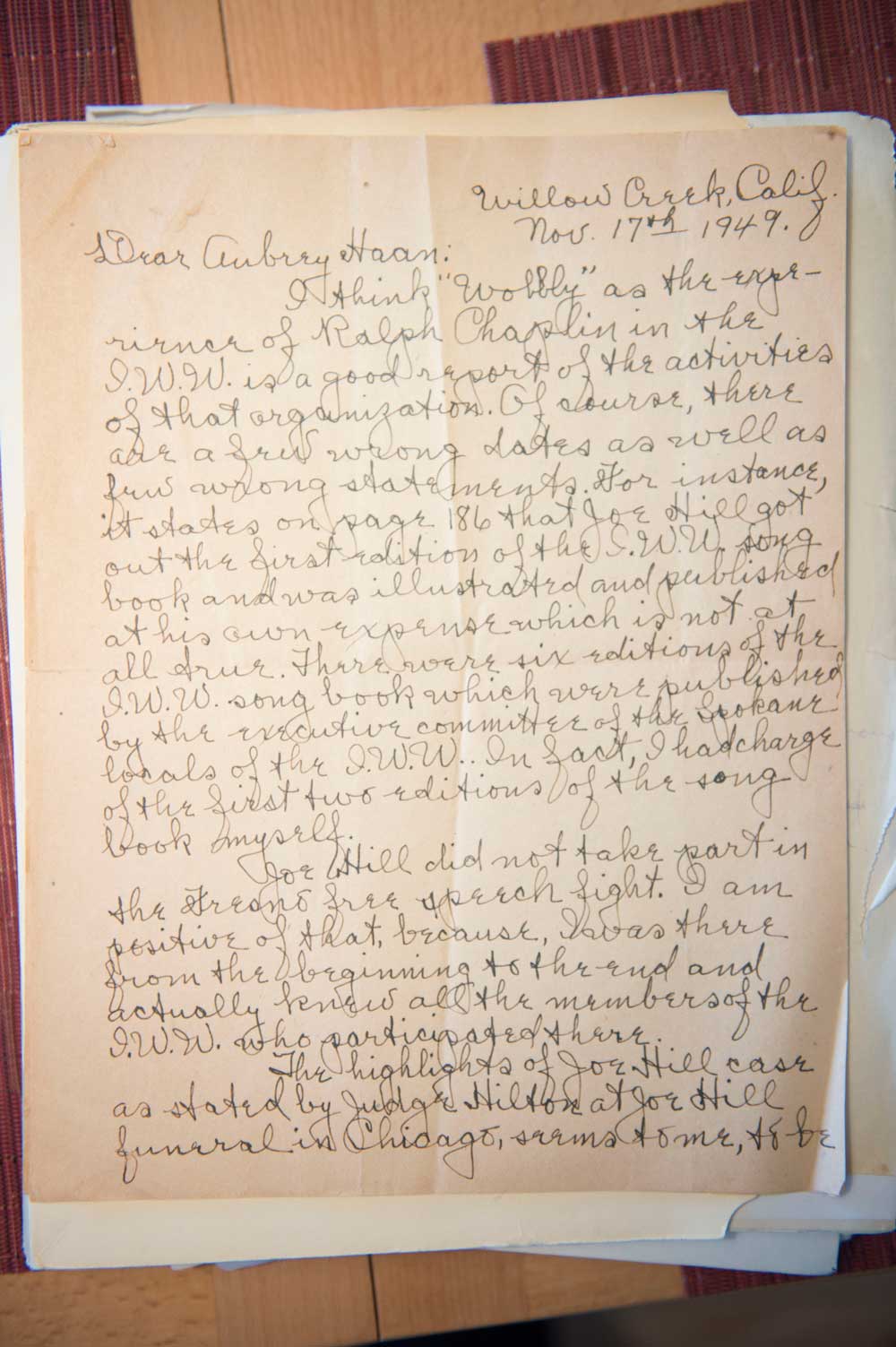
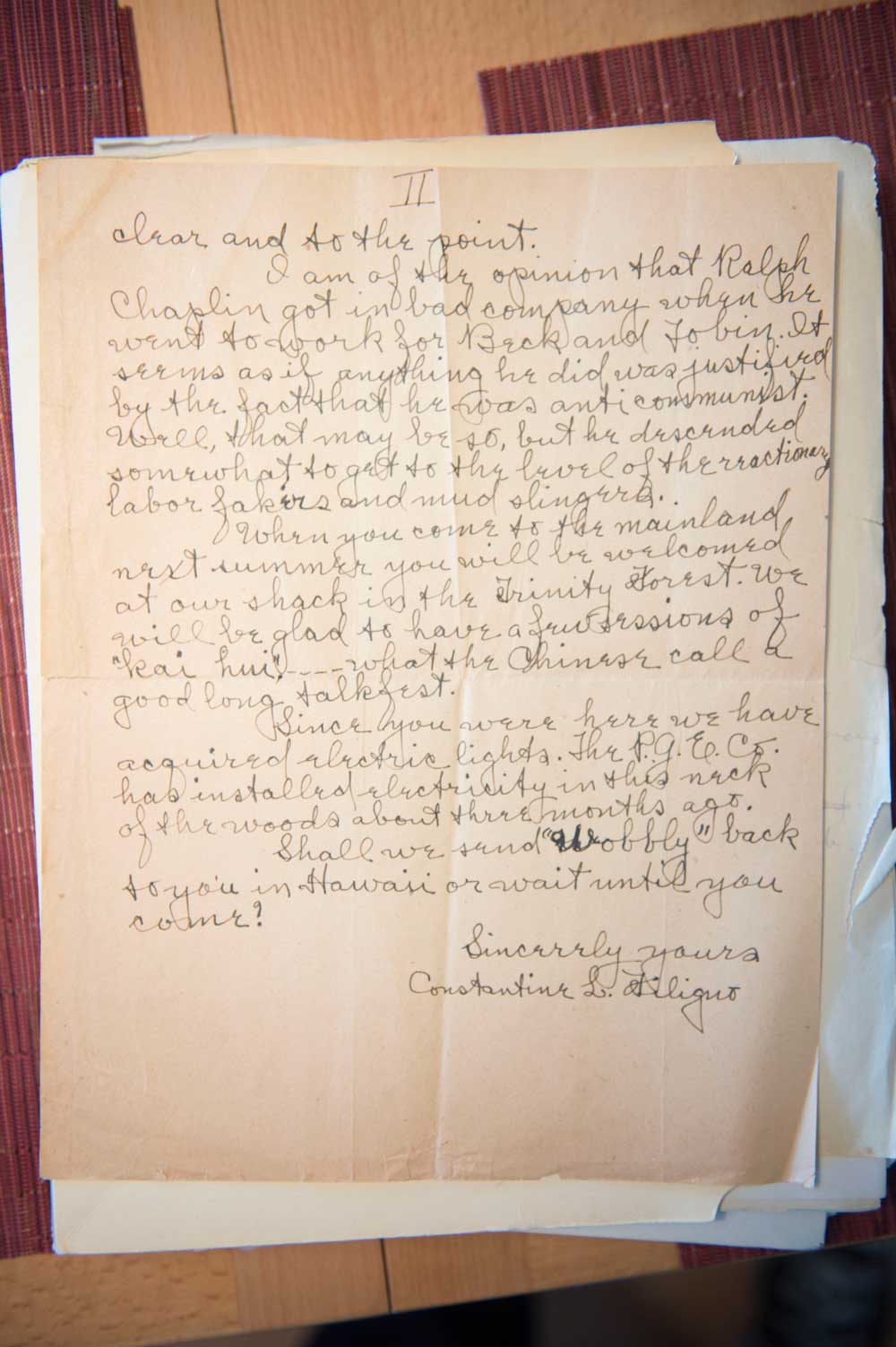
Photo by Jeremy Harmon, The Salt Lake Tribune
Constantine Filigno
Writing to Aubrey Haan on July 1, 1949, Constantine Filigno questions Hilda Erickson's claim that Joe Hill told her he had been shot by Otto Appelquist.
Willow Creek, Calif.
July 1st 1949
Dear Mr. Haan:
In regard to the story of Hilda that she was “the woman in the case,” this is what occurred to me. If she was the woman? Why did she keep silent all through the trial? Why she let Joe be executed when her story could have saved him? She has a heap of explanation to do.
If she is not “the woman in the case,” then it would take at least fifty Zulu psychologists to comb her brain straight.
We were pleased to hear from you and hope to have some more of the chats that run into the night.
Sincerely,
Constantine
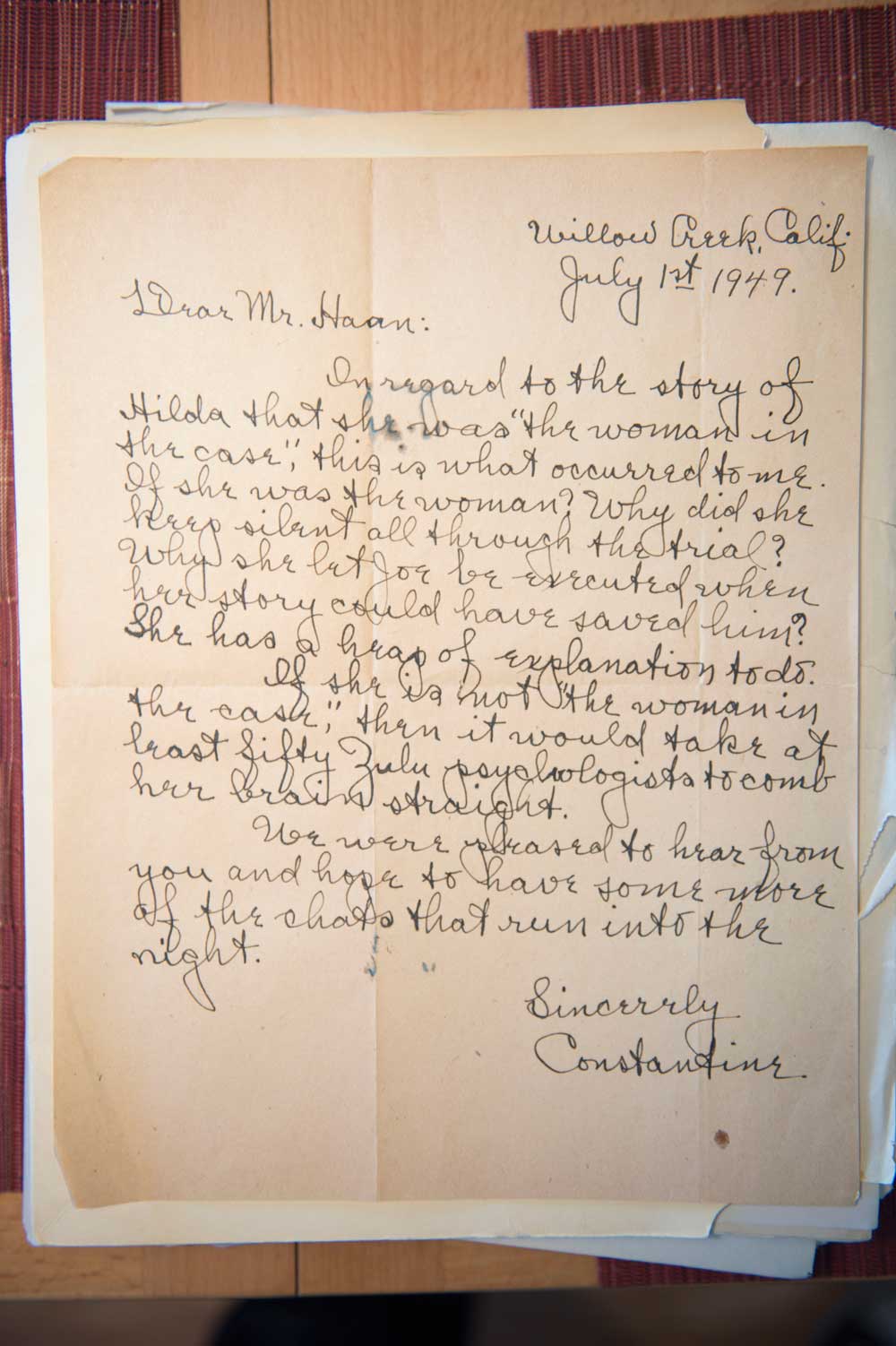
Photo by Jeremy Harmon, The Salt Lake Tribune
Alexander MacKay
In this letter, Alexander MacKay, a longtime member of the IWW, tells researcher Aubrey Haan about his relationship with Joe Hill. He met Hill and Otto Appelquist in 1913 in San Pedro. Hill would leave San Pedro and come to Salt Lake City a few months later.
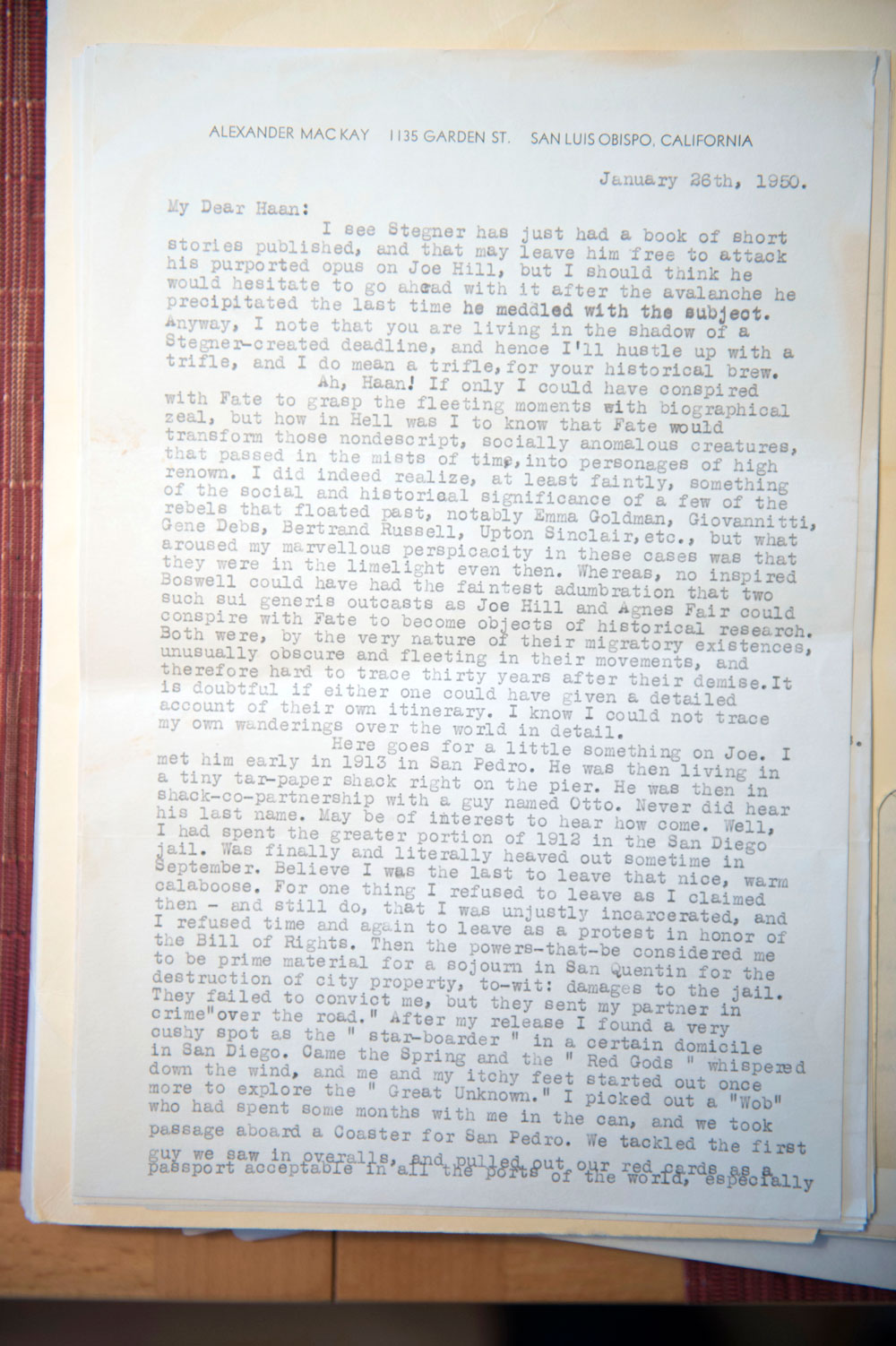
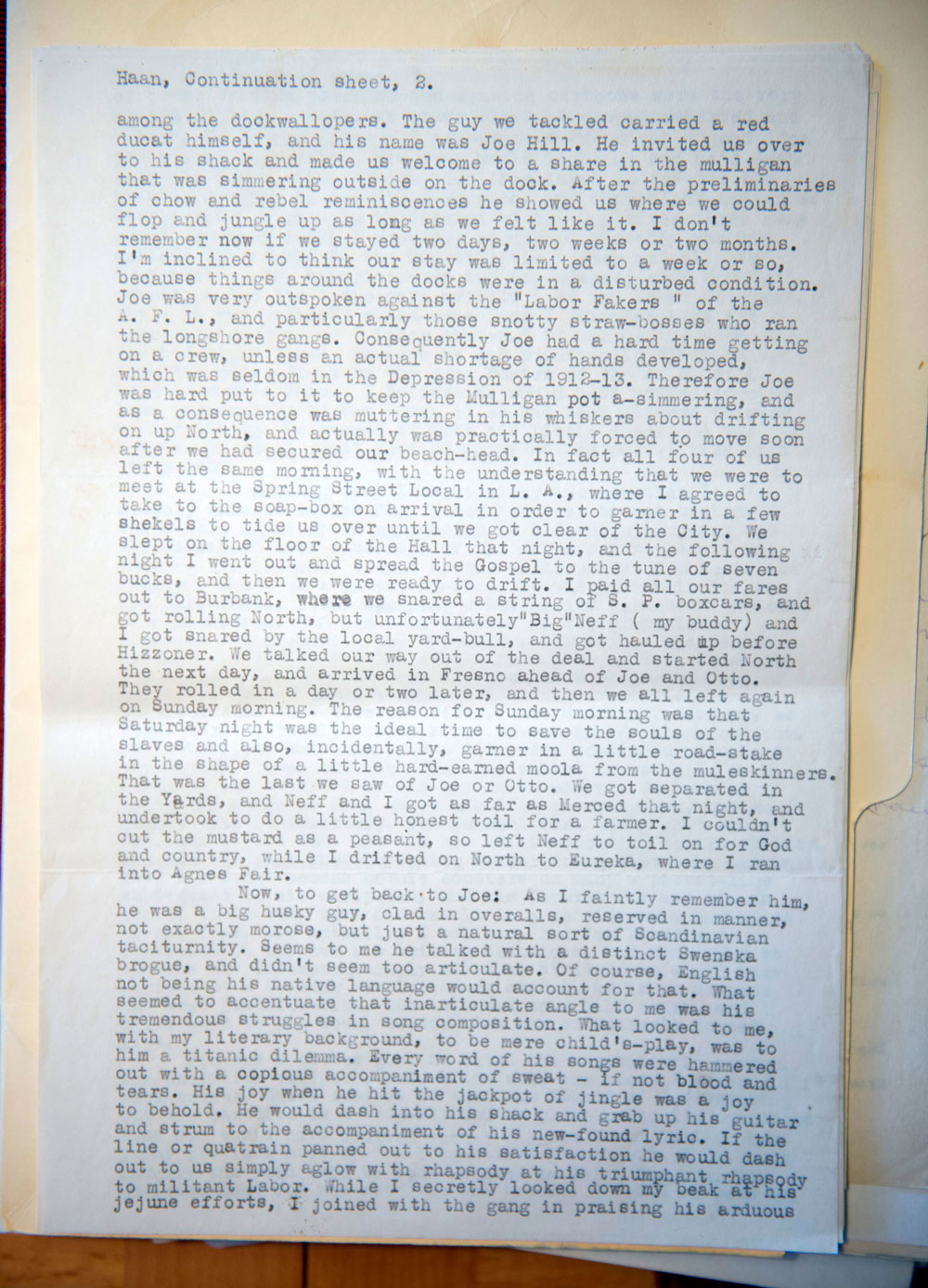
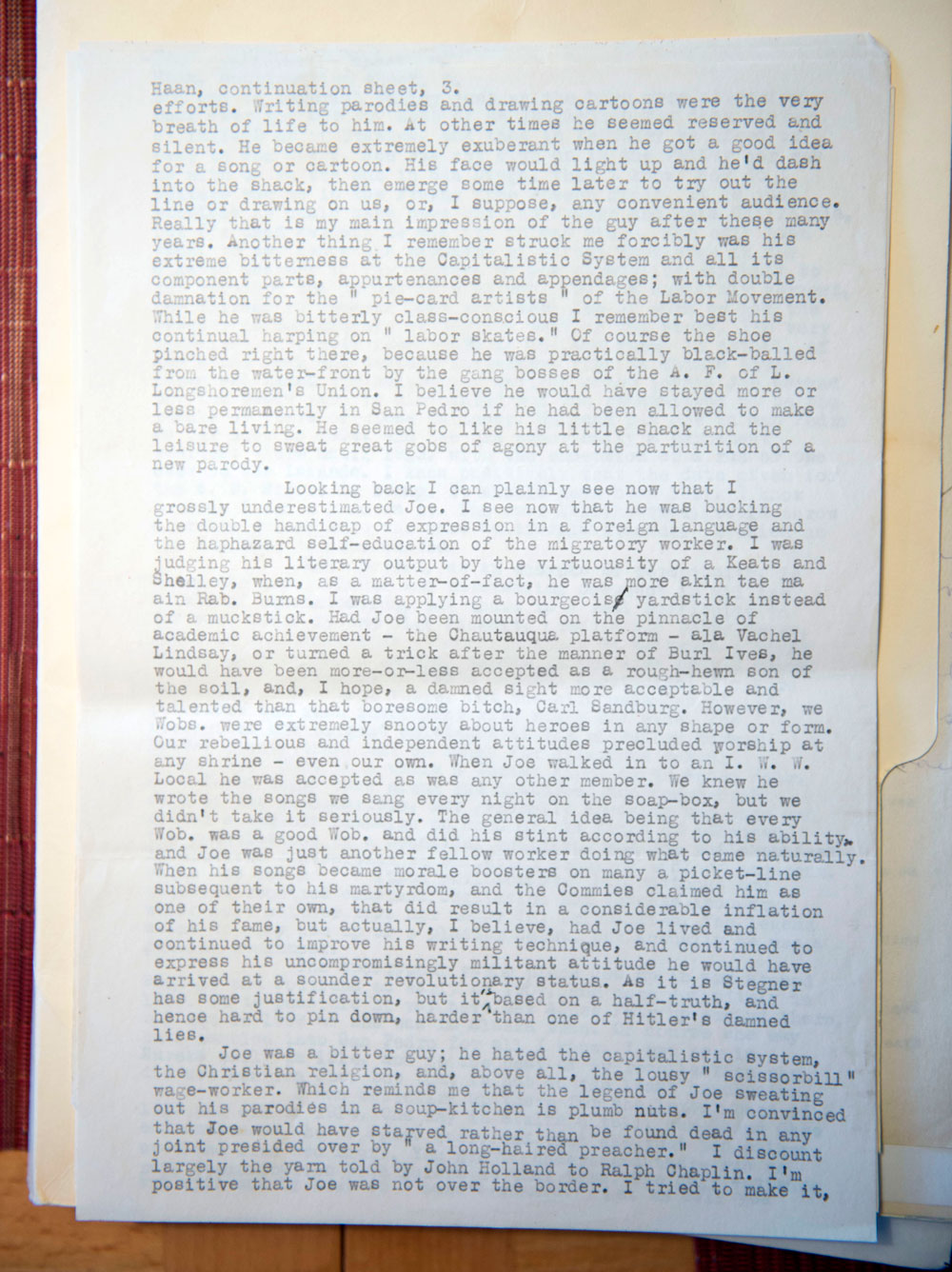
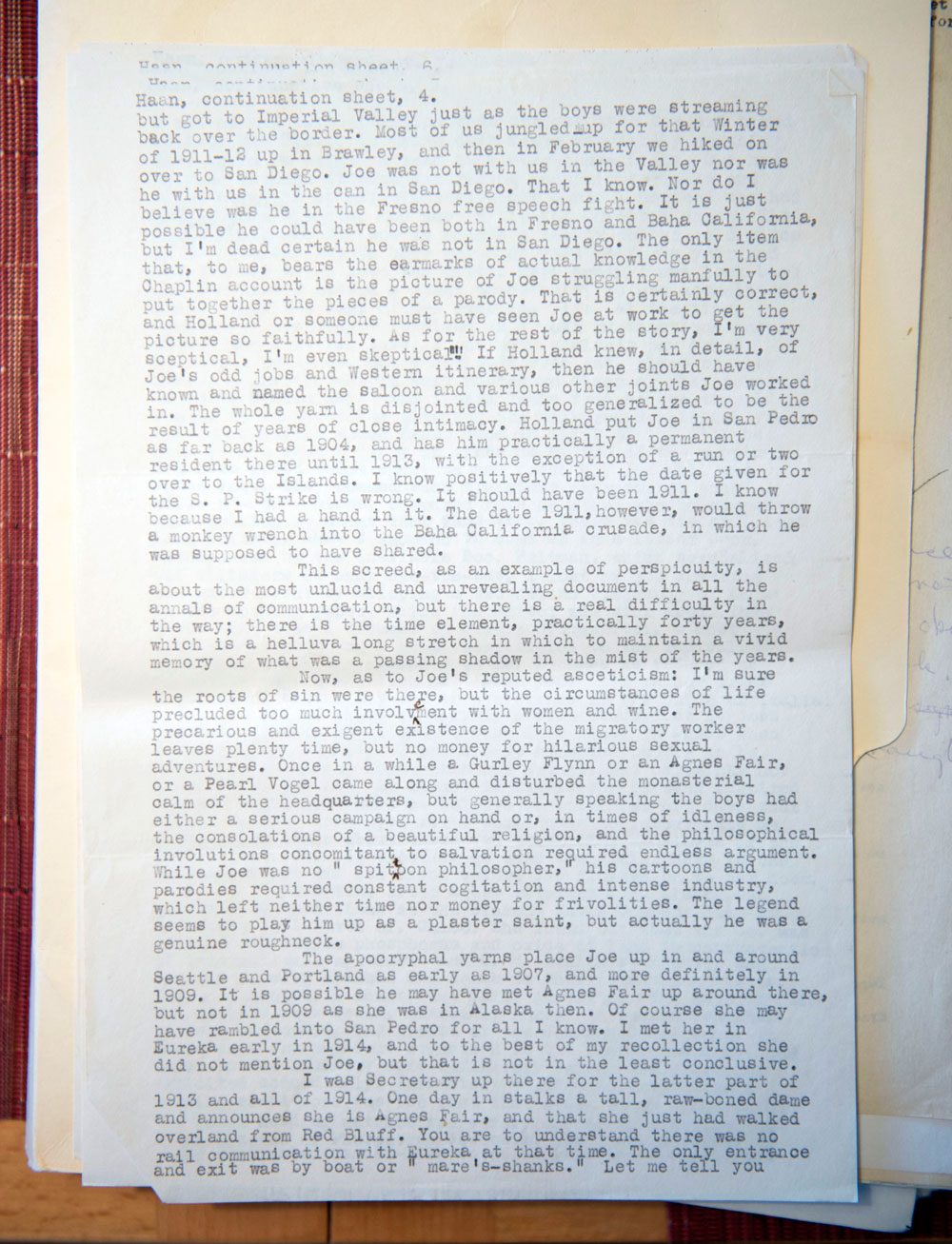
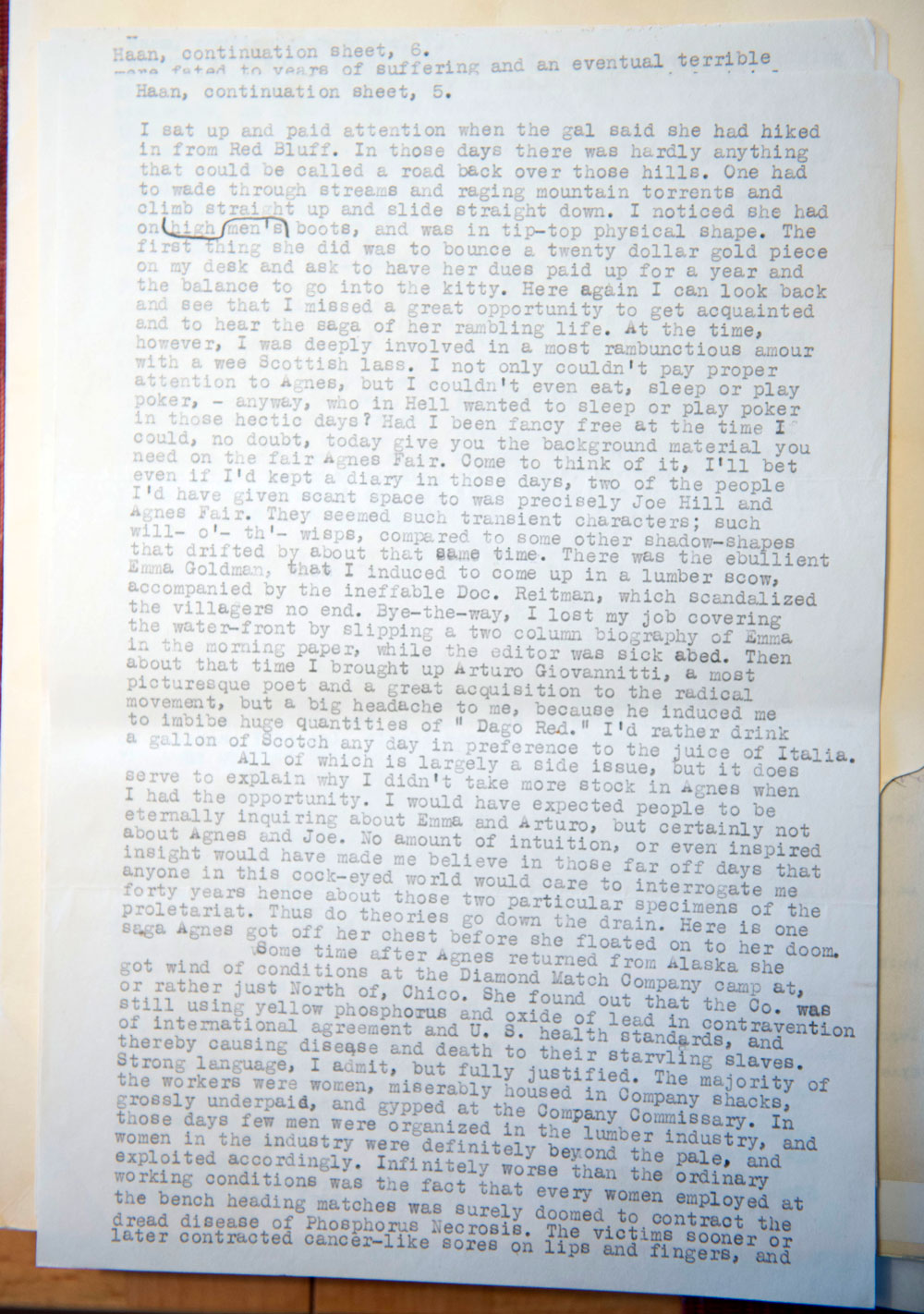
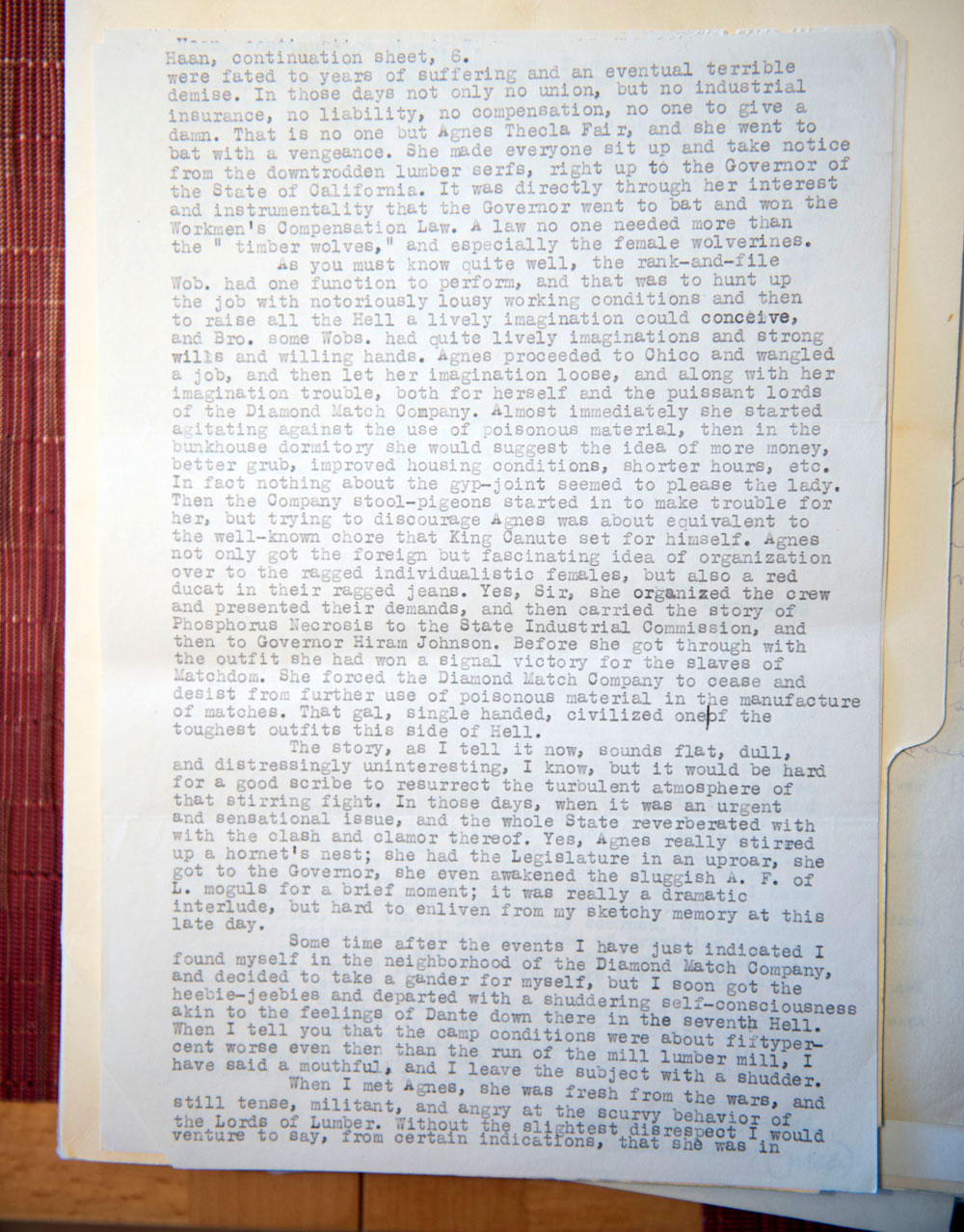
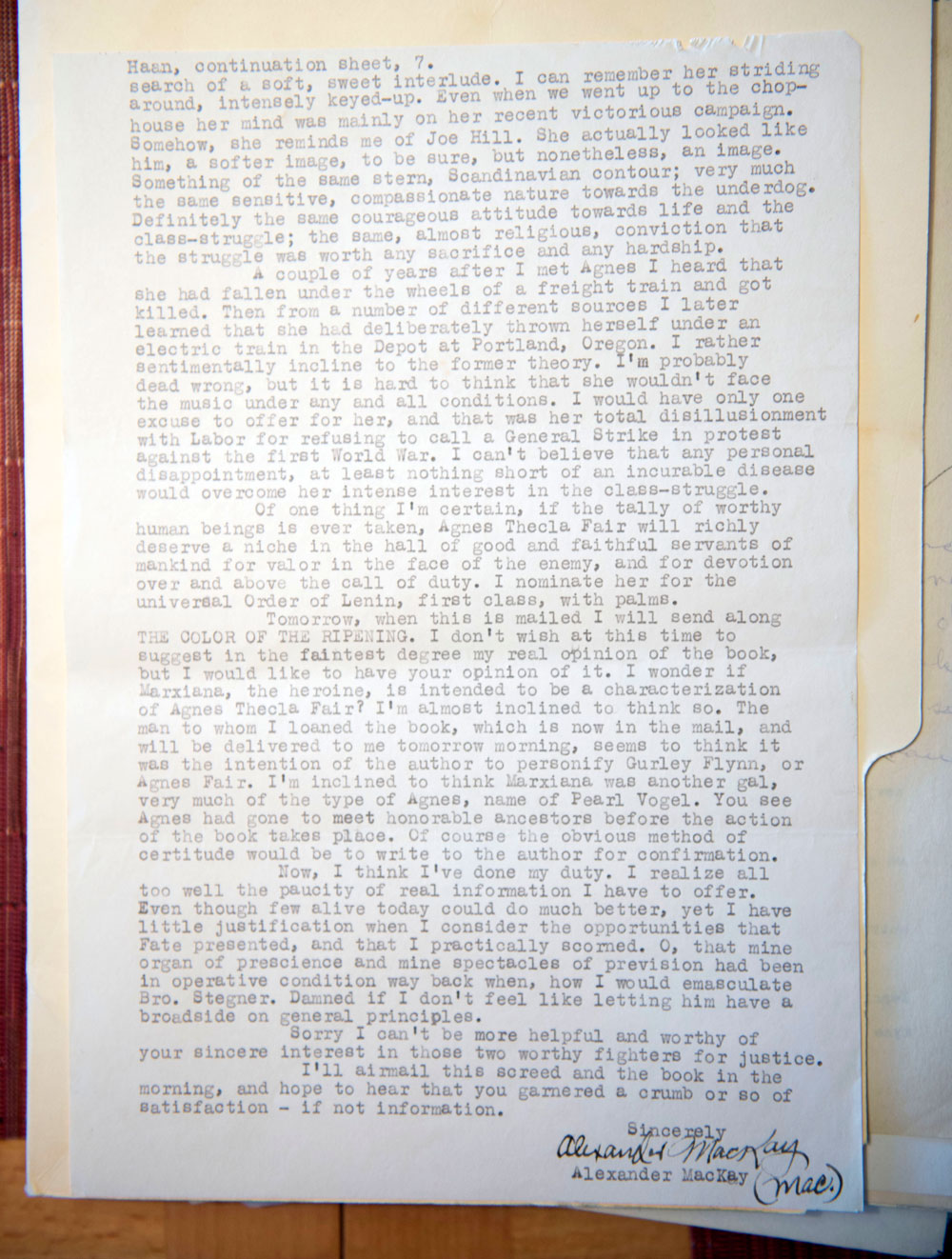
Photo by Jeremy Harmon, The Salt Lake Tribune
Letter to Hilda Erickson
In this letter, Aubrey Haan lists several questions for Hilda Erickson. He asks whether Joe Hill insisted that she not disclose what Hill told her about his gunshot wound. He also asks why her uncle, Swen Erickson, was apparently contending that Hill was guilty of John Morrison's murder.
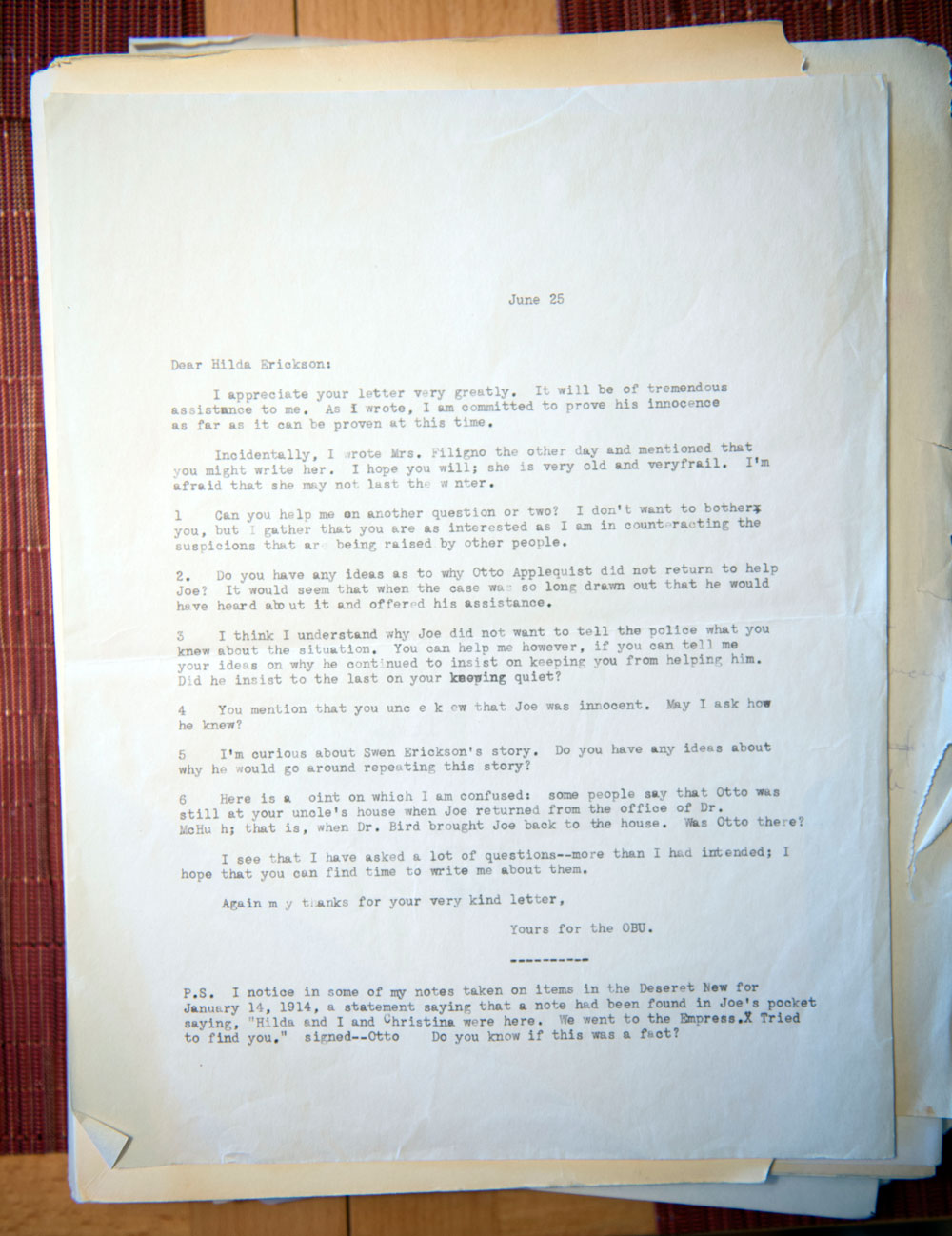
Photo by Jeremy Harmon, The Salt Lake Tribune
Joe Hill's genealogy
Swedish biographer Ture Nerman wrote the first biography of Joe Hill to appear in Swedish, published in 1951. In this letter, Nerman tells Haan about Hill's genealogy. Interestingly, Nerman is wrong about the names of Hill's father and brothers, but he is correct about the name of Hill's sister.

Photo by Jeremy Harmon, The Salt Lake Tribune
Elizabeth Gurley-Flynn's article
This transcription of Elizabeth Gurley-Flynn's article about meeting with Joe Hill while he is in prison in Salt Lake City is part of Aubrey Haan's research notes.
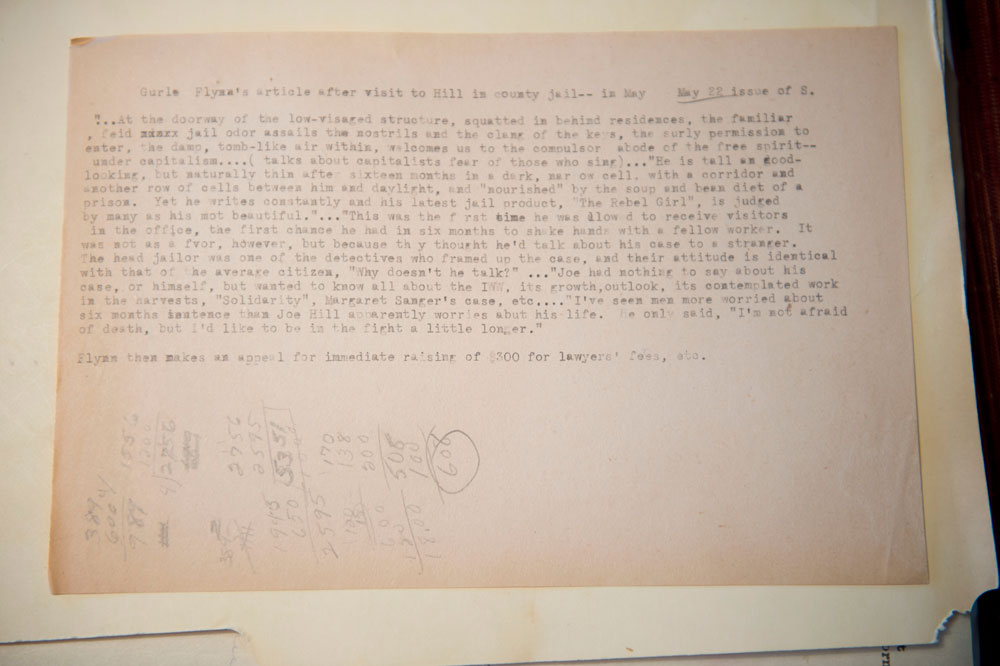
Photo by Jeremy Harmon, The Salt Lake Tribune
Biographical sketch of Joe Hill
This biographical sketch of Joe Hill is part of Aubrey Haan's research collection.
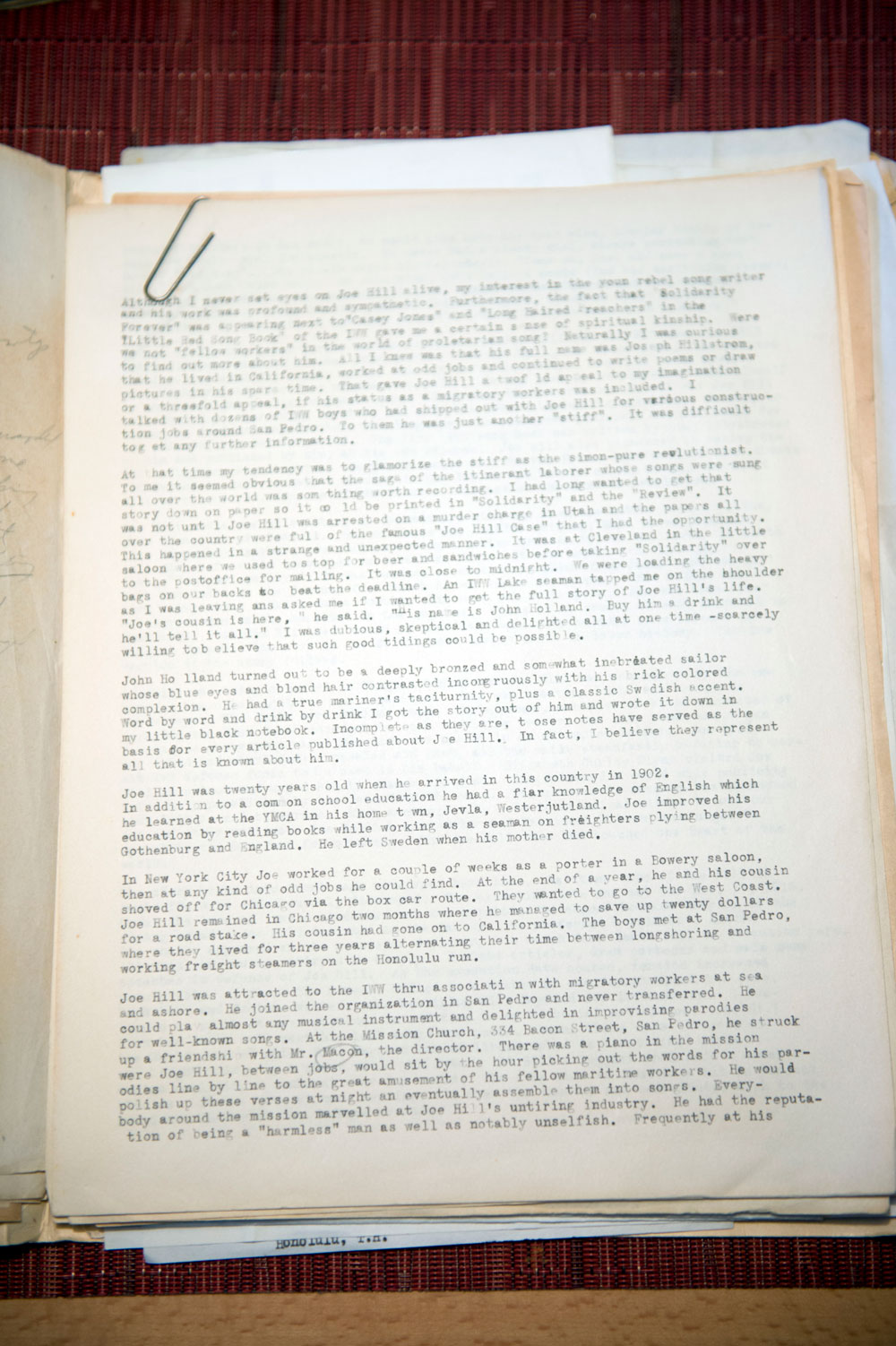
Photo by Jeremy Harmon, The Salt Lake Tribune
Joe Hill letter
This copy of a letter that Joe Hill wrote to Solidarity in November, 1914, is part of Aubrey Haan's research.
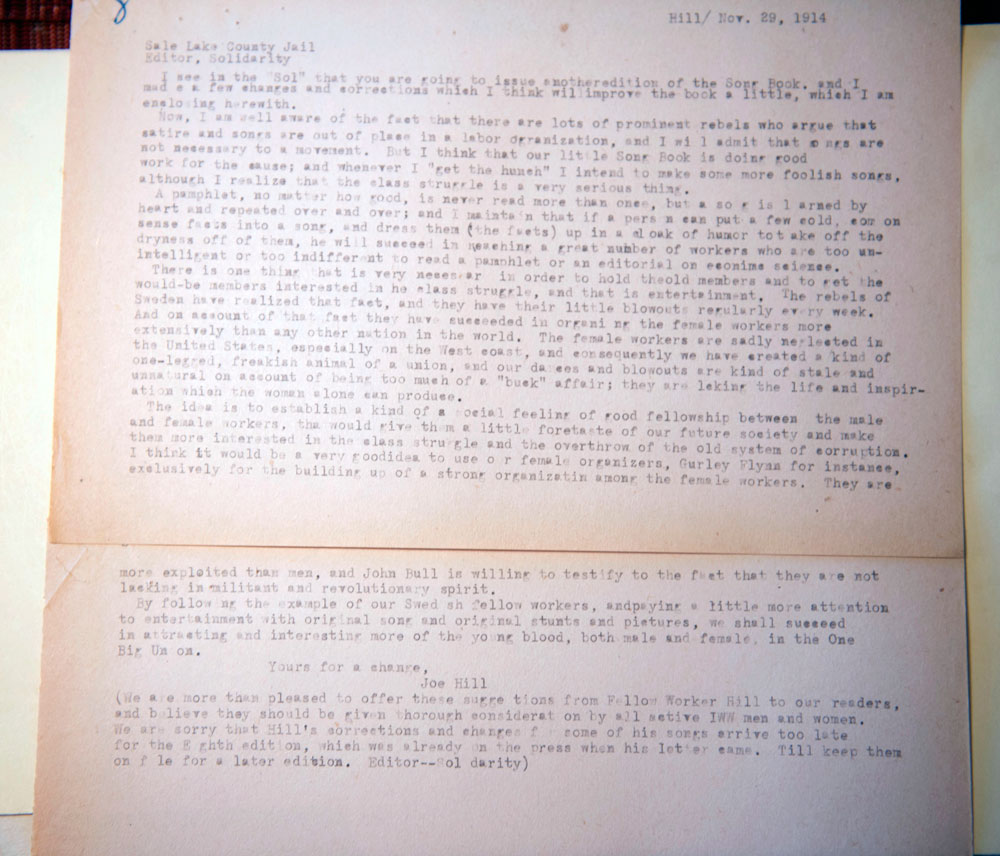
Photo by Jeremy Harmon, The Salt Lake Tribune
Letter from IWW member Fred Thompson
This letter from prominent Industrial Workers of the World member Fred Thompson informs Aubrey Haan that he is not the only author working on material about Joe Hill. Wallace Stegner was writing a book, as were others. Thompson himself wrote a pamphlet about Hill's life that was distributed by IWW branches.
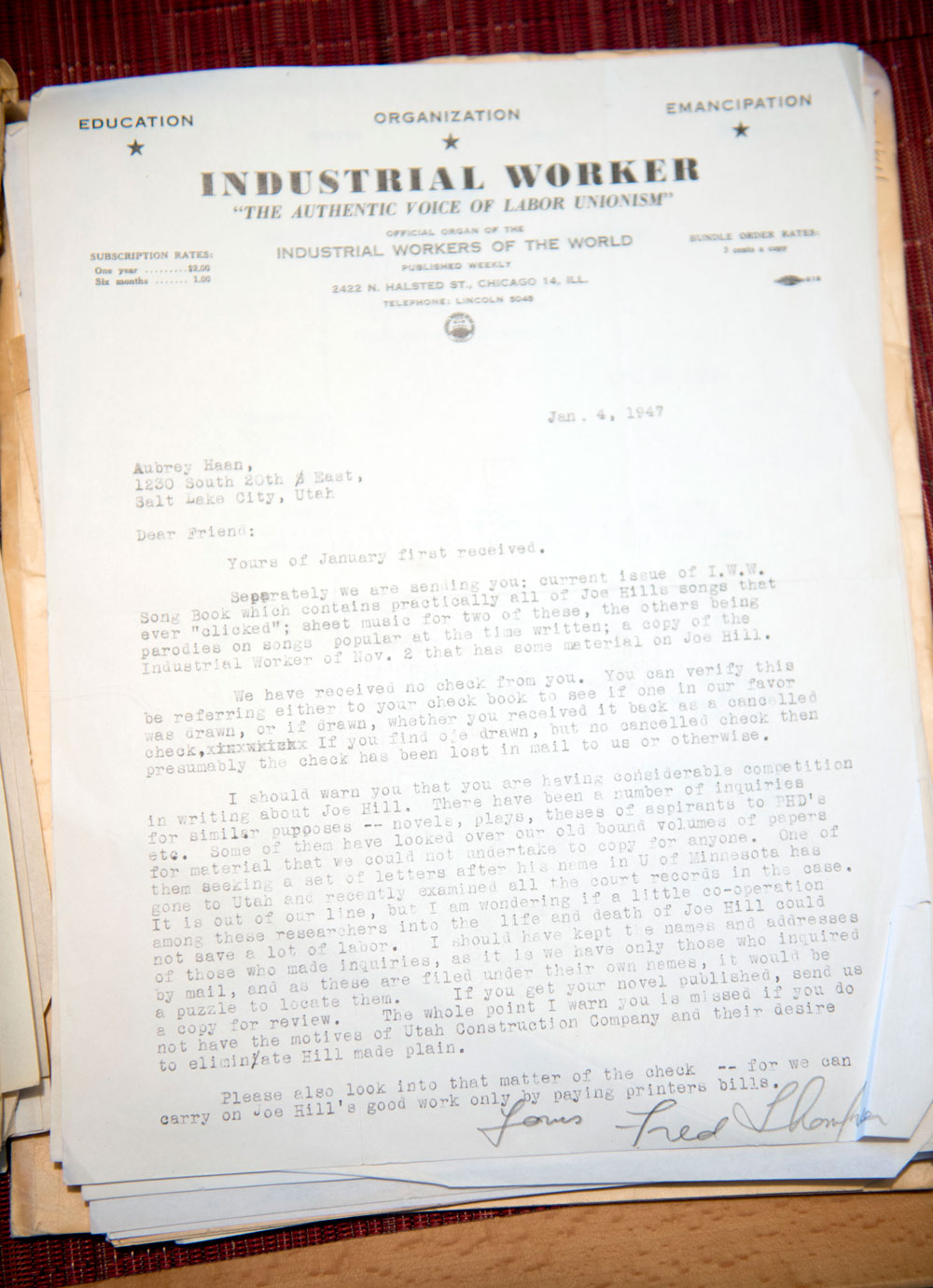
Photo by Jeremy Harmon, The Salt Lake Tribune
Head of SLC branch of IWW
This account written by Ed Rowan, head of the Salt Lake City branch of the IWW at the time of Joe Hill's execution, is from the papers of researcher Aubrey Haan. Haan was working on a novel about Hill's life when he was compiling these notes.
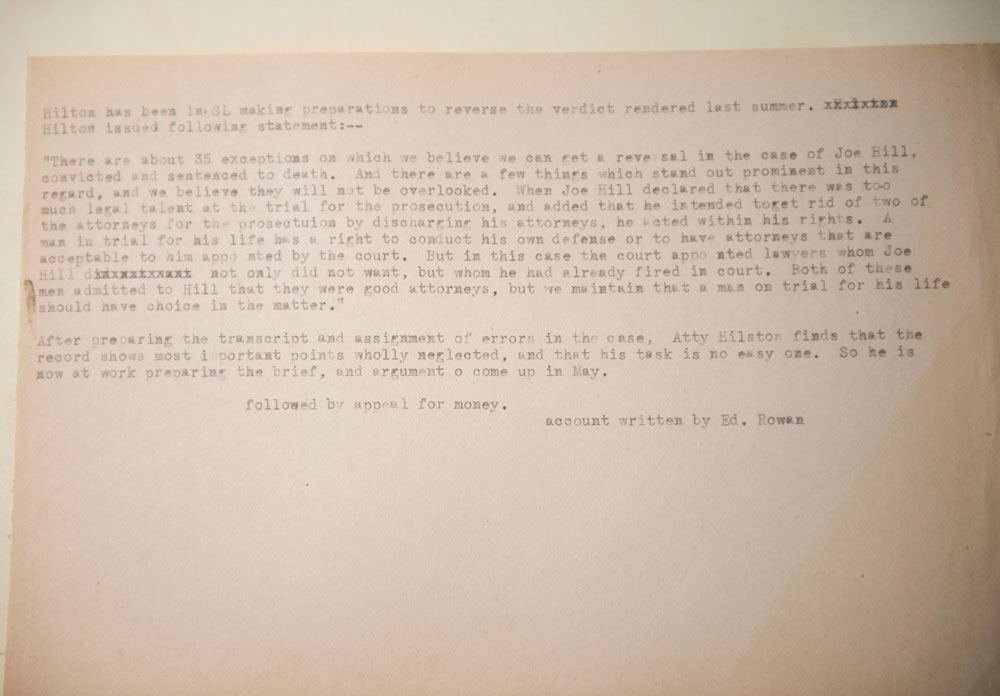
Photo by Jeremy Harmon, The Salt Lake Tribune
Interview with Alfred Sorenson
These are notes Aubrey Haan wrote about an interview with Alfred Sorenson, a Salt Lake City Socialist who had tried to help with Joe Hill's defense. Sorenson talks about a possible, and previously unreported, motive for the murder of an Industrial Workers of the World member in 1915. Sorenson also describes a conversation with Gov. William Spry, saying the governor was frustrated with the challenge of calming the state, and his doubts about Dr. Frank McHugh's new claim that Hill had confessed to McHugh on the night of the Morrison murders.
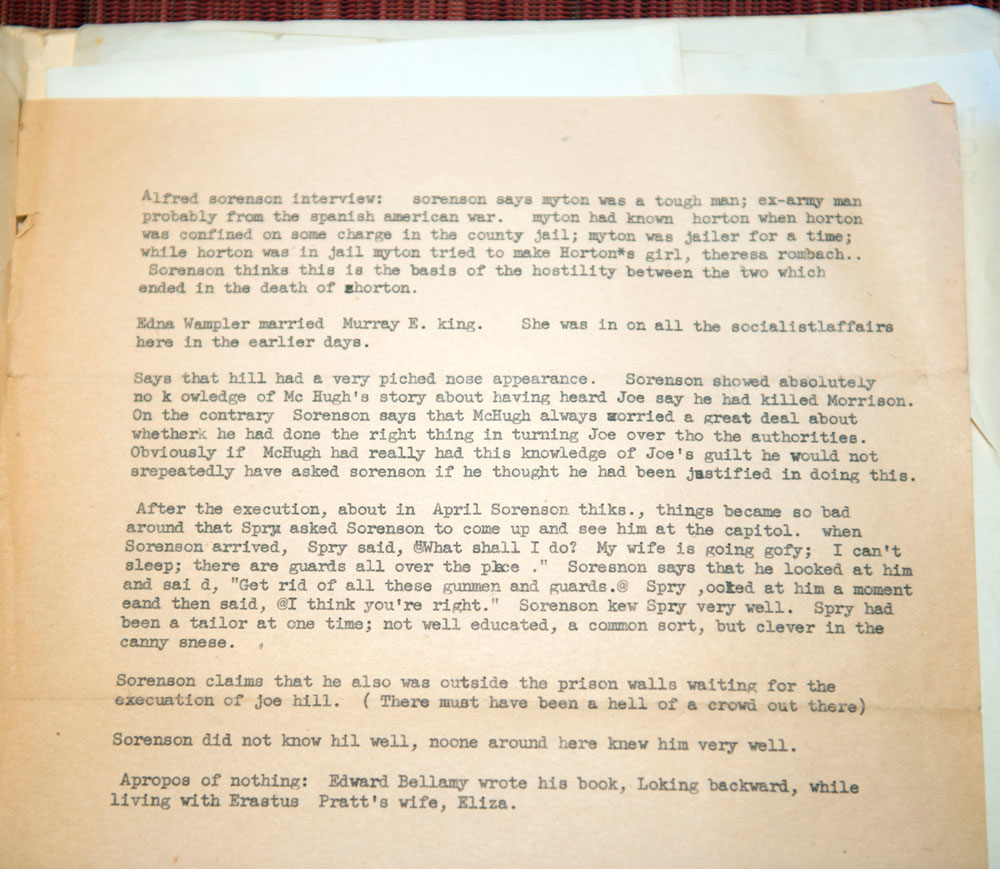
Photo by Jeremy Harmon, The Salt Lake Tribune
Tomorrow magazine
In this letter from Tomorrow magazine, an editor tells Aubrey Haan he doesn't see how Haan can boil down his extensive information about Joe Hill into one article that retains the drama of the story.
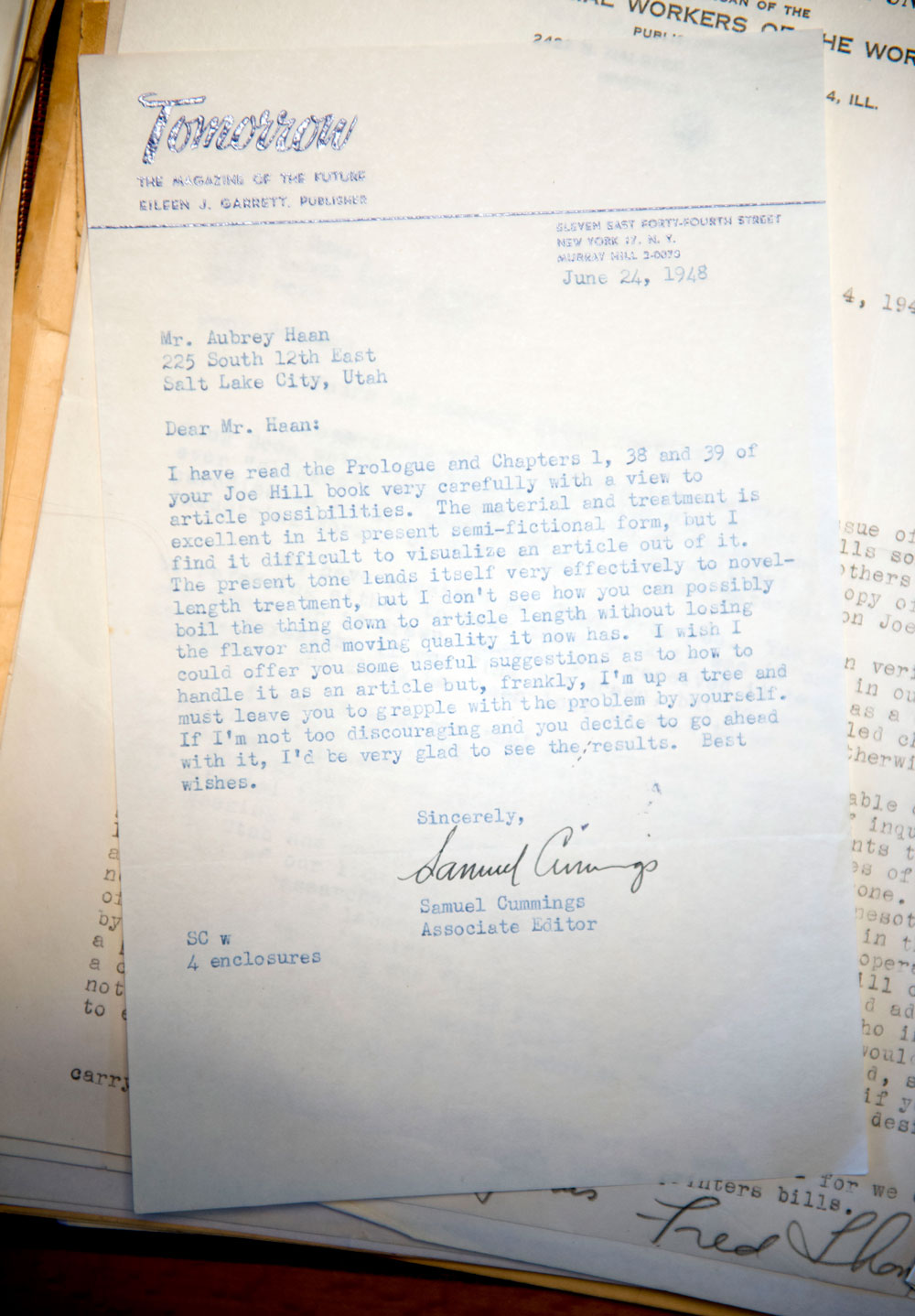
Photo by Jeremy Harmon, The Salt Lake Tribune
Letter from publisher
In this letter from Jane Lawson of publisher Little, Brown and Company, she tells Aubrey Haan that she is excited to read his fictional account of Joe Hill's life.
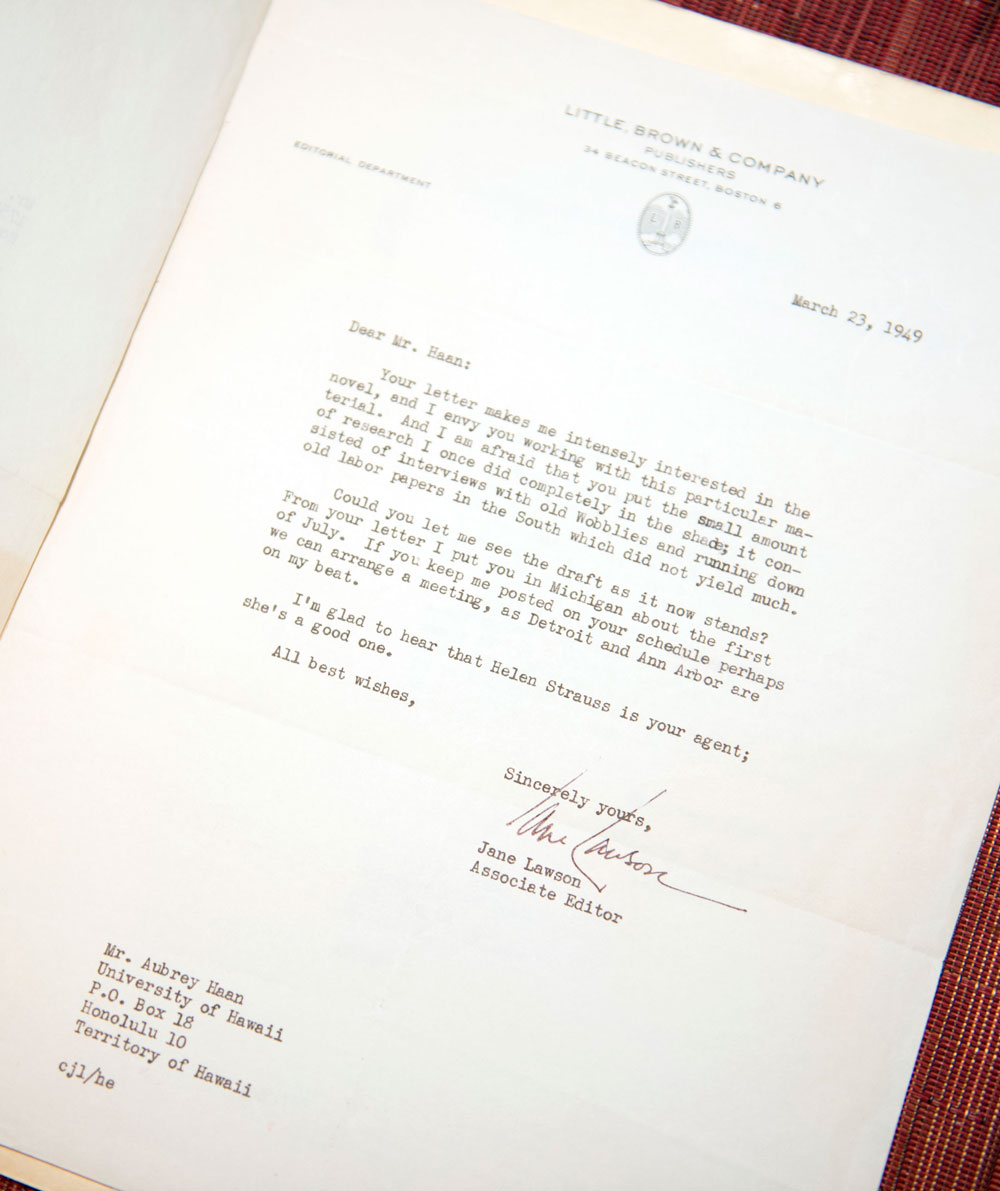
Photo by Jeremy Harmon, The Salt Lake Tribune
Haan's book a 'disappointment'
In this letter from Jane Lawson of publisher Little, Brown and Company, she tells agent Helen Strauss how disappointed she is in Aubrey Haan's book "Pie In The Sky."
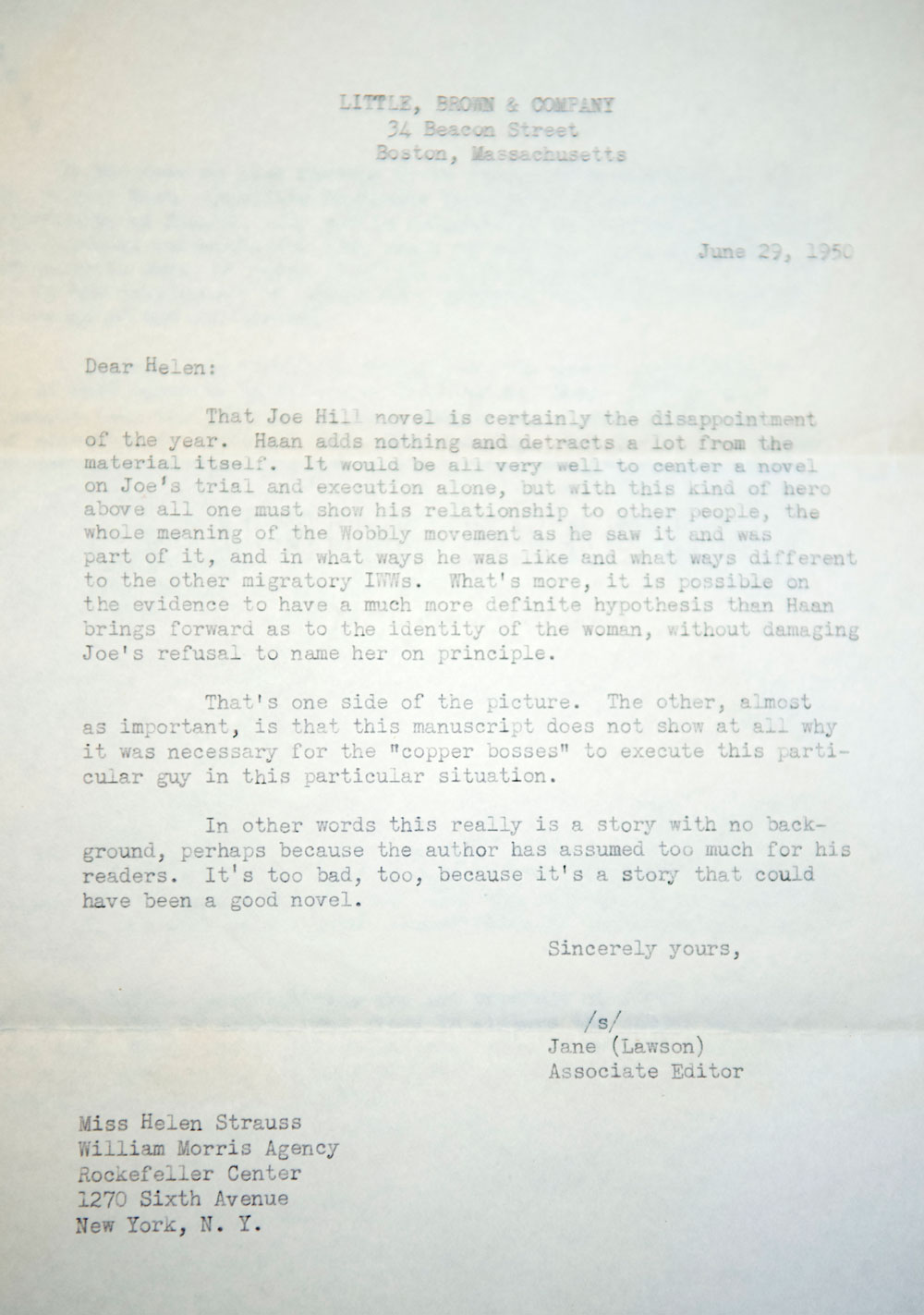
Photo by Jeremy Harmon, The Salt Lake Tribune
'Pie In The Sky'
These are pages from Aubrey Haan's manuscript for his unpublished book, "Pie In The Sky." The notes on the manuscript were made by his daughter, Mary Haan, after he asked her to edit the book.
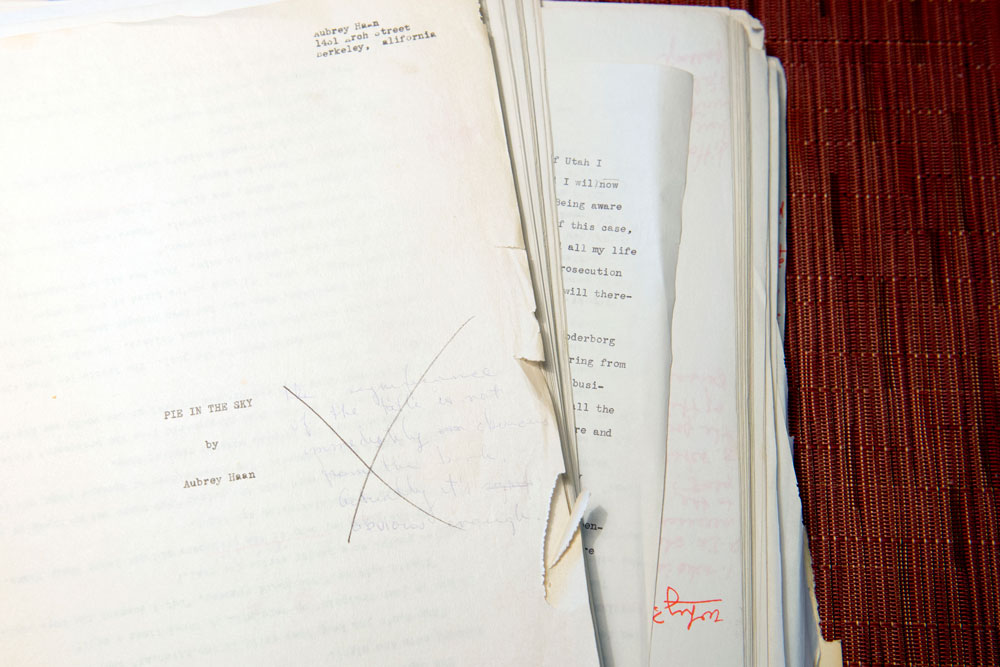
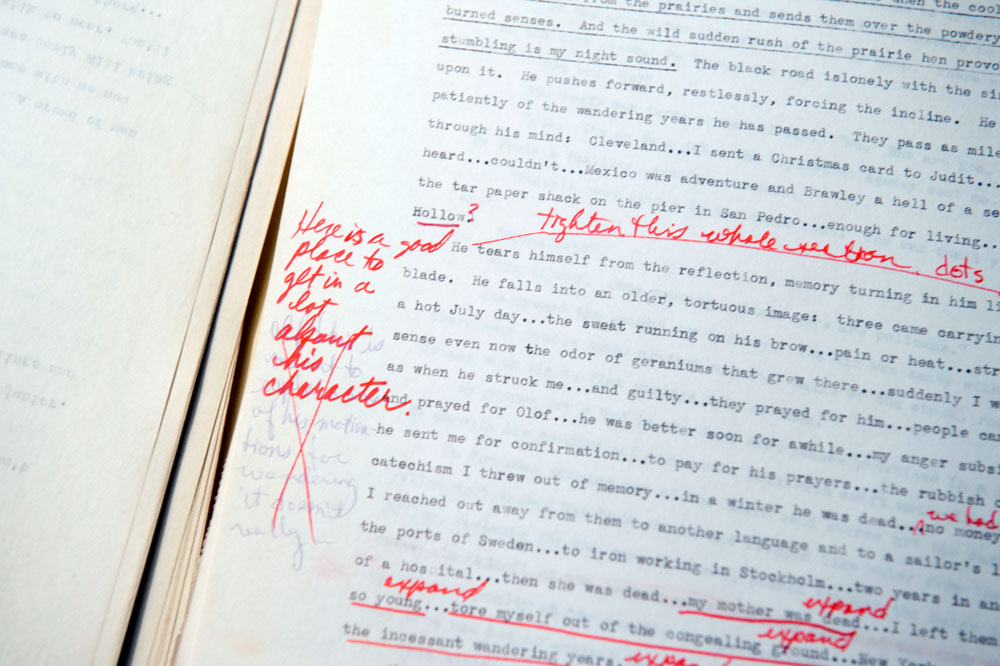
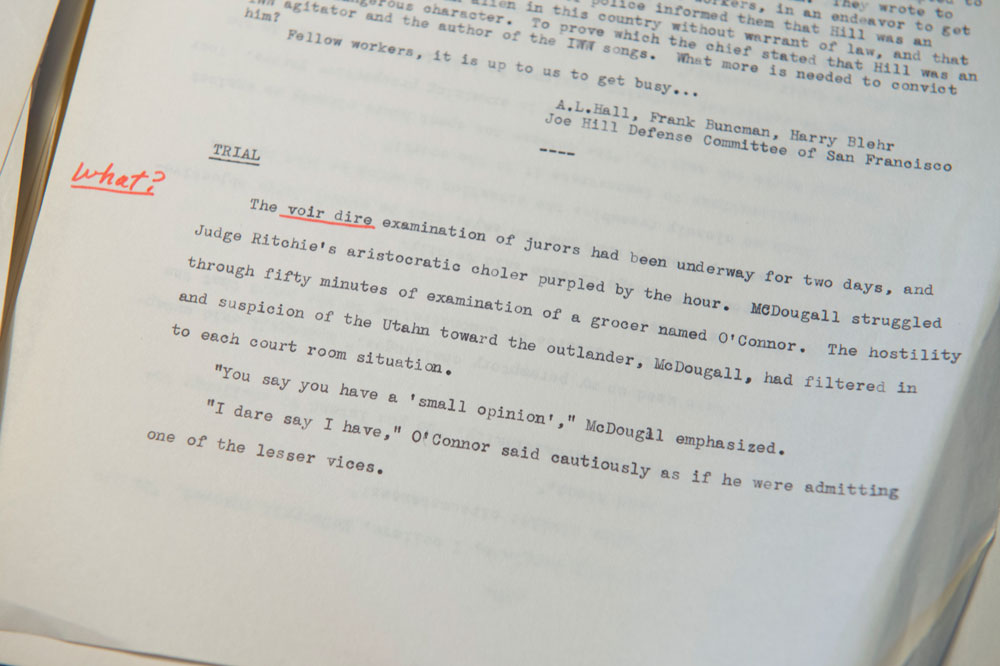
Photo by Jeremy Harmon, The Salt Lake Tribune



